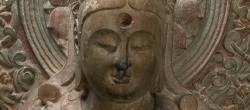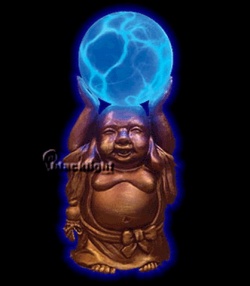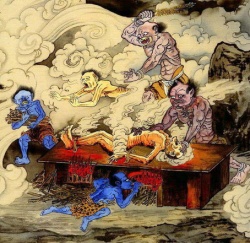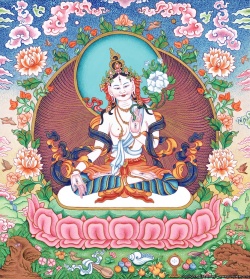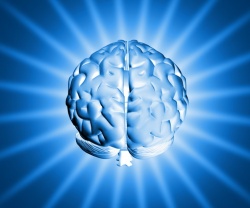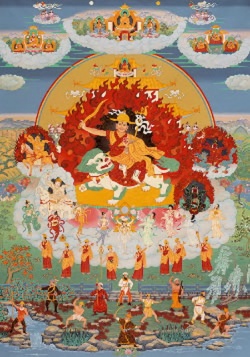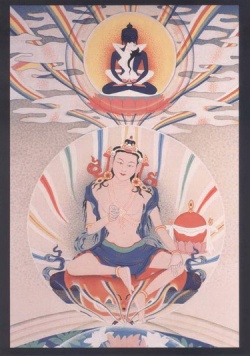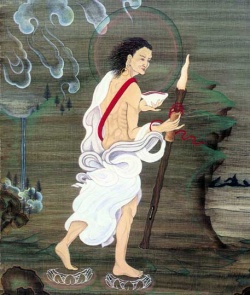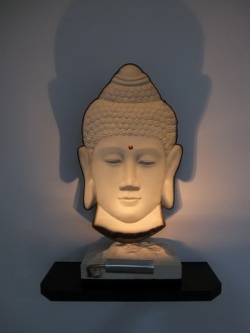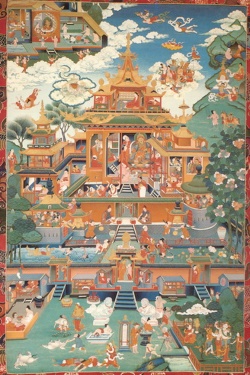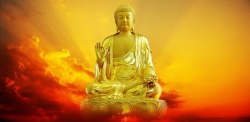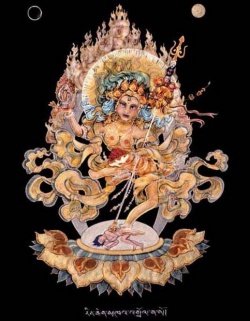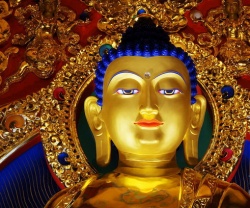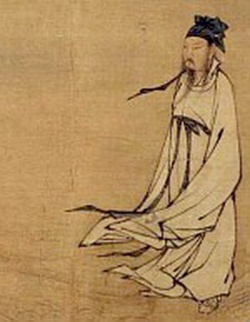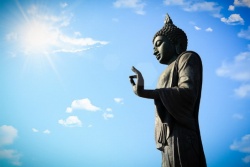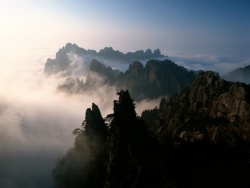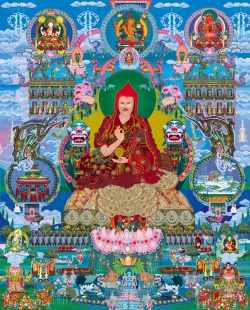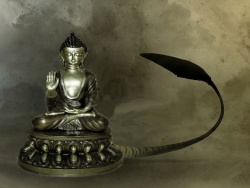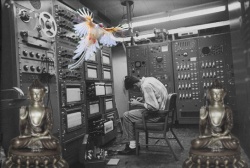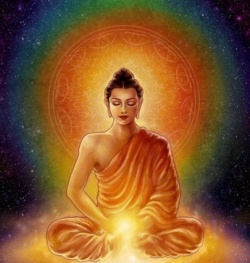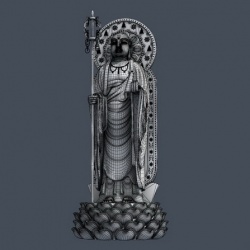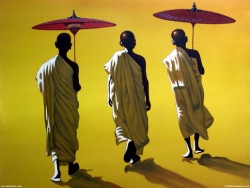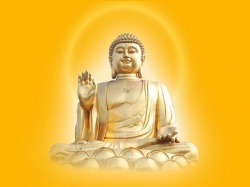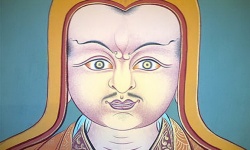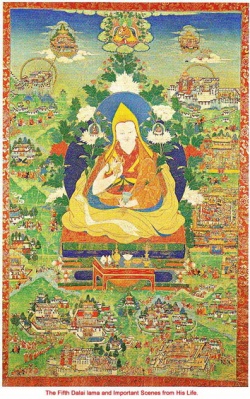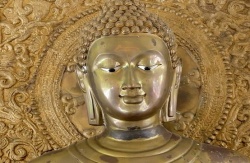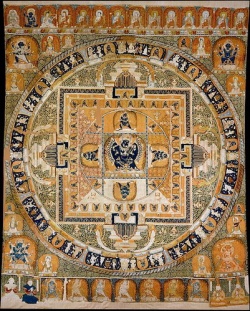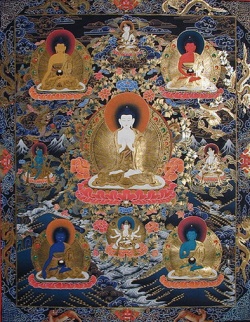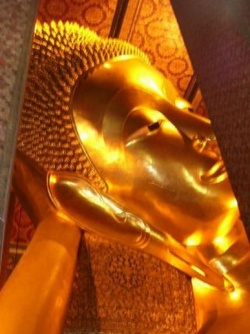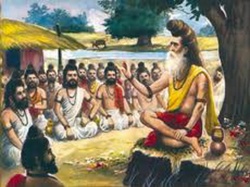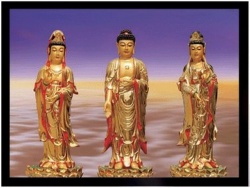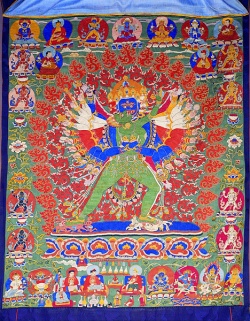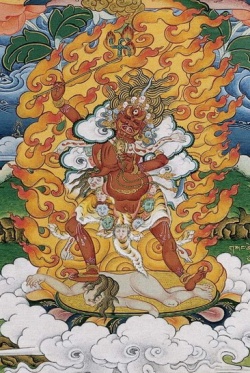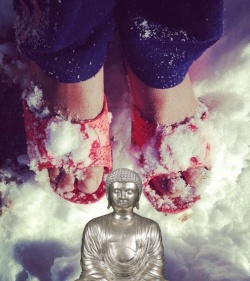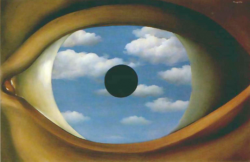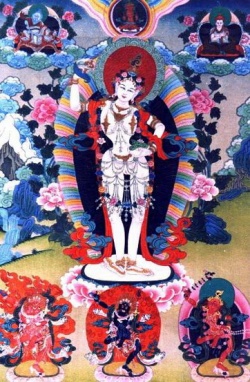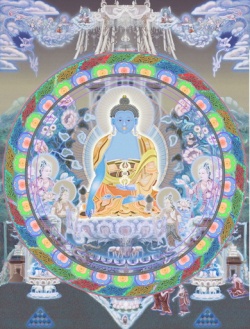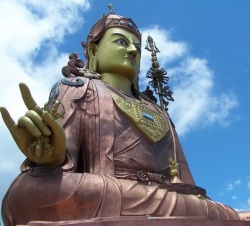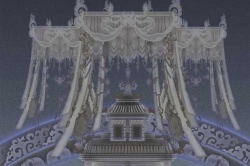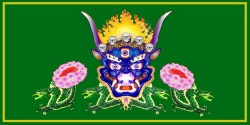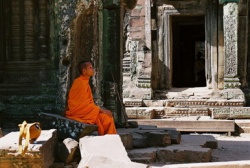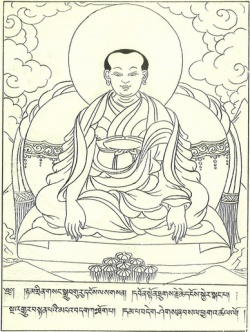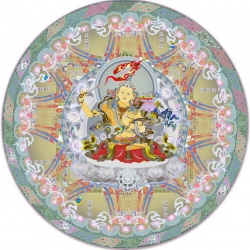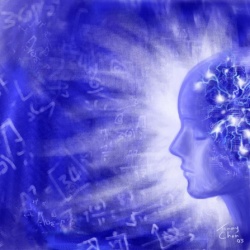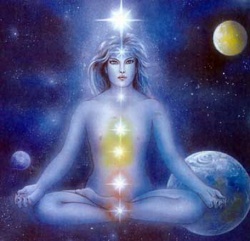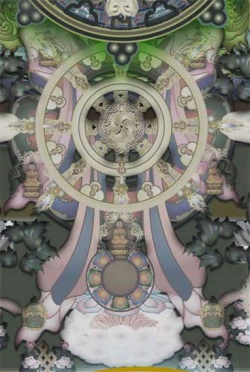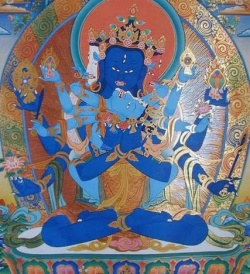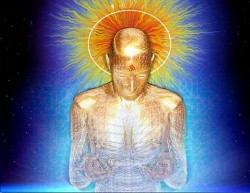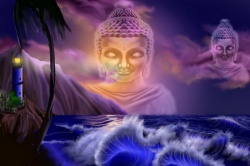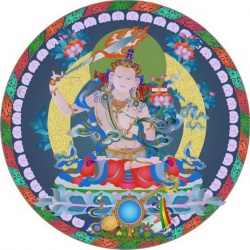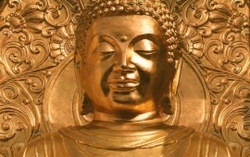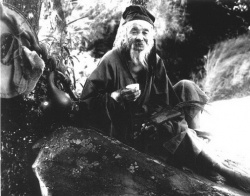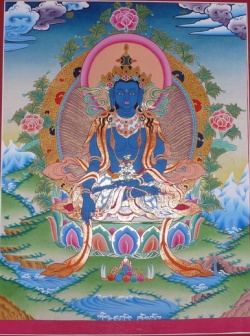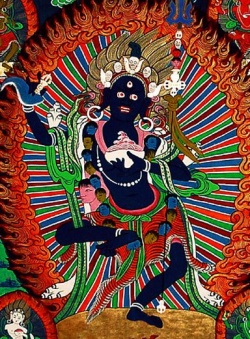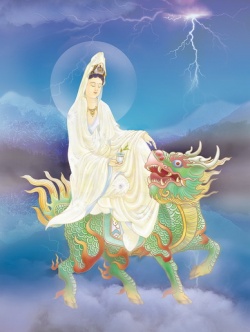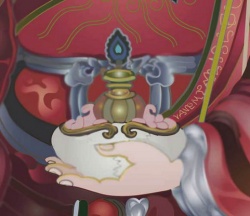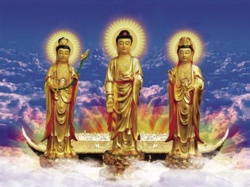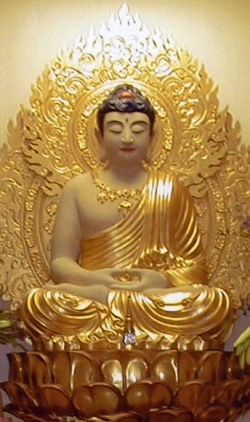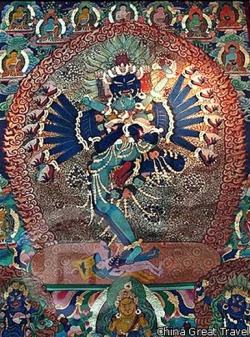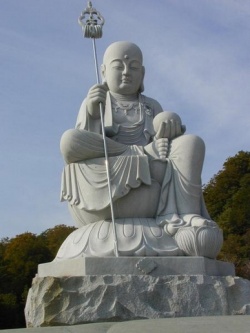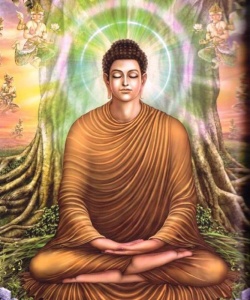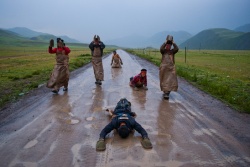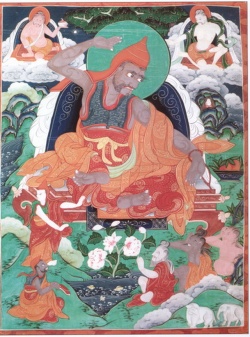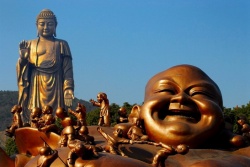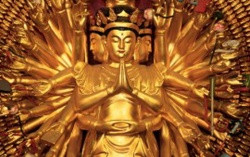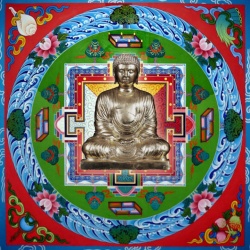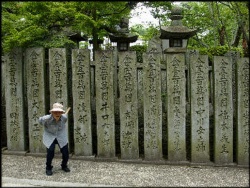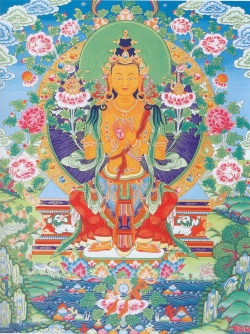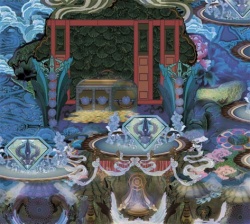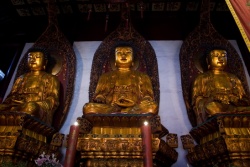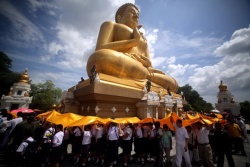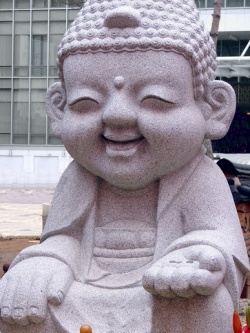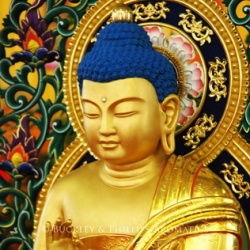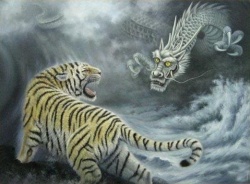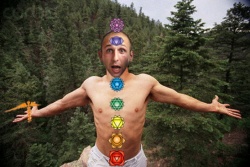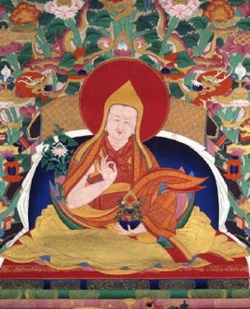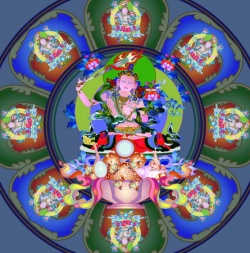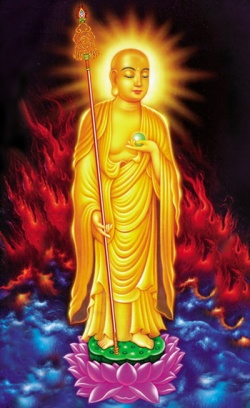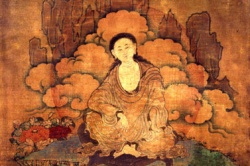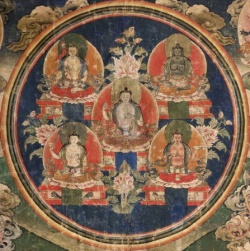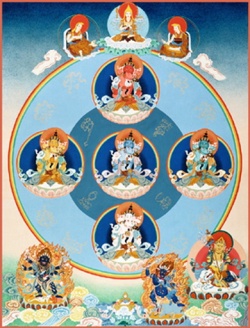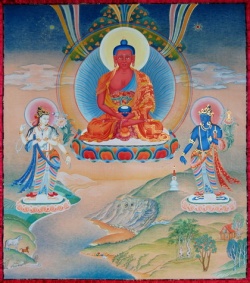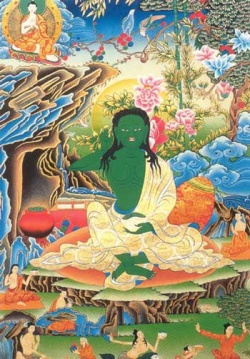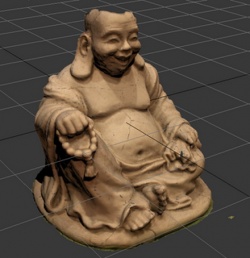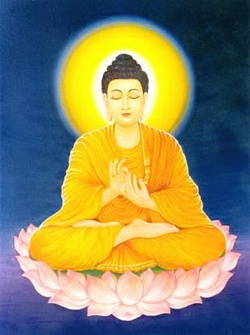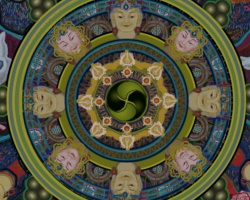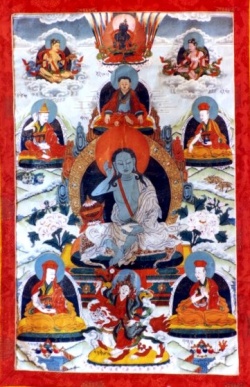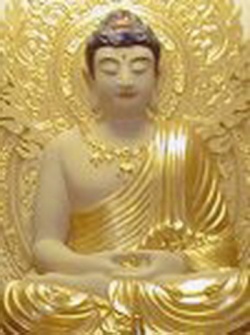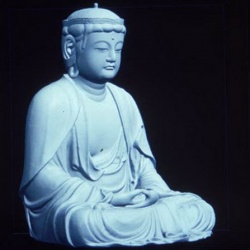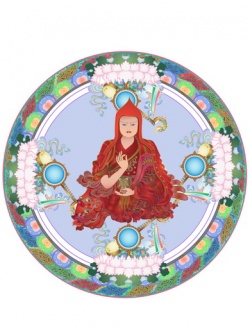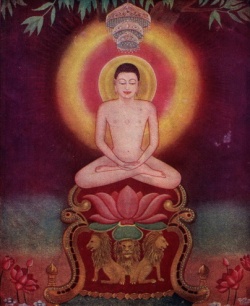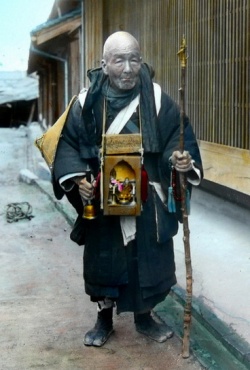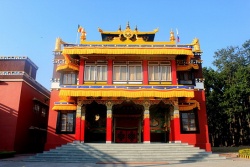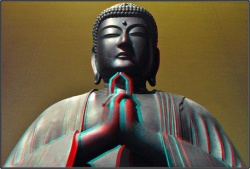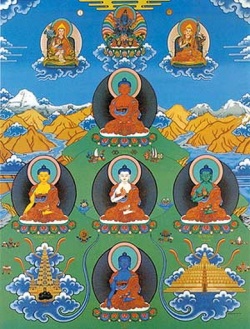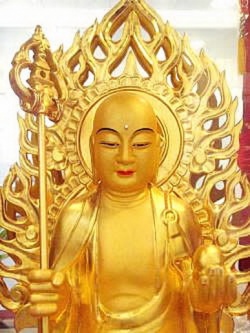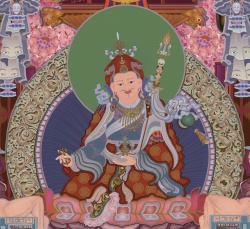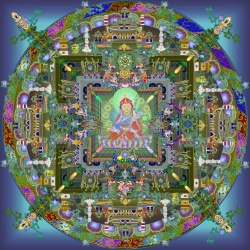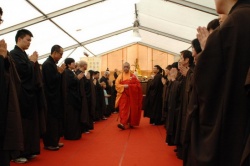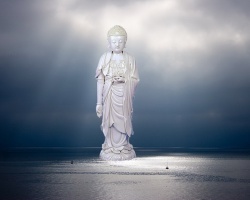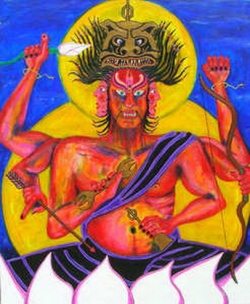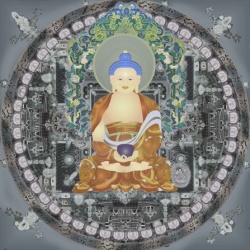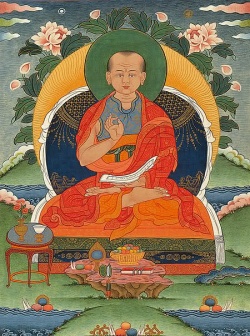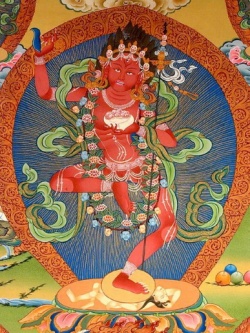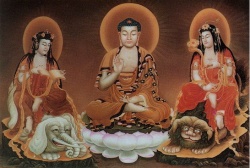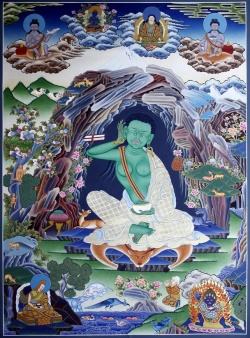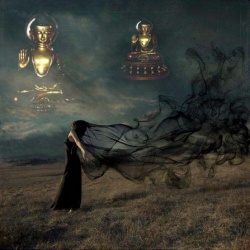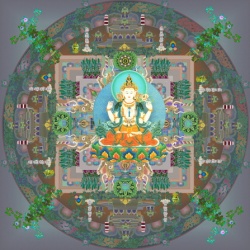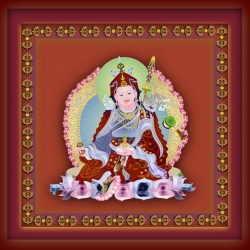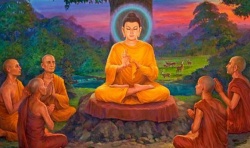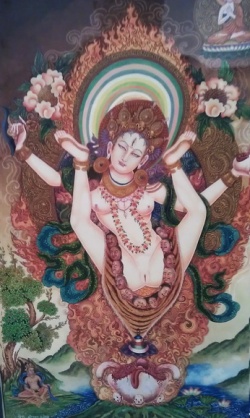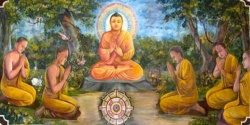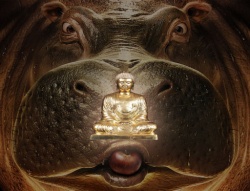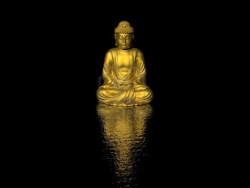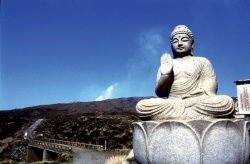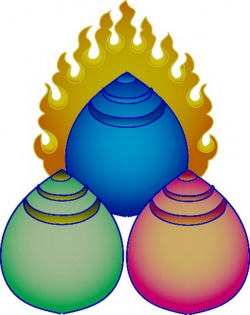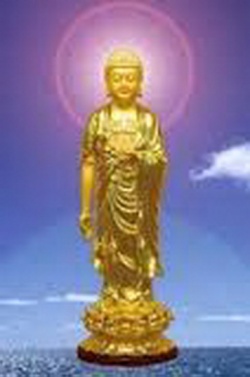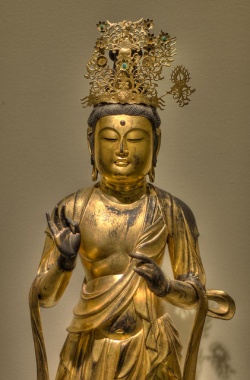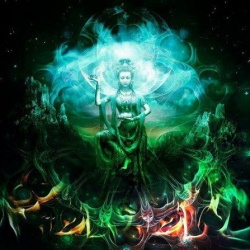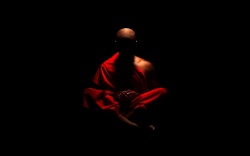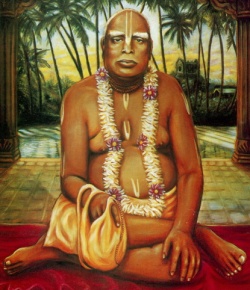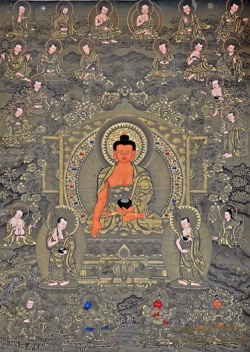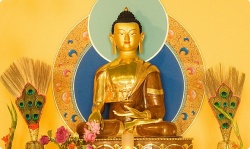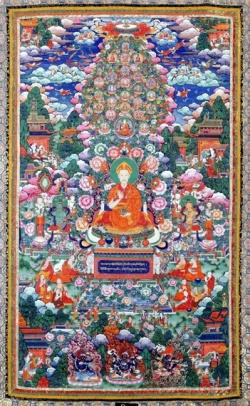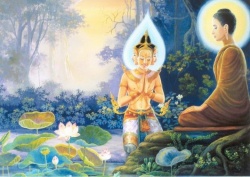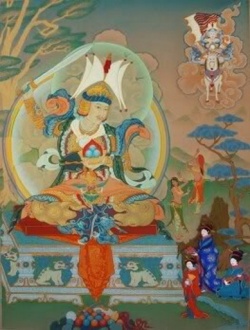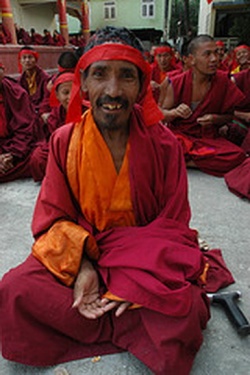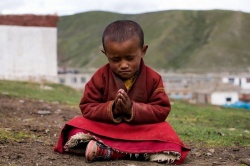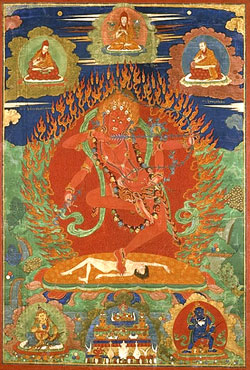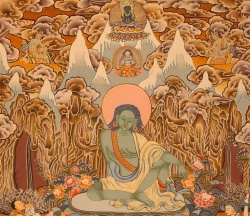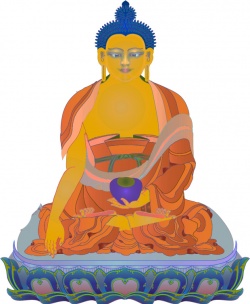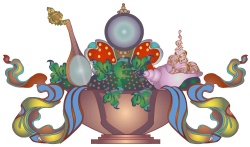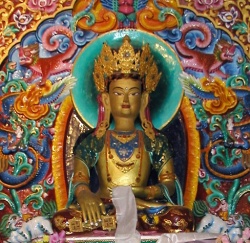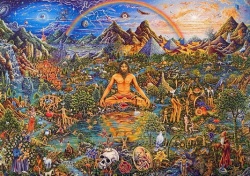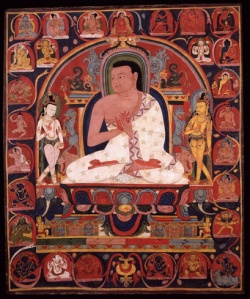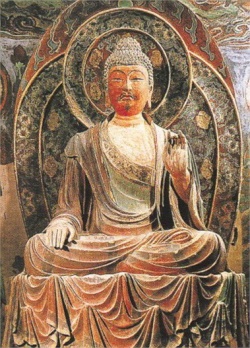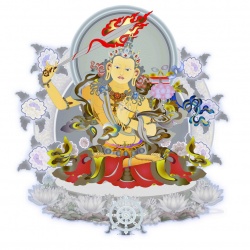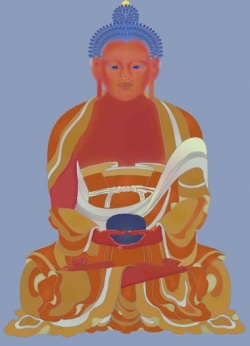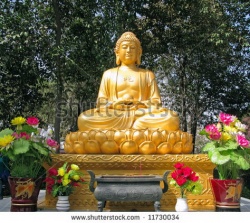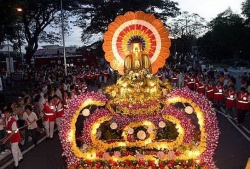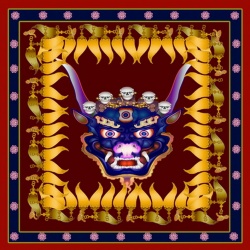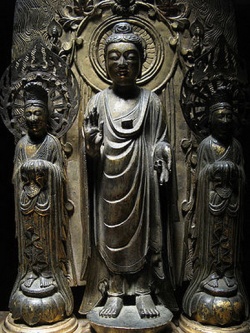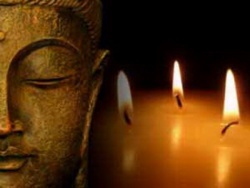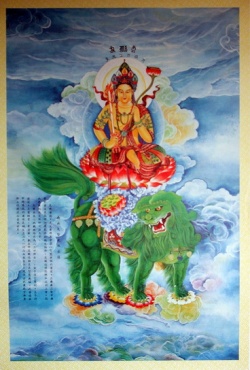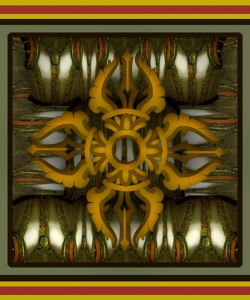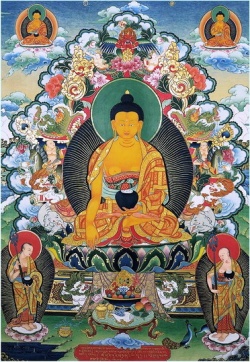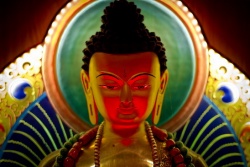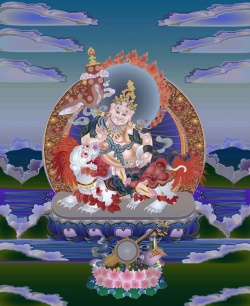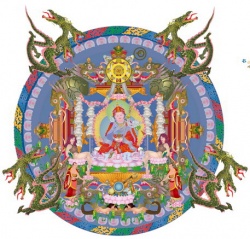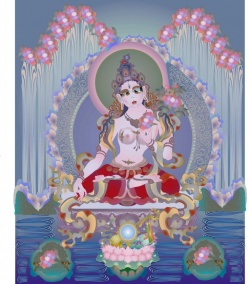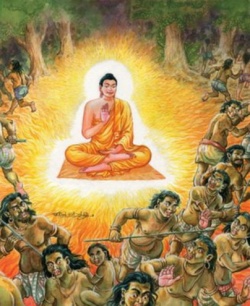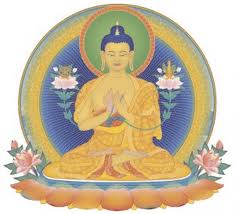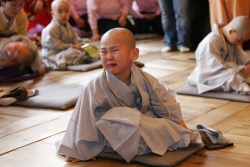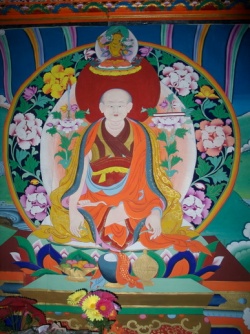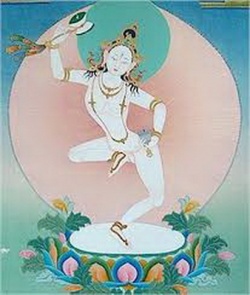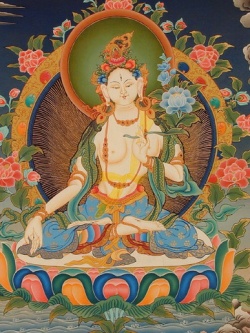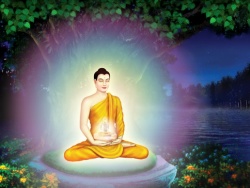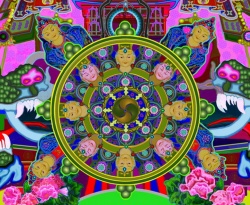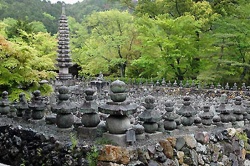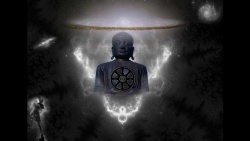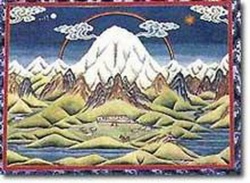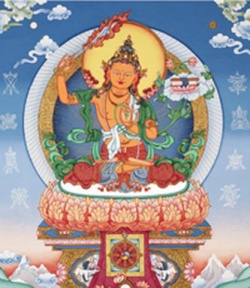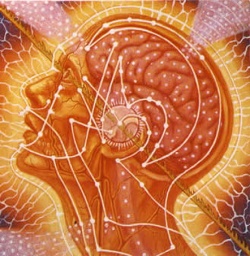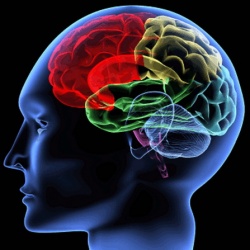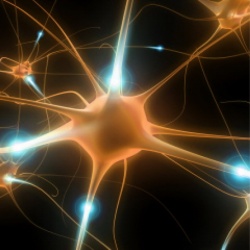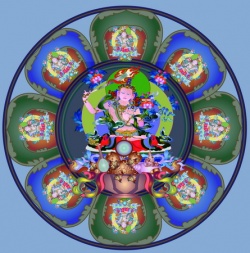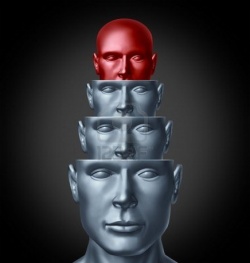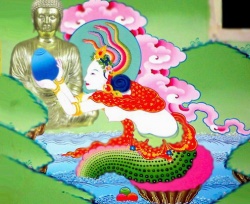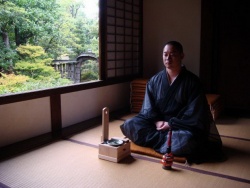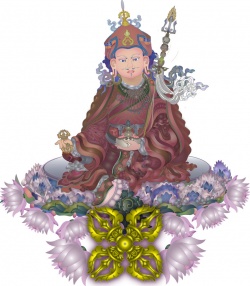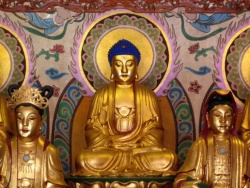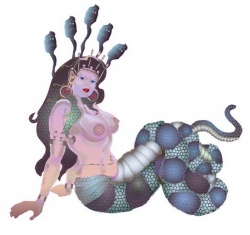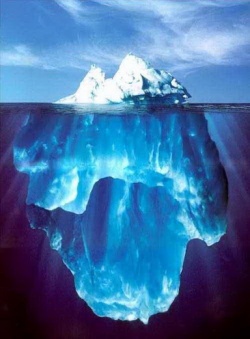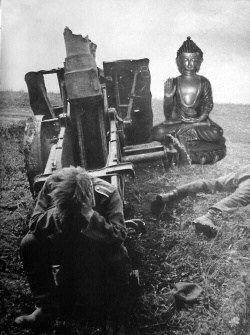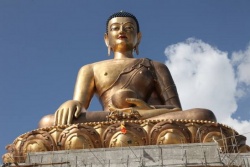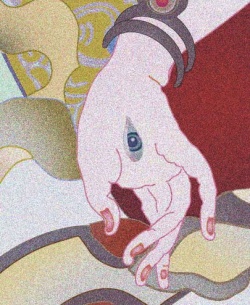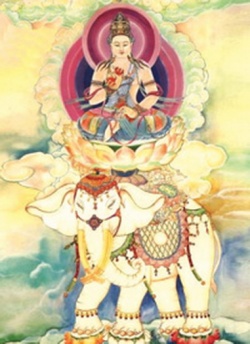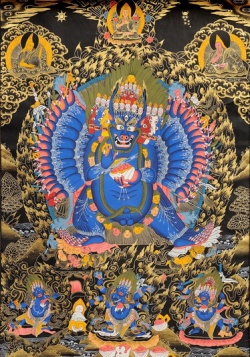The round sutra collection I
(Skt: samanta-sutra-samuccaya; JP: en-kyo).
Compiled, edited and translated by
Jotidharma Douglas D. Morom.
2003 C.E. and ongoing.
CONTENTS
[1] Introductory Comments.
[2] Text of the Round Sutra Collection.
[3] Conclusion.
THE ROUND SUTRA COLLECTION
(samanta sutra samuccaya)
Homage to the of supreme reality lotus blossom teaching. The awakened nature of root cause supreme.
[Skt: Namah saddharma-pundarika-sutra-adi-hetu-buddhaya; Jp: Namu-myo-hoh-ren-kay-kyo-butsu-hon-nin-myo
Homage to the balanced, and full awakening of the such come, the exalted, and the noble one.
[[[Pali]]: Namo tassa tathagato, bhagavato, arahato, samma sam buddho.]
Homage to the awakened-one.
[Skt: Namah-buddhaya; Jp: Namu-butsu; Pali: Namo-buddho.]
BOOK ONE
1.1
Kalama sutta. Selected passage.
[1] Come now, kalamas, be not satisfied with mere hearsay, [2] nor customary belief, [3] nor with legendary stories, [4] nor with your revered books, [5] nor with mere speculation, [6] nor with mere reasoning, [7] nor with the seeming evidence of the senses, [8] nor with a biased opinion personally thought out, [9] nor with another’s ability, [10] nor with the thought: This wanderer is our teacher. [11] But, kalamas, when you know for yourselves that these teachings are beneficial, without mistake and praised by the wise, then you should enter in and abide by them. [12] For when they are received and put into practice they lead to well being and much blessing.
1.2
Anguttara nikaya. Selected passage.
[1] Whether the tathagatas, the-such-come, arise in the world or whether tathagatas do not arise in the world, it remains an established condition, an unvarying fact and an unalterable dharma, an-unalterable-reality, that all that is constructed is ever-changing; that all that is constructed is without-lasting-satisfaction-and-insecure, and that all dharmas, all-conditioned-realities, are non self.
1.3
Uncompounded Sutta. Udana. Pataligamiya chapter. Selected passage.
[1] Oh bhikkhus, there is a ajatam, a-not-born; a abhutam, a-not-become; a akatam, a-not-created, and a asankhatam, a-not-constructed. [2] Bhikkhus, if this not born, not become, not created and not constructed was not, there would be no liberation from that which is born, become, created and constructed that could be known. [3] But bhikkhus, since there is a not born; a not become; a not created, and a not-constructed, there is a liberation from that which is born, become, created and the constructed that can be known.
1.4
Digha nikaya. Selected passage.
[1] The buddha-nana, or-the-awakened-knowing, is preeminent, boundless and everywhere illuminating. [2] Here, neither earth, water, fire, air; nor long, nor short, nor refined, nor unrefined, nor pleasant, nor unpleasant; nor nama, that-which-names, nor rupa, appearing-colour-form have any foothold. [3] Here, all that-is-dependently-arisen, is absent. [4] Through the overcoming of avijja, or-the-overcoming-of-unseeing, all that-is-dependently-arisen is thereby overcome.
1.5
Chedana sutta. The Cutting through teaching.
[1] Such i heard. At one time. [2] The exalted one said: Appearances, feelings, memories, desires and thoughts are ever-changing. [3] Whatever is ever-changing, is dukkha, without-lasting-satisfaction-and-insecure. [4] Whatever is without-lasting-satisfaction is nonself. [5] Whatever is nonself, is not-me, not-mine, and not-i. [6] This is how everything should be regarded as it truly is with insight. [7] One who develops insight in this way, understands the danger in taking appearances, feelings, memories, desires and thoughts as me and mine. [8] Understanding the danger in grasping at things as self, one no longer grasps at them-as-self. [9] No longer grasping at them-as-self, one is freed. [10] Being freed, there is the knowledge of being freed. [11] Thus one realizes that unseeing is cut off; the brahma-cariya, the-sublime-life is lived, and the task complete. [12] In the midst of dependently arisen and ever changing things, there is unshakable liberation.
1.6
Majjhima nikaya. Selected passage.
[1] Whoever sees dependent-arising sees the dharma, sees-the-real, and whoever sees dharma sees dependent-arising.
1.7
Samyutta nikaya. Selected passage.
[1] Oh vikkali, why do you stare at this corruptible body? [2] Whoever sees the dharma, or-whoever-sees-the-real sees me and whoever sees me, sees the dharma. [2] Oh vikkali, in seeing the dharma one sees me, and in seeing me one sees the dharma, one-sees-the-real.
1.8
Samyutta nikaya. Selected passage.
[1] Is it true that the tathagata, or-the-such-come is compassionate towards all living and breathing beings? [2] Yes, oh headman, replied the exalted one. [3] But does the exalted one teach the dharma, teach-the-real in full to some but not in full to others? [4] Oh headman, suppose that a farmer is possessed three fields, an excellent one, a middling one, and a poor one with poor soil. [5] Now when he wished to sow seed, which field do you suppose that he would sow first? [6] He would sow the excellent one first, then the middling one and when he had done that, he may sow the poor field with the poorest soil for the reason that it might be good for cattle feed. [7] Oh headman, in the same way, my bhikkhus and bhikkhunis are like the excellent field. [8] It is to these that i teach dharma, teach-the-real beautiful in the beginning, beautiful in the middle and beautiful in the end both in spirit and letter, and to whom i make known the brahma-cariya, or-the-sublime-life completely fulfilled and utterly pristine. [9] For this reason, these people dwell with me for light, dwell with me for protection, dwell with me for strength, and dwell with me for refuge. [10] Again, my followers who are householders, both men and women. are like the middling field. [11] To these i also teach the dharma, or- teach-the-real beautiful in the beginning, beautiful in the middle and beautiful in the end, both in spirit and letter and to whom i make known the brahma-cariya, or-the-sublime-life completely fulfilled and utterly pristine. [12] For this reason, these people dwell with me for light, for protection, for strength, and for refuge. [13] Again, those recluses, brahmins and wanderers of other views apart from me are like the poor field with poor soil. [14] It is to these that i also teach the dharma, teach-the-real beautiful in the beginning, beautiful in the middle and beautiful in the end both in spirit and letter and to whom i make known the brahma-cariya, or-the-sublime-life completely fulfilled and utterly pristine. [15] The reason is, that if they were to understand even a single sentence, it would be for them a source of well being and good fortune, for a long time.
1.9
Uncompounded sutta. Udana. Pataligamiya chapter. Selected passage.
[1] It is called neither existing nor non existing, and this fact is dufficult to see. [2] But one who knows and sees in this way cuts through attachment-to-conditioned-things-as-self. [3] And one who sees in this way is no longer troubled by anything.
1.10
Satipatthana sutta. Selected passage.
[1] Oh bhikkhus, there is the eka-yana, or-the one-and-universal-way for the purification of beings, for the overcoming of sorrow and grief, for the subsiding of insecurity and misery, for the gaining of the balanced path and for the realization of nirvana, or-the-cool, that is to say, there is the fourfold foundation of awareness. And what are the four? Herein, a bhikkhu lives contemplating the body in the body with effort, clearly comprehending and aware, overcoming both the attempt to grasp at them and to push it away-as-self that is common in the world. [2] Again perceiving feelings in the feelings with effort, clearly comprehending and aware of them, overcoming both the the attempt to grasp at them and to push them away-as-self that is common in the world. [3] Again, perceiving desires-and-intentions in the desires-and-intentions with effort, clearly comprehending and aware of them, overcoming both the attempt to grasp at them and to push them away-as-self that is common in the world. [4] And again, perceiving thoughts-and-ideas in the thoughts-and-ideas with effort, clearly comprehending and aware of them, overcoming both the attempt grasp at them-as-self and to push them away that is common in the world.
1.11
Anguttara nikaya. Selected passage.
[1] How is the cleansing of awareness threefold? In this case one is not greedy, for one no longer wants the belongings of another with the thought: I want what they possess. [2] Again, one is neither hateful nor deceitful but wishes: May all living beings move about in peace, free from ill-will, free from distress and in happiness. [3] Again, one has a balanced view; is considerate in attitude and understands that there are such things as a gift, an offering, and a sacrifice together with the result and consequence of beneficial and harmful acts. [4] That this world exists; that the after world exists, that mother, father and beings arisen spontaneously exist. [5] That there are seekers and brahmins who go in balance, who live in balance and who have realized directly for themselves the-true-nature-of this world and the after world and proclaim it as such.
1.12
Samyutta nikaya. Selected passage.
[1] Oh bhikkhus, i do not dispute with the world but the world disputes with me. [2] A proclaimer of dharma, a-proclaimer-of-the-real does not dispute with anyone in the world. [3] For whatever is not accepted by the wise in the world, i also say: That is not so. [4] And whatever is accepted by the wise in the world, i also say: That is so. [5] And what, oh bhikkhus is not accepted by the wise in the world of which i also say: That is not so? [6] It is that the body is permanent, stable, eternal and not subject to decay. Of this i also say: That is not so? [7] Again, that feeling, memory-perception, intention, and unawakened-knowing are permanent, stable, eternal and not subject to decay are also not accepted in the world by the wise. And of this i also say: That is not so.
1.13
Itivuttaka. Selected passage.
[1] Oh bhikkhus, i am a brahman, one to ask a favour of, and always open handed. [2] I wear my last body-born-of-unseeing. [4] I am the incomparable physician and surgeon. [5] You are my true heirs, born of my teaching, born of the dharma, or-born-of-the-real and created by the dharma. [6] You are my spiritual heirs, and not my bodily heirs.
1.14
Dharmapada. Selected passage. Verses one to five.
[1] All that we are is the result of our thought. It is founded on our thought. It is made up of our thought. [2] If a person speaks or acts with harmful thoughts then sorrow follows like a cart wheel follows the foot of an ox. [3] All that we are is the result of our thought. It is founded on our thought. It is made up of our thought. [4] If a person speaks or acts with caring thoughts then happiness follows like a never departing shadow. [5] He abused me. He beat me. He overpowered me. He robbed me. Those who hold such thoughts never overcome ill will. [6] He abused me. He beat me. He overpowered me. He robbed me. Those who do not hold such thoughts, overcome ill will. [7] For ill will is not overcome through ill will but through good will. [8] This is the dhamma-san-antana, or-the-real-without-end.
1,15
Anguttara nikaya. Benefits sutta.
[1] Bhikkhus, there are eleven blessings to be seen from the heart liberation resulting from the development of metta, from-the-development-of-caring, by causing caring to grow, by causing it to increase, by causing caring to be the vehicle and basis, by maintaining it, by being intimate with it, and by being well established in it. And what are the eleven? One sleeps happily. [2] One awakens happily. [3] One has no harmful dreams. [4] One is dear to human beings. [5] One is dear to nonhuman beings. [6] One is protected by the devas. [7] One is not affected by fire, poison and sword. [8] One easily attains meditative-serenity. [9] One has a calm appearance. [10] One passes away without confusion. [11] And if one penetrates no further than this, one enters the brahma-loka, the-sublime-world. [12] These are the eleven blessings to be seen from the heart liberation resulting from the practice of merciful-caring-and-kindness.
1.16
Vinaya pitaka. Selected passage.
[1] Oh bhikkhus, i am freed from every snare, both that of devas and humans. [2] And you, bhikkhus, are also freed from every snare, both that of devas and humans. [3] Therefore, bhikkhus, go forth into the world for the benefit of the many, for the happiness of the many, out of caring for the world, for the wellbeing and happiness of devas and people. [4] Let not two of you go by the same way. [5] Thus may you teach the dharma, teach-the-real, beautiful in the beginning, beautiful in the middle and beautiful in the end and explain both in spirit and letter, the brahma-cariya, the-sublime-life completely fulfilled and utterly pure. [6] For there are beings with little dust in their eyes who by not hearing the dharma are wasting away, but upon hearing dharma will grow.
1.17
Anguttara nikaya. Selected passage.
[1] Oh bhikkhus, what is the nature of the noble ablution, the noble-washing which leads to the utter turning away, subsiding, and ending; to the peace, understanding and illumination; which leads to nibbana, or-leads-to-the-cool. [2] The ablution where beings who are subject to rebirth-in-unenlightened-states-of-existence are liberated and freed therefrom; where beings who are subject to decline are freed from decline; where beings who are subject to death are freed from death; where beings who are subject to dissatisfaction, remorse, sorrow, dejection and dispair are freed there from. [3] Bhikkhus, for one who has balanced view, mistaken view is washed away, and so too are washed away the various harmful and un-beneficial states that have arisen due to mistaken views, while the various beneficial and profitable states due to balanced-view come to fullness. [4] Again, for one who has balanced intention, speech, action, living, effort, mindful-awareness and meditative-serenity and for the one who has balanced knowing and liberation, then mistaken knowing and mistaken-notions of liberation are washed away, while the various beneficial and profitable states that are due to the balanced view come to fullness.
1.18
Anguttara nikaya. Selected passage.
[1] A bhikkhu’s attainment of meditative-serenity may be of such nature that in the midst of earth he is unaware of earth; in the midst of water he is unaware of water; in the midst of fire he is unaware of fire; in the midst of air he is unaware of air; in the the midst of the sphere of boundless space he is unaware of boundless space; in the the midst of the sphere of boundless consciousness he is unaware of boundless consciousness; in the midst of the sphere of no-thing he is unaware of no-thing; in the the midst of the sphere of neither perception nor non-perception, he is unaware of neither perception nor non-perception; in this world he is unaware of this world; in the after world he is unaware of the after world; in the midst of whatever is-dependently-arisen, seen, heard, sensed, known, attained, investigated and contemplated in awareness, he is also unaware. [2] And yet, even at this time there is still awareness i say.
1.19
Samyutta nikaya. Selected passage.
[1] Ananda, it is through being a good friend to beings who are subject to arising in unawakened-states of existence that such beings are freed from arising in such states.
1.20
Udana. Selected passage.
[1] Such i heard. At one time. The exalted one was dwelling near savatthi, in the jeta grove of anathapindika’s park. [2] At that time, a number of wandering sectarians, recluses and brahmins enterd into savatthi to collect alms. [3] They were of different views, different convictions, different goals and different opinions arguing back and forth. [4] Now these recluses and brahmins held conflicting views such as: The world is eternal, this is the truth and all other views are fancy. [5] While others maintained that: The world is not eternal; this the truth and all other views are fancy. [6] Again others held: that the world is finite, or that the world is infinite, or that body and self are identical, or that body and self are different. [7] Again some held that the tathagata exists after death, or that the tathagata does not exist after death, or that the tathagata both exists and does not exist after death, or again, that the tathagata neither exists nor does not exist after death. [8] And so they lived quarreling, yelling and arguing with each other with abusive words piercing each other like arrows as they said: This is truth, or that is truth, or this or that is not the truth. [9] At that time, a number of bhikkhus, robing themselves and taking up their bowls went early into savatthi to receive alms, and upon their return, they took their meal and went to the exalted one, offered salutation and sat down to one side. [10] So seated, they described to the exalted one what they had seen and heard of those recluses and brahmins who held such one sided views. [11] Then the exalted spoke saying: Those who hold one sided views are blind and unseeing. [12] They know not the real from the unreal, nor fact from fancy. [13] And in this state of unseeing they quarrel and argue as you have described. [14] Oh bhikkhus, in the past their was a raja, a-king in this city-of-savatthi. [15] At that time, the raja called upon a certain individual saying: Come good man go forth and gather together all the blind men in savatthi. [16] Yes, your majesty, he replied, and in deference to the raja, gathered together all the blind men and took them to the raja saying: Your majesty, all the blind men of savatthi are now assembled. [17] Now my good man, may you now show these blind men an elephant. Yes your majesty, said the man, and he did as request saying: Oh sirs, this is an elephant. [18] To one man he presented the head of the elephant, to another the ear, to another a tusk, to another the trunk, or a foot, or the back, or the tail, or the tuft of the tail, saying to each one that this was the elephant. [19] Oh bhikkhus, when he had presented the elephant to each of the blind men, he went to the raja and said: Your majesty, the elephant has been presented to the blind men as requested.
[20] Then, oh bhikkhus, the raja went up to each of the blind men and asked: Have you examined the elephant? Yes, your majesty. Then what is your opinion? [21] Now those who had been presented with the head replied: Your majesty, the elephant is just like a pot. [22] And those who had been presented with the ear replied: The elephant is just like a winnowing basket. [23] And those who had been presented with the tusk replied: It is like a ploughshare. [24] And those who where presented with the trunk replied: It is like a plough. [25] Again some said the body was like a granary; or the foot like a pillar; or the back like a mortar; or its tail like a pestle, and the tuft of the tail like a broom. [26] Then they began arguing and shouting saying: It is like this, or it is like that, until they came to blows. [27] And when the raja saw this he was amazed. [28] Now in like manner are those who hold one sided views, for they are blind and unseeing and knowing not the factual, each maintains a one sided view.
1.21
Turning the dharma wheel sutta. Selected passage.
[1] Such I heard, at one time. [2] The exalted one was dwelling near banares, at isipatana, in the dear park. The exalted one then spoke to the five bhikkhus saying: Oh bhikkhus, there are two extremes that should not be followed by one gone forth. [3] Over indulgence, which is limited, troublesome, shallow, ignoble and harmful, and excessive self punishment, which is also painful, ignoble and harmful. [4] Oh monks, by avoiding these two extremes, the tathagata, the-such-come, has found the middle method-and-way which gives vision, which gives understanding, which leads to peace, higher knowing, full awakening and nirvana, the-cool-and-liberating.
1.22
Turning the dharma wheel sutta. Selected passage.
[1] Oh monks, and what is the middle way found by the tathagata, which gives vision, which gives understanding, which leads to peace, higher knowing, full awakening and nirvana? [2] It is the eightfold way-and-method of the noble ones, namely: balanced view, balanced intention, balanced speech, balanced conduct, balanced livelihood, balanced effort, balanced mindfulness and balanced concentration. [3] This, oh bhikkhus, is the middle way found by the tathagata which gives vision, which gives understanding, which leads to peace, higher knowing, full awakening and nirvana.
1.23
Turning the dharma wheel sutta. Selected passage.
[1] Oh bhikkhus, this is the noble fact concerning dukkha, dissatisfaction-and-insecurity: birth is insecure, aging is insecure, sickness is insecure, death is insecure, sorrow, lamentation, pain, grief and despair are insecure, getting what is not wanted is insecure, not getting what is wanted is insecure, in short the five khandhas, the-fivefold-complex-of-sensations-feelings-memories-desires-and-thoughts comprising a person, which are both the source and object of grasping-at-as-self, are dukkha, without-lasting-satisaction-and-insecure.
1.24
Turning the dharma wheel sutta. Selected passage.
[1] Oh bhikkhus, now this is the noble fact of the origin of dukkha, of-dissatisfaction-and-insecurity: [2] It is the mistaken grasping-at-self, which conditions the state of existence, together with mistaken grasping at that-which-is-without-lasting-satisfaction, that seeks satisfaction now here and now there. [3] That is to say, the mistaken grasping at sensation-as-self, the mistaken grasping at existence-as-self, and the mistaken grasping at non existence-as-self.
1.25
Turning the dharma wheel sutta. Selected passage.
[1] Now this, oh bhikkhus, is the noble fact concerning the overcoming of dukkha, or-dissatisfaction-and-insecurity: [2] It is the complete fading away and overcoming, the turning away, the giving up, the letting go, and the liberation from this grasping-at-dependently-arisen-things-as self. [3] This, bhikkhus, is the noble fact of the method-and-practice leading to the overcoming of dukkha. That is to say; the noble eightfold method.
1.26
Majjhima nikaya. Selected passage.
[1] Oh bhikkhus, here in the deer park the tathagata, or-the-such-come, the arahat, or-the-noble-one, and the balanced and fully awakened one has turned the unsurpassed dharma wheel.
1,27
Majjhima nikaya. Selected passage.
[1] What is balanced view? [2] There are two aspects to balanced view. [3] There is that associated with unawakened-knowing which is beneficial and results in higher states of existence. [4] And then there is the balanced view of the ariyas, the-noble-ones, which is free of unawakened-knowing, which is supermundane, and a factor of the path. [5] And what is the balanced view associated with unawakened-knowing? [6] The view that there is the gift, the one to whom it is offered and the offering-itself; [7] that there is beneficial and harmful karma or-action that has its result and fruit; [8] that there is this world and the further world; [9] that there is mother and father; [10] that there are apparitional beings, and [11] that there are noble and virtuous bhikkhus and brahmans who have realized direct knowledge for themselves and who thereby illuminate both this world and the further world. [12] This is the balanced view that is associated with unawakened-knowing. [13] What then is the balanced view of the ariyas-the noble-ones? [14] Any such understanding, or faculty of insight, or power of insight, or the investigation of phenomenal-realities-as-nonself that is a factor of enlightenment, or the balanced view that is a factor of enlightenment that is present in one whose awareness is ennobled and free of unawakened-knowing, who has realized the method and maintains it in practice. [15] This is the balanced view of the ariyas, the-noble-ones, that is free of unawakened-knowing, is supermundane, and is a factor of the path.
1.28
Samyutta nikaya. Selected passage.
[1] The instructed disciple of the ariyas, the-noble-ones, sees form-and-appearances and so on as: This is not mine; I am not this; This is not myself. [2] So that when form-and-appearances and so on change and become altered, there does not arise grief, sorrow, dissatisfaction-and-insecruity, lamentation and despair.
1.29
Samyutta nikaya. Selected passage.
[1] The instructed disciple of the ariyas, the noble-ones, does not regard appearing-colour-form as the self, nor the self as possessing appearing-colour-form, nor appearing-colour-form as being in the self, nor the self as being in appearing-colour-form. Nor does he regard feeling, perception, intention and thought in any of these ways. [2] He understands each of these khandhas, or-each-of these-complexes as it truly is, as ever-changing, insecure, nonself, constructed, and mortal. [3] He does not approach them, grasp at them nor regard them as: This is myself. [4] And this is conducive to his wellbeing and happiness for a long time.
1.30
Samyutta nikaya. Selected passage.
[1] Oh bhikkhus, i will teach you the burden and the bearer of the burden. [2] The panca-khandha, or-the-fivefold-complex, is the burden, while the pudgala, or-the-ego, is the bearer of the burden. [3] One who says that there is no self at all, is mistaken in their understanding.
1,31
Samyutta nikaya. Selected passage.
[1] If one does not see an unconditioned-self, or anything of an unconditioned-self in the panca-khandha, in-the-five-fold-complexes-of-grasping, then one is an arahat with the habitual tendencies overcome.
1.32
Majjhima nikaya. Selected passage.
[1] An uninstructed person does not think wisely if he thinks: In the past i was!; or: I was not!; or: What was i?; or: What was i like?; or: Having been such, how was i then? Or if he thinks: In the future will i exist?; or: Will i not exist?; or: How will i exist?; or: What will i be like?; or: Having been such and such, what will i become? Or if he is doubtful about himself at present and thinks: Am i?; or: Am i not?; or: What am i?; or: What am i like?; or: Where did i come from?; or: Where am i going and what will become of me? [2] To one who thinks in these ways without insight, one of six mistaken views may arise as if true and real, that is to say: There is myself!; or: There is not myself!; or: By self i am aware of self!; or: By self i am aware of no-self!; or: By no-self i am aware of my-self! [3] Or he may have the mistaken view such as: This self of mine that speaks and knows, that experiences now here and now there, the results of karma, or-of-actions-of-thought-word-and-deed that are pleasant or unpleasant, this self of mine is permanent, stable, unchanging and will remain forever! [4] This is what is called mistaken views, the holding of mistaken views, mere speculation and the shifting obstacle of mistaken views. [5] And bound by this obstcle, the uninformed person is not liberated from birth, aging and death, nor from grief, sorrow, lamentation, dissatisfaction, and despair.
1.33
Kacca-yana gotta sutta. Samyutta nikaya.
[1] Such i heard, at one time. The exalted one was dwelling in savatthi, at the retreat of anathapindika, within the jeta grove. [2] At that time the venerable kacca-yana-gotta approached him, offered salutation and sat down to one side. [3] So seated, he questioned the exalted one saying: Sir, people speak of balanced view. Now, to what extent is there balanced view? [4] Oh kacca-yana, the world generally tends towards these two extreme-views: either that of eternal-existence or that of utter-non-existence. [5] But for one who sees factually with balanced insight how the world arises, then the idea that the world is utterly-non-existent does not occur. [6] Again, kacca-yana, for one who sees factually with balanced insight, how the world passes away, then the idea that the world is eternally-existent does not occur. [7] Kacca-yana, for the most part, the world is bound by these approaches, graspings and tendencies. [8] But for one who does not follow these approaches and graspings, these characterizations, tendencies and attitudes of awareness, and who does not grasp or hold the view: This is my self. [9] But who thinks: Only that which is insecure and subject to arising, arises, and only that which is insecure and subject to passing-away, passes-away. [10] Such a person is thereby free from doubt and free from confusion. [11] In this case that person’s understanding is not dependent on externals. [12] In this way, kacca-yana, there is balance view. [13] Kacca-yana, that everything is eternally-existent, is one extreme. [14] Or, kacca-yana, that everything becomes utterly-non existent, is the other extreme view. [15] Kacca-yana, by avoiding both extremes, the tathagata teaches dharma, or-teaches-the-real by means of the middle. [16] That is to say, not-seeing, conditions mistaken-intentional-action. Mistaken-intention, conditions mistaken-awareness. Mistaken-awareness conditions thought and appearance. Mistaken-nature of thought and appearance conditions the six sense spheres. Mistaken-six sense spheres condition sensation. Mistaken-sensation conditions feeling. Mistaken-feeling conditions grasping. Mistaken-grasping, conditions clinging. Mistaken-clinging, conditions the states of unawakened-being. Mistaken-states of unawakened-being, condition-the-nature of birth. The mistaken-nature of birth, conditions-the-nature of old age, death, sorrow, lamentation, insecurity, dejection and despair. This is how the whole mass of dukkha, of-dissatisfaction-and-insecurity arises. [8] Now with the complete fading-away and overcoming of not-seeing, mistaken-intention is overcome. With the overcoming of mistaken-intention, mistaken-awareness is overcome. With the overcoming of mistaken-awareness, mistaken-thought and appearance is overcome. With the overcoming of mistaken-thought and appearance, the mistaken-six sense spheres are overcome. With the overcoming of the mistaken-six sense spheres, mistaken-sensation is overcome. With the overcoming of mistaken-sensation, mistaken-feeling is overcome. With the overcoming of mistaken-feeling, mistaken-grasping is overcome. With the overcoming of mistaken-grasping, mistaken-clinging is overcome. With the overcoming of mistaken-clinging, the mistaken-states of unawakened-existing are overcome. With the overcoming of the mistaken-states of unawakened-existence, the mistaken-nature of birth is overcome. With the overcoming of the mistaken-nature of birth; old age, death, sorrow, lamentation, insecurity, dejection and despair are overcome. And this is how the whole mass of dukkha, of-dissatisfaction-insecurity, is overcome.
1.34
Majjhima nikaya. Selected passage.
[1] The person who does not know of the ariyas, the-noble-ones, lives with awareness overwhelmed and enslaved by the view that the ego is the self; [2] by the uncertainty regarding the true nature of the world; [3] by mistaking rule and ritual as an end in itself; [4] by infatuation with sensation and ill-will, and [5] is unable to see any freedom from these when they arise. These are called the five gross-fetters and when not overcome, they remain habitually.
1.35
Digha nikaya. Selected passage.
[1] The five subtle fetters are: attachment to pure-appearances-as-the-self; [2] the attachment to the absence of all-appearance-as-the-self; [3] basic-ego-centric-conceit;
[4] basic-anxiety-and-fear, and [5] the basic-unseeing-and-unknowing.
1.36
Majjhima nikaya. Selected passage.
[1] There are those bhikkhus who by overcoming the first three fetters, have entered the stream, who are no longer subject to reappear in the worlds of dispair, who are established in ethical-conduct and who are destined to awakening. [2] Again, there are bhikkhus who by overcoming the three fetters and by weakening infatuation, ill-will and unawareness have become once-returners, who by returning only once to this world of unawakened-state, will accomplish the overcoming of dukkha, the-overcoming-of dissatisfaction-insecurity. [3] Again, there are bhikkhus who by completely overcoming these five gross fetters are destined to spontaneously appear in the further-world and will therein realize nirvana, never-returning from that world. [4] Again, there are bhikkhus who are arahants, who-are-worthy-and-noble-ones with their fetters overcome, who have lived the brahmacariya, or-the-sublime-life; completed the task; put down the burden; realize the gaol; overcome the fetters, and who are freed through direct knowing for themselves.
1.37
Samyutta nikaya. Selected passage.
[1] What is balanced will-and-intention? [2] It is the will to non-attachment-to-things-as-the-self; [3] the will to non-violence, [4] and the will to non-cruelty. [5] This is called a balanced will.
1.38
Majjhima nikaya. Selected passage.
[1] Even if bandits with a two-handed saw, brutally severe limb from limb, if because of this one holds ill will in one’s heart towards them, then one is not a follower of my teaching.
1.39
Samyutta nikaya. Selected passage.
[1] What is balanced speech? [2] To refrain from lying, slander, abuse and gossip. [3] This is called balanced speech.
1.40
Samyutta nikaya. Selected passage.
[1] What is balanced action? [2] To refrain from causing harm to breathing things, from taking what is not given, and from excess. [3] This is called balanced conduct.
1.41
Anguttara nikaya. Selected passage.
[1] When a householder is possessed of five things, the househloder lives securely at home, and will arise in the deva-world as surely as if he had been lifted up and put there. [2] And what are these five things? [3] He undertakes the training in non-harming breathing beings; in not taking what is not given; in non-disloyalty; in not speaking untruth, and further in the non abuse of liquor, wine and fermented brews which can result in future regret.
1.42
Samyutta nikaya. Selected passage.
[1] What is balanced livelihood? [2] Herein, a noble follower gives up harmful means of livelihood and obtains their living through balanced means of livelihood.
1.43
Anguttara nikaya. Selected passage.
[1] Oh bhikkhus, there are five means of livelihood that ought not to be followed by a householder. [2] And what are the five? [3] They are trade in weapons; trade in living beings; trade in flesh; trade in fermented drinks, and trade in poison.
1.44
Majjhima nikaya. Selected passage.
[1] Scheming-deception; forcing; hinting; belittling and profiteering are called wrong means of livelihood for bhikkhus.
1.45
Samyutta nikaya. Selected passage.
[1] What is balanced effort? Herein a bhikkhu calls forth desire for the non-arising of as yet non-arisen harmful and unbeneficial states, for which he puts forth effort, arouses energy, applies awareness and exertion. [2] He calls forth desire for the letting go of those harmful and unbeneficial states that have already arisen, for which he puts forth effort, arouses energy, applies awareness and exertion. [3] He calls forth desire for the arising of as yet non-arisen beneficial states, for which he puts forth effort, arouses energy, applies awareness and exertion. [4] He calls forth desire for the continuance, the non-decline, the strengthening, the maintaining, and the further development of beneficial states already arisen, for which he puts forth effort, arouses energy, applies awareness and exertion. [5] This is called balanced effort.
1.46
Samyutta nikaya. Selected passage.
[1] What is balanced mindful-awareness? [2] Herein a bhikkhu lives contemplating the body in the body, with effort, clearly comprehending it and mindful of it, overcoming the tendencies to both grasp at it-as-self, or to push it away that are common in the world. [3] Again perceiving feelings in the feelings, with effort, clearly comprehending them and mindful of them, overcoming the tendency to both grasp at them-as-the-self or to push them away that is common in the world. [4] Again perceiving desires-intentions in the desires-intentions with effort, clearly comprehending them and mindful of them, overcoming the tendency to both grasp at them-as-self or to push them away that is common in the world. [5] Again perceiving all ideas and things in all ideas and things with effort, clearly comprehending them and mindful of them, overcoming the tendency to both grasp at them-as-self or to push them away that is common in the world. [6] This is called balanced mindful-awareness.
1.47
Samyutta nikaya. Selected passage.
[1] Oh bhikkhus, i will teach you the arising and vanishing of the four foundations of mindfulness, that is to say: The body has nutriment for its arising and it vanishes with the absence of nutriment. [2] Feelings have sensation for their arising and they vanish with the absence of sensation. [3] Desires-and-intentions have awareness and appearances-to-awareness for their arising and they vanish with the absence of awareness and the appearances-to-awareness. [4] Again, ideas and thoughts have attentive-awareness for their arising, and they vanish with the absence of attentive-awareness.
1.48
Anguttara nikaya. Selected passage.
[1] All mistaken-phenomena have mistaken-grasping-at-self as their origin; [2] mistaken-attention gives them being; [3] mistaken-sensation is their arising; [4] mistaken-feeling is interaction with them; [5] concentration is the interface with them; [6] awareness is mastery over them; [7] insight-into-non-selfness is the transcendence of them, and [8] liberation is their very core.
1.49
Samyutta nikaya. Selected passage.
[1] What is balanced samadhi, or balanced-meditative-absorption? [2] Herein a bhikkhu secluded from sensations and secluded from harmful mental states enters and dwells in the first absorption which is associated with intial-thought; with sustained-thinking; with rapture, and with happiness arisen from seclusion-from-distraction. [3] And with the subsiding of initial-thought and sustained-thinking and by gaining inner calm and one-pointedness he enters and dwells in the second absorption that is without initial-thought and sustained-thinking but has rapture and happiness, arisen from meditative-absorption. [4] And with the subsiding of rapture while dwelling in onlooking-equanimity; mindful and fully aware, feeling peace both in and throughout his entire person, he enters and dwells in the third absorption of which the ariyas-the-noble-ones say: He has a pleasant abode, who dwells in equanimity and awareness. [5] And again, with the overcoming of pleasure and pain and with the subsiding of that former happiness and grief, he enters and dwells in the fourth absorption which has neither pleasure nor pain wherein clarity of awareness arises from upekkha, from-onlooking-unbiased-equanimity.
1.50
Majjhima nikaya. Selected passage.
[1] With the complete subsiding of perceptions of rupa, of- appearance-with-colour-and-form, and with the vanishing of perceptions of boundaries and with the non-perception of this and that, a bhikkhu enters and dwells in the perception of the sphere of boundless-spaciousness. [2] Again, with the complete subsiding of the perception of the sphere of boundless-space but still with the perception of boundless-perception, he enters and dwells in the perception of the sphere of boundless-perception. [3] Again, with the complete subsiding of the perception of the sphere of boundless-perception but with the perception of nothing at all, he enters and dwells in the perception of the sphere where there is nothing at all. [4] Again, with the complete subsiding of the perception of the sphere where there is nothing at all, he then enters and dwells in the sphere of neither perception nor non-perception.
1.51
Majjhima nikaya. Selected passage.
[1] The four absorption's of appearance-with-colour-form, are not called liberation in the training of the ariyas, the-noble ones. [2] In the noble training, they are called pleasant abodes here and now. [3] Again, the four formless absorptions-without-appearance-of-colour-and-form are not called liberation in the training of the noble ones. [4] Rather, in the noble training, they are called peaceful abodes.
1.52
Majjhima nikaya. Selected passage.
[1] With the complete subsiding of the sphere of neither-perception-nor-non-perception, a bhikkhu enters and dwells in the-overcoming-and-cessation-of-perception-and-feeling and his faults are ended by direct-knowing and vision. [2] In this case, a bhikkhu is said to have deprived mara, or-the-mortal-one of eyesight, to be invisible to mara, and furthermore, to have overcome all attachment to the world-as-the-self.
1.53
Majjhima nikaya. Selected passage.
[1] The bhikkhu who practices the eight jhanas, or the-eight-absorbtions, is said to have temporarily-blindfolded mara, the-mortal-one; to have temporarily deprived mara of eyesight, and to be invisible to mara.
1.54
Samyutta nikaya. Selected passage.
[1] One morning the venerable ananda dressed and taking his bowl and outer robe went out into savatthi for alms. [2] Then he saw janussoni, the brahman, driving out of savatthi in a chariot drawn by four white horses, fine white steeds, with white harnesses, with a white chariot, white upholstery, white sandals and even with a white fan, fanning him. [3] And when the people saw this, they exclaimed: Now that truly is a brahma vehicle! Truly that is like a brahma vehicle! [4] And upon returning, the venerable ananda told all this to the exalted one, and then asked: Can one point out a brahma vehicle in this dhamma and training? [5] The exalted one then said to ananda: Yes one can, for brahma vehicle is a name for the eightfold method, and so too is dhamma vehicle, and so too is supreme victory in battle. [6] For all aspects of the eightfold method culminate in the overcoming of attachment, ill-will, and unawareness of the impermanence-insecurity-and-nonselfness-of-all-things.
1.55
Anguttara nikaya. Selected passage.
[1] It is cetena, or choice-and-intention, that i call karma, or intentional-action-of-thought-word-and-deed. [2] It is through choice that a person performs karma, performs-action through body, speech and mind. [3] Again, there is karma, that will ripen as the hellish, brutal, ghostly, human, and deva worlds-of-unawakened-existence in one of three ways, either in the present, or the near future, or in some future existence.
1.56
Samyutta nikaya. Selected passage.
[1] What is nutriment? [2] There are four kinds of nutriment that sustain those who are already in unawakened-existence and assist those who are seeking renewed existence. [3] They are gross and subtle physical food; sensation; choice; and unseeing.
1.57
Anguttara nikaya. Selected passage.
[1] Oh monks, greed is a condition for the arising of karma, for-the-arising-of-action-through-thought-word-and-deed; [2] ill-will is a condition for the arising of karma, and [3] unseeing-unawareness is a condition for the arising of karma.
1.58
Anguttara nikaya. Selected passage.
[1] When burning with greed; filled with ill-will and confused by unawareness, a person who is overwhelmed and controlled by these causes sorrow for themselves; causes sorrow for others, and causes sorrow for both. [2] And for this-reason experiences both grief and sorrow due their own karma, due-to-their-own-actions.
1.59
Majjhima nikaya. Selected passage.
[1] Living beings are owners of their karma, or their-unawakened-actions-of-thought-word-and-deed; heirs of their karma, with karma as their ancestor, with karma as their relation, and with karma as their dwelling place and shelter. [2] It is karma, that differentiates living beings into higher and lower states of unawakened-existence.
1.60
Samyutta nikaya. Selected passage.
[1] What is past karma, past-unawakened-action-of-thought-word-and-deed? [2] It is unawakened-seeing, hearing, smelling, taste, touch and thinking that are past karma that has already been willfully performed and must be experienced in order to be known. [3] What is present karma? [4] It is whatever karma, whatever-action, that one does at present through deed, word and thought.
1.61
Samyutta nikaya. Selected passage.
[1] This unawakened-life belongs neither to oneself nor to another. [2] It is past karma, or-past-unawakened-actions-of-thought-word-and-deed that has already been performed and intended and must be experienced in order to be known.
1.62
Anguttara nikaya. Selected passage.
[1] Karma, or-unawakened-action-in-thought-word-and-deed, based in greed, ill-will and unawareness ripens wherever-not-seeing-prevails, and wherever karma ripens there is the experience of this ripening either in the present, future, or in some later existence.
1.63
Anguttara nikaya. Selected passage.
[1] There are four in-concievables which cannot be directly known-conceptually and any attempt to directly-know them conceptually will lead to frustration and delirium. [2] What are the four? [3] They are the objective field of the buddhas, the-fully-awakened-ones. [4] The objective field of those who have attained the jhanas, or-the-meditative-absorptions. [5] The ripening of karma, or-the-unawakened-actions-of-thought-word-and-deed. [6] And the extent of the universe.
1.64
Majjhima nikaya. Selected passage.
[1] Health is the greatest blessing. [2] Nirvana is the greatest peace. [3] And the eightfold method is the greatest method leading to the secure, to the immortal and deathless.
1.65
Anguttara nikaya. Selected passage.
[1] And what is the consequence of dukkha, or-dissatisfaction-and-insecurity? [2] When someone’s awareness is overwhelmed and preoccupied with dissatisfaction, one either sorrows, laments, beats the chest, weeps and is confused, or one begins to search for the other, for-the-further-and-the-beyond thinking: Who is there that knows but one or two words leading to the overcoming of dukkha, to-the-ovecoming-of-dissatisfaction-insecurity? [3] For i say, that the result of dukkha is either more perplexity, or the beginning of the search.
1.66
Samyutta nikaya. Selected passage.
[1] In the noble training, the term loka, or-the-world, refers to the world by which one perceives the world and conceives views about the world. [2] And what is there in the world by which one does this? [3] It is unawakened-seeing, hearing, smelling, tasting, touching and thinking.
1.67
Samyutta nikaya. Selected passage.
[1] It is called the loka, or-the-world, because it wears away.
1.68
Anguttara nikaya. Selected passage.
[1] There is sila, balanced-action; there is samadhi-balanced-meditative-concentration; there is panna, balanced-penetrating-insight, and there is vimutti, liberation-and-freedom. [2] When based in beneficial-action, meditative-concentration brings higher fruit and blessing. [3] When based in meditative-concentration, penetrating-insight brings higher fruit and blessing. [4] When based in penetrating-insight, awareness becomes liberated from all faults, namely the fault of attachment to sensations-as-self, the fault of existence-conditioned-by-unseeing, the fault of mistaken-views, and the fault of not seeing.
1.69
Anguttara nikaya. Selected passage.
[1] Oh bhikkhus, inconceivable is the first beginning of the thirst for becoming, before which it was nonexistent and after which it came into being. [2] However, a main condition for the thirst for becoming is conceivable. [3] Again, bhikkhus, i say that this thirst for becoming has a sustaining condition and does not occur without it. [4] And what is that? [5] It is unawakened-seeing. [6] For both the unawakened-thirst for becoming, and unawakened-seeing are the primary causes that lead to both pleasant and unpleasant states of unawakened-existence.
1.70
Majjhima nikaya. Selected passage.
[1] Suppose someone were to throw a yoke into the ocean with one opening in it so that the east wind blows it to the west, the west wind blows it to the east, the north wind blows it towards the south and the south wind blows it towards the north. [2] And suppose there was a blind turtle that arose to the surface once every hundred years. [3] Bhikkhus, what do you think, would that turtle eventually put his head through the single opening in the yoke? Yes sir, after a long period of time it might be possible. [4] However, bhikkhus, that blind turtle would sooner put his head through that single opening in the yoke, than the unseeing-being, once they have fallen into the distressful-hellish-states, would return to the human state. [5] The reason is, that there is no dhamma, no-understanding-of-the-real therein, no balanced-living, no doing of what is appropriate and no doing of what is good.[6] Oh bhikkhus, therein is the devouring of each other by each other and the feeding on the weak. [7] Again, bhikkhus, if after a long period of time the unseeing-being does return to the human state, they would be born into poor families or into a family of hunters or of bamboo-workers or a family of cart wrights or a family of garbage-pickers or in such families as are destitute without food and drink and where clothing to cover the body is difficult to obtain. [8] Furthermore, they will be ill-favoured, or unpleasant to look at, or stunted, or sickly, or blind or deformed or lame or paralyzed. [9] They would be unable to obtain food, drink, clothing, vehicles, garlands, scents, bedding, dwelling and light. [10] They would live unbalanced in deed, word and thought. [11] And because they live unbalanced in deed, word and thought, when their body breaks up at death, they will again arise in the distressful-states, in an unfortunate birth, in a downfall, in the hellish-state of niraya.
1.71
Majjhima nikaya. Selected passage.
[1] Oh bhikkhus, i have revealed to you that the dhamma, or-the-way-of-reality is like a raft for crossing over and not for grasping at-as-an-end-in-itself. [2] Bhikkhus, through understanding the parable of the raft you should know that you must go beyond even balanced views of dharma, how much more so mistaken views of dharma.
1.72
Anguttara nikaya. Selected passage.
[1] Oh monks, i know of no other thing greater than mistaken views by which harmful things not yet arisen arise and by which harmful things already arisen grow and increase. [2] I know of no other thing greater than mistaken views by which beneficial things not yet arisen are hindered in their arising, and the beneficial things already arisen subside. [3] I know of no other thing greater than mistaken views by which human beings at the breaking up of the body, at death, pass away into the unpleasant, into a world of sorrow, into a hellish-state.
1.73
Anguttara nikaya. Selected passage.
[1] By criticizing that which should be criticized and praising that which should be praised, the exalted one is a vibhajja-vadin, a-discerning-speaker, and not one sided in his speech.
1.74
Samyutta nikaya. Selected assuage.
[1] Now if one holds the view that the life-principle is identical with the body, then the profound-life would be impossible. [2] Again, if one holds the view that the life-principle is entirely different from the body, then the profound-life would also be impossible. [3] The tathagata avoids both these extreme views and so reveals the majjhima-dhamma, or-the-middle-view-of-reality.
1.75
Anguttara nikaya. Selected passage.
[1] Oh monks, i know of no other thing other than an attractive object through which attachment to sensation-as-the-self, may arise and once arisen continue to grow and increase. [2] For one who does not consider an attractive object with insight-as-nonself, in him attachment to sensation-as-the-self, will arise, and once arisen will continue to grow.
1.76
Anguttara nikaya. Selected passage.
[1] Oh bhikkhus, there are two luminous principles that protect the world: They are hiri, or-respect-for-self, and ottappa, or-respect-for-others. [2] If these two principles did not exist to protect the world, then one would not respect one’s mother, nor one’s mother’s sister, nor one’s brother’s wife, nor one’s teacher’s wife.
1.77
Majjhima nikaya. Selected passage.
[1] When unseeing has been overcome and seeing has arisen, one no longer grasps at material-form-as-the-self, nor at mistaken views, nor at rules and rituals as ends in themselves, nor at mistaken-notions-of-conditioned-things.
1.78
Digha nikaya. Selected passage.
[1] Oh bhikkhus, how does a bhikkhu dwell mindful of the body in the body? [2] Herein, a bhikkhu enters the forest, or sits at the base of a tree, or goes to some empty place and sits crossed legged, with body erect and with awareness brought forth and established in him. [3] Mindfully he inhales and mindfully he exhales. [4] If he inhales a deep breath he is aware of it. [4] If he exhales a deep breath he is aware of it. [5] If he either inhales a shallow breath or exhales a shallow breath, he is aware of it. [6] He practices with the thought: Aware of my whole body, i inhale. [7] He practices with the thought: Aware of my whole body, i exhale. [8] He practices with the thought: Relaxing my entire bodily state, i inhale. [9] He practices with the thought: Relaxing my entire bodily state, i exhale. [10] Just as a skilled turner, or a turners apprentice when pulling a cord to full length, is aware that he is doing so, or in pulling a cord to a short length, is aware that he is doing so, so too, is the bhikkhu with regard to the body, he continues to contemplate the body both internally and externally. [11] He continues contemplating the arising of bodily phenomena. [12] He continues contemplating the passing away of bodily phenomena. [13]
He continues contemplating both the arising and passing away of bodily phenomena. [14] Again, he is mindful of the presence of the body to the degree necessary for awareness and attentiveness. [15] And so he dwells independently, without grasping at anything in the world-as-self. [16] This is how a bhikkhu dwells mindful of the body in the body.
1.79
Samyutta nikaya. Selected passage.
[1] Oh bhikkhus, by protecting oneself, one protects others and by protecting others, one protects oneself. [2] And how, bhikkhus, does one protect others by protecting oneself? [3] Through the regular practice, development and increase of the foundations of mindful-awareness. [4] Thus, oh bhikkhus, one protects others by protecting oneself. [5] And how, bhikkhus, does one protect oneself by protecting others? [6] It is through patience, non-violence, caring, and compassion towards others that one protects oneself.
1.80
Majjhima nikaya. Selected passage.
[1] Oh rahula, be like the earth and there remain, for by doing so, when unpleasant or pleasant sensations arise, they will not overwhelm your awareness. [2] For just as when people drop clean or dirty things, excrement, urine, spit, pus or blood on the earth, the earth is not ashamed, humiliated nor disgusted thereby. [3] Again, rahula, be like water, for when people wash with water, the water is not ashamed, humiliated nor disgusted thereby. [4] Again, rahula, be like fire, for whatever fire happens to burn, the fire is not ashamed, humiliated nor disgusted thereby. [5] Again, rahula, be like air and there remain, for in so doing, when unpleasant or pleasant sensations arise, they will not overwhelm your awareness. [6] For just as when air blows away clean or dirty things, excrement, urine, spit, pus or blood, the air is not ashamed, humiliated nor disgusted thereby. [7] Again, Rahula, be like space and there remain, for in so doing, when unpleasant or pleasant sensations arise, they will not overwhelm your awareness. [8] For space has no particular location of its own. [9] Practice metta, or-mercy-and-kindness in order to remove resentment. [10] Practice karuna, or-compassion-and-concern, in order to remove cruelty. [11] Practice piti or-empathy in order to remove apathy.
[12] Practice upekkha, or-unbiasedness in order to remove dislike. [13] Practice contemplating the corruptable-nature of the body, in order to remove obsession with it. [14] Practice the contemplation of impermanence in order to remove the conceit: I am. [15] And practice mindful-awareness of breathing, for when this is maintained and developed it brings much benefit and great blessing.
1.81
Samyutta nikaya. Selected passage.
[1] At one time the exalted one was dwelling in the sumbha territory, at the town of sedaka of the sumbha people. [2] There, the exalted one said to the bhikkhus: Oh bhikkhus, suppose a large group of people gathered together and exclaimed: A beauty queen! A beauty queen! [3] And that beauty queen was also very skilled in the performance of singing and dancing so that even a larger group of people would gather together exclaiming: A beauty queen is dancing and singing! [4] Then there arrives a man who desires life over death and well being over ill being. [5] The people then say to him: Look, here is a bowl of oil filled to the brim. You must now carry it around amongst the large gathering of people surrounding the beauty queen while a man holding an uplifted sword follows behind you, so that if you spill even a drop of oil he will chop your head off. [6] Now bhikkhus, what do you think? Would that man then lose his attention on the bowl of oil by allowing himself to be distracted by externals? Surely not, sir. [7] Now bhikkhus, it is by means of this parable that i wish to clarify the intended meaning: [8] The bowl filled to the brim with oil, signifies mindful-awareness of the body. [9] And for this reason, oh bhikkhus, you must train yourselves: Mindful-awareness of the body will be well developed and increased, and will be for us a vehicle and foundation. It will become developed, established and consummate in us. [5] Oh bhikkhus, this is how you must train yourselves.
1.82
Anguttara nikaya. Selected passage.
[1] Oh bhikkhus, what are the five advantages of a suitable dwelling place? [2] Such a dwelling place is neither too far nor to close and is suitable for coming and going. [3] During the day it is uncrowded and at night is free of noise and activity. [4] One is little bothered by flies, mosquitoes, wind, sun and creeping things. [5] While living there, it is easy for the bhikkhu to obtain clothing, alms-food, shelter and the appropriate medicines. [6] And there are elder bhikkhus living there who are learned and well versed in the teaching, who are masters of the dhamma and the summaries, to whom he approaches from time to time in order to ask questions and receive answers.
1.83
Anguttara nikaya. Selected passage.
[1] Oh bhikkhus, what is the development of the power of awareness? [2] Bhikkhus, herein, a bhikkhu develops the factors of enlightenment which tend toward solitude, non-attachment, overcoming and finally end in liberation, that is to say: mindful-awareness; investigation of the dharma; effort; joy; serenity; concentration, and choiceless-equanimity. [3] Oh bhikkhus, this is called the development of the power of awareness.
1.84
Majjhima nikaya. Selected passage.
[1] I do not teach that the realization of supermundane-knowing arises immediately, but that it arises through a gradual training, a gradual practice, and a gradual path. [2] The reason is, that one who has saddha, or-devotion, who comes near, listens to, and hears the dharma or-hears-the-real, who keeps these things in awareness and puts them into practice so that their awareness is gladdened and so that mindful-awareness and effort arise in them. [3] Then as one further strives with determination, one realizes through insight the profound reality, and perceives it in all its detail.
1.85
Anguttara nikaya. Selected passage.
[1] That which is compounded-and-dependently-arisen, has three characteristics: an arising is apparent; [2] a vanishing is apparent, and [3] a change in what is presently existing is apparent.
1.86
Samyutta nikaya. Selected passage.
[1] Nirodha, or-the-overcoming-cessation-and-transcendence of unawakened-existence, is nirvana, or-the-cool-and-liberating.
1.87
Samyutta nikaya. Selected passage.
[1] It is called nirvana, or-the-cool, because that burning thirst, based-in-not-seeing is gone.
1.88
Samyutta nikaya. Selected passage.
[1] The brahma-cariya, or-the-sublime-life is lived for the plunge into nirvana, or-the-plunge-into-the-cool; for the going-beyond-and-crossing-over-to-the-other-shore, and for consummation in nirvana, or-the-consummation-in-the-cool.
1.89
Majjhima nikaya. Selected passage.
[1] Before my awakening, when i was still an unawakened bodhisattva, i thought of the household life as dusty and confining, while the life of going-forth is wide open. [2] For it is not easy while living the household life to live the brahma-cariya, or-the-sublime-life that is utterly complete and pure like a polished shell. [3] Now suppose i shave my hair and beard, put on the yellow robe, and go forth from the household life to the houseless life?
1.90
Majjhima nikaya. Selected passage.
[1] Before my awakening, when i was still a unawakened bodhisattva, being myself subject to birth, aging, illness, death, sorrow and illusion, i used to seek that which is also subject to these things. [2] Then i thought: Why is it, that being myself subject to birth, aging, illness, death, sorrow and illusion, do i seek that which is also subject to these things? [3] Now suppose, being myself subject to these things and seeing the danger in them, i seek the unborn, the uncompounded, the un-aging, the immortal, the sorrowless, the non illusory and the overcoming of bondage that is nirvana, or-the-cool.
1.91
Majjhima nikaya. Selected passage.
[1] Being myself subject to birth, aging, illness, death, sorrow and illusion, and seeing the danger in what is subject to these things, i sought the non-arising, the un-aging, the uncompounded, the immortal, the sorrowless, and the non illusory, the supreme overcoming of bondage that is nirvana, or-the-cool. [2] And then i realized it, so that such knowledge and vision was in me. [3] My liberation is unassailable. [4] This my last birth-as-a-unawakened-being. [5] There is no longer a renewal of unawakened-existence.
1.92
Mahavagga of the vinaya. Selected passage.
[1] Just as in a pond of blue, red or white lotuses that arise and grow in the water, there are some lotuses that live immersed in water without ever coming up out of it and other lotuses that arise and grow in the water only to rest on the surface of the water, and again there are still other lotuses that arise and grow in the water and rise out of the water so as to stand clear and un-effected by it. [2] So too, did gotama-the-buddha-the, see beings both with little dust in their eyes and with much dust in their eyes; with developed capacities and undeveloped capacities; with good qualities and harmful qualities; those easy to teach and difficult to teach and some who dwelt seeing both fear and blame in the other world. And having seen all this, the-buddha replied: [3] Open are the doors of the deathless. Let those who hear, place their trust therein. [4] For if i was considering not speaking of the dharma that i know, it was because i perceived much vexation in such speaking. [5] Then brahma-sahampati-deva thought: I have made it possible for the dharma, for-the-real, to be taught by the exalted one. [6] Then after he had offered homage-to-the-buddha, and while keeping him on his right side, he immediately vanished.
1.93
Mahavagga of the vinaya. Selected passage.
[1] Then just as a strong man quickly stretches forth and draws back his arm, brahma-sahampati-deva vanished from the brahma world and appeared before the exalted one. [2] Then placing his outer robe over one shoulder and his right knee on the ground, he placed the palms of his hands together and raised them towards the exalted one saying: Sir, may the bhagavan, may-the-exalted-one, proclaim the dharma, proclaim-the-real, may the sugata, or-the-well-going-one, proclaim the dharma. [3] For there are beings with little dust in their eyes, who through not hearing the dharma, are wasting away. [4] But there are some who-hearing-the-dharma may gain full knowledge therein. [5] And when brahma-sahampati-deva had said this, he further said: In magadha, up until now there has only appeared a clouded dharma taught by the those lacking insight. But now, open are the doors to the deathless, so that all who hear may enter the dharma, enter-the-real revealed by the faultless one.
1.94
Samyutta nikaya. Selected passage.
[1] First there is knowledge of the stability of the dharma, the-stability-of-the-real. [2] And later there is knowing of nirvana, knowing-the-cool.
1.95
Majjhima nikaya. Selected passage.
[1] Oh malunkya-putta, what is it that i have not revealed? [2] I have not revealed whether the world is eternal or not eternal; [3] whether the world is finite or infinite; [4] whether life and the body are identical or whether life is one thing and the body another; [5] whether the tathagata does or does not exist after death; [6] whether the tathagata both exist and does not exist after death; [7] or whether the tathagata neither exists nor does not exist after death. [8] And malunkya-putta, why have i not revealed these things? [9] Malunkya-putta, it is because these things are not useful, they do not concern the ground of liberation, they are not conducive to turning away, to non-grasping, to overcoming, to serenity, to penetrating-insight, to awakening and to nirvana. [10] It is for this reason, that i have not revealed these things. [11] And malunkya-putta, what is it that has been revealed by me? [12] It is dukkha, or-dissatisfaction-and-insecurity that has been revealed by me. [13] It is the origin of dissatisfaction-and-insecurity that has been revealed by me. [14] It is the overcoming of insecurity that has been revealed by me.[15] And it is the method leading to the overcoming of dissatisfaction-and-insecurity that has been revealed by me.
1,96
Garavo Sutta. Samyutta nikaya. Selected passage.
[1] I see nowhere in the world of devas, maras, brahmas, monks or ministers, nor among creatures human or divine, one who is more accomplished in these aspects other than my self under whom i could live with respect and reverence-as-my-teacher. [2] Therefore i will live under the dharma, under-the-real, respecting and revering the dharma-as-my-teacher, the very root of my highest and full awakening.
1.97
Garavo Sutta. Samyutta nikaya. Selected passage.
[1] At that moment, brahma-sahampati-deva became aware of the exalted one’s thought and just as a strong man quickly stretches forth and draws back his arm, vanished from the brahma world and appeared before the exalted one. [2] Then brahma sahampati placed his outer robe over one shoulder and placing the palms of his hands together, raised his hands towards the exalted one and said: So it is, oh exalted one, oh well living one, that those exalted ones in the past who were arahats, balanced and fully awakened, also lived under the dharma, respecting and revering only the dharma. [3] Again those exalted ones, in the future who will be arahats, balanced and fully awakened, will also live under the dharma, respecting and revering only the dharma, the-real. [4] Therefore, oh sir, may the exalted one who is at present the arahat, balanced and fully awakened, also live under the dharma, respecting and revering only the dharma. [5] Having said this, brahma sahampati again said: [6] Those who were fully awakened ones in the past; who will be awakened ones in the future, and the fully awakened ones in the present, who slay the sorrows of the many, all live past, present and future holding in reverence the saddharma, or-the-supremely-real, as their guru, as-their-teacher. [7] Therefore, whoever wishes for wellbeing, and aspires for the greater self, should also live revering the saddharma, revering-the-supreme-reality as their guru, as-their-teacher, remembering the buddha word.
1.98
Samyutta nikaya. Selected passage.
[1] Oh exalted one, in what sense is the world said to be empty? [2] Because it is empty of a permanent-self and what belongs to a permanent-self, therefore it is said that the world is empty. [3] And what is it that is empty of a permanent-self and what belongs to a permanent-self? [4] The eye, appearing-forms, visual knowing, and visual sensation are empty of a permanent-self and what belongs to a-permanent-self. [5] And so too, the ear, nose, tongue, body and awareness, sounds, smells, tastes, touch, thought and so on are empty of a permanent-self and what belongs to a permanent-self. [6] And any feeling that arises, conditioned by visual, auditory, olfactory, gustatory, tactile and cognitive sensation be it pleasant or unpleasant or neither pleasant nor unpleasant is also empty of a permanent-self and what belongs to a permanent-self. [7] This is the reason why the world is said to be empty, because it is empty of a permanent-self and what belongs to a permanent-self.
1.99
Majjhima nikaya. Selected passage.
[1] And what is the emptiness liberation of awareness? [2] As to this, a bhikkhu who has gone to the forest, to the root of a tree, or to an empty place contemplates thus: This is empty of a permanent-self and all that belongs to a permanent-self. [3] This is what is called the emptiness liberation of awareness.
1.100
Suttanipata. Selected passage.
[1] Regard the world as empty of separate-reality. [2] And ever mindful of this, up-root the mistaken view of a permanent-self-where-there-is-non. [3] And thus, mogha-rajah, will you go beyond mortality. [4] And knowing the world to be such, the king of death will not see you.
1.101
Samyutta nikaya. Selected passage.
[1] Those ascetics and brahmans who rely in the impermanent, insecure and transient nature of appearing-forms, feelings, perceptions, intentions and thoughts as-a-permanent-self, mistakenly-think: Superior am i.; or they mistakenly think: Inferior am i.; or they mistakenly think: Equal am i. [2] And they imagine all this through not knowing reality as it truly is.
1.102
Anguttara nikaya. Selected passage.
[1] The conceit of feeling superior, the conceit of feeling inferior and the conceit of feeling equal, these three conceits need to be overcome. [2] For by overcoming these three conceits and through the complete penetration into the nature of conceit, a bhikkhu is said to have overcome dukkha, dissastifaction-and-insecurity.
1.103
Digha nikaya. Selected passage.
[1] Sound, is not something that already exists in a conch shell and somehow comes out of it from time to time, but due the the conch shell and the person who blows into it, the sound then arises. [2] So too, due to the presence of life, energy, and thinking, this body may carry out the acts of going, standing, sitting and reclining. [3] And the five senses together with the knowing-sense, may carry out their functions.
1.104
Digha nikaya. Selected passage.
[1] Even though a wooden puppet is empty of its own-separate-nature, without its own-separate life, and without its own-seperate-activity, through the pulling of stings it can be made to move around, stand and appear to be full of its own-life and full of its own-separate-activity. [2] So too, awareness and body are empty of their own-separate-reality, without their own-seperate-life and without their own-seperate-activity, but through the interaction-of-causes-and-conditions this mind-body system can be made to move around, stand, and appear to be full of its own-seperate-life and of its own-seperate-activity.
1.105
Samyutta nikaya. Selected passage.
[1] When all the constituent parts are present, the name of a cart is used. [2] So too, when the five complexes, of unawakened-sensation-feeling-memory-desire-and-awareness, are present, we speak of an unawakened-being.
1.106
Anguttara nikaya. Selected passage.
[1] Short indeed is human life, finite and fleeting, full of insecurity and struggle; like a dew drop that vanishes with the rising of the sun; like a water bubble; like a line drawn on the surface of water; like a torrent sweeping everything along and never resting, and like cattle bound for slaughter who in every moment stare death in the face.
1.107
Majjhima nikaya. Selected passage.
[1] Oh bhikkhu, whatever there is of feeling, memory-perception and volition, these phenomena are interdependent and are not separate from each other. [2] It is not possible to divide one from the other and show them to be separately-existing. [3] For whatever one feels, one also perceives, and whatever one perceives, one also knows.
1.108
Anguttara nikaya. Selected passage.
[1] As soon as the day ends, or as soon as the night vanishes and the day begins, a bhikkhu considers thus: It is a fact that there are many possibilities for me to die. [2] I may be bitten by a snake, or stung by a scorpion or centipede and so may lose my life and this would be an obstacle for me. [3] Or i may stumble and fall to the ground, or i may eat food that does not agree with my state of health. [4] Or phlegm, bile and piercing gas cramps may distress me. [5] Or humans, or spirits may attack me and thus cause me to lose my life and again this would be an obstacle for me. [6] For this reason, a bhikkhu should consider the following: Are there still in me, as yet un-overcome harmful and un-beneficial states, that if i should die today or tonight may lead me into further states of ill-being? [6] Now if he understands that this is still the case, then he should put forth his utmost resolve, energy, effort, aspiration, determination, attention and clarity of mindfulness in order to overcome these harmful and un-beneficial things.
1.109
Samyutta nikaya. Selected passage.
[1] Whatever there is of appearing-colour-form; feeling; memory-perception; desire, and awareness, be it past, present or future, internal or external, gross or subtle, sublime or ordinary, far or near, [2] One should understand according to reality and penetrating-insight: This is not mine. This is not-i. This is non-self.
1.110
Itivuttaka. Selected passage.
[1] Oh bhikkhus, this brahma-cariya, this-sublime-life is not lived for the sake of deception, nor for the sake of fooling people, nor for the sake of gain, honour, reputation and profit, nor with the thought: May people know me as such and such. [2] Bhikkhus, this brahma-cariya, this-sublime-life is lived for the sake of self training and liberation.
1.111
Majjhima nikaya. Selected passage.
[1] One who kills, or is cruel will arise in the hellish state, or if reborn in the human state, will be short lived. [2] One who torments others will be afflicted with disease. [3] One who is hateful will be of unattractive appearance. [4] The envious one will be without influence. [5] The stingy will be poor. [6] The obstinate will be of unfortunate descent. [7] The indolent will be without knowledge. [8] However, if the reverse is true, one will arise in the deva state or if reborn in the human state, will be long-lived; possess a pleasant appearance; be influential; of fortunate descent, and knowledgeable.
1.112
Samyutta nikaya. Selected passage.
[1] A synonym for the arahat, the-noble-and-freed-one is a brahman, a-sublime-one, who has crossed over and gone beyond to-the-other-shore, who stands on dry land.
1.113
Tathagata sutta. Itivuttaka. Selected passage.
[1] Oh bhikkhus, in the entire world with its hosts of devas, maras, brahmas, its hosts of recluses and brahmins, of devas and people, whatever there is, be it seen, heard, sensed, perceived, realized, searched into and pondered over, all this is fully known by the tathagata. [2] For this reason he is called the tathagata, the-such-come-who-is-in-the-world-but-not-fooled-by-the-world. [3] Whatever the tathagata utters, speaks and proclaims between the day of his awakening and the day of his passing, all that is just so and not otherwise. [4] For this reason he is called the tathagata. [5] Oh bhikkhus, as the tathagata speaks so he does; as he does so he speaks. [6] For this reason he is called the tathagata. [7] Oh bhikkhus, in the entire world with its devas, maras and brahmas, together with its host of recluses and brahmins, devas and people, the tathagata is the jina, the-unconquered, the all seeing and the all accomplished. [8] For this reason he is called the tathagata.
1.114
Majjhima nikaya. Selected passage.
[1] Ananda, whatever should be done for shravakas, for-those-who-listen, by a caring teacher who seeks their wellbeing and is compassionate, that i have done for you. [2] Here are the roots of trees. [3] Here are empty places. [4] Be not neglectful, lest you regret it later. [4] This is our instruction to you. [5] Thus spoke the exalted one. [6] Delighted, the venerable ananda rejoiced in what the exalted one had said.
1.115
Itivuttaka. Selected passage.
[1] I see no other hindrance, such as this one hindrance of avijja, of-unseeing-unawareness-and-ignorance obstructed by which people go around in circles for a long time.
1.116
Samyutta nikaya. Selected passage.
[1] That which we will, that which we intend, and that by which we are preoccupied, all that is the objective support of avijja, the objective support-of-unseeing. [2] If there is an object, there is a foothold for unseeing-and-unawareness. [3] Growing on this foothold, there is rebirth and the renewal of unawakened-existence in the future.
1.117
Digha nikaya. Selected passage.
[1] The birth of life-forms in this or that state of unawakened-existence, their being born, their conception, their arising into existence and the appearance of the khandhas, of-the-fivefold-complexe-of-sensation-feeling-perception-
desire-and-unawakened-knowing, together with the arising of the sense organs is called birth.
1.118
Samyutta nikaya. Selected passage.
[1] It is not possible for someone to explain the passing away from one unawakened-existence and the arising into a new unawakened-existence, nor the growth, increase and development of vinnana, of-unenlightened-awareness independent of appearance, feeling, memory, and volition.
1.119
Anguttara nikaya. Selected passage.
[1] Caught up in greed; resentful because of ill-will; blinded by unawareness, and with their awareness ensnared and overwhelmed, people aim at their own ruin; the ruin of others and the ruin of both, and they experience anguish and grief. [2] But if greed, ill-will and and unawareness are overcome, people aim neither at their own ruin, nor at the ruin of others, nor at the ruin of both, and they experience no anguish nor grief. [3] This is nirvana, the-cool-and-liberated visible here and now in this very life; timeless; inviting; attractive and directly knowable by those who look.
1.120
Anguttara nikaya. Selected passage.
[1] Just as a rock of single solid mass remains unshaken by the wind, so too, neither visible forms, nor sounds, nor scents, nor tastes, nor tactile sensations, neither the desired nor the undesired can cause such a person, who-knows-non-self, to waver. [2] Established is their awareness and gained is liberation.
1.121
Anguttara nikaya. Selected passage.
[1] Oh bhikkhus, what is the power of forethought? [2] If some-one should think: Harmful conduct in deed, word and thought inevitably bears unpleasant fruit both in this life as well as in future, and as a result of this consideration that person then gives up harmful conduct in deed, word and thought and develops helpful conduct while remaining clear and aware, this is called the power of forethought.
1.122
Anguttara nikaya. Selected passage.
[1] One who is generous, gives a fourfold benefit: He contributes to the long life, good appearance, happiness and strength of others. [2] And for this reason, long life, good appearance, happiness and strength will come to pass for this person as well be it among the devas or among humans.
1.123
Majjhima nikaya. Selected passage.
[1] If an arahat, a-nobally-freed-one experiences a feeling that is either pleasant or painful, or neither pleasant nor painful and knowing that it is impermanent does not grasp after it-as-self; does not dwell on it-as-self, and who is unfettered by it. [2] And he experiences such feelings be it a feeling limited to the body or to life knowing that he is feeling such a feeling. [3] He knows that all this has been felt here without any grasping-at-as-self, and at the end of life when the body breaks up will become cool.
1.124
Anguttara nikaya. Selected passage.
[1] Through the overcoming of the three attitudes of lobha, or-greed; of dosa, or-ill-will; and of moha, or-unawareness one is able to overcome birth, old age and death. [2] Through the overcoming of three fetters, that is to say, mistaken view regarding one’s own body-as-self-or-as-belonging-to-self; [3] closed-minded doubt-regarding-awakening-and-the-method-there-to, and [4] attachment to rule and ritual-as-an-end-in-itself, one is able to overcome greed, ill-will and unawareness. [3] And by overcoming the three fetters of mistaken thinking, harmful living, and procrastination, one is able to overcome the mistaken views regarding one’s own body-as-self; closed minded doubt, and attachment to rule and ritual-as-an-end-in-itself.
1.125
Samyutta nikaya. Selected passage.
[1] Oh bhikkhu, if someone teaches the dharma, teaches-the-real for the turning away and overcoming of unawakened-knowing, for the overcoming of appearance, feeling, perception, intention and thinking and non grasping at these-as-self, one may properly call such a bhikkhu one who is a true teacher of dharma. [2] If he is practicing the path himself for the turning away from appearance and so on, for the non grasping at them, and for the overcoming of them-as-self, one may fittingly call such a bhikkhu, one who is practicing the method of dharma. [3] If he is liberated by turning away and through non grasping at all this-as-self, one may fittingly call such a bhikkhu one who has here and now directly-realized nirvana, the-cool-and-liberating.
1.126
Digha nikaya. Selected passage.
[1] Words are but names, expressions, terms of speech and designations commonly used in the world which the tathagata uses, but is not fooled thereby.
1.127
Digha nikaya. Selected passage.
[1] Oh bhikkhus, there are four ways of answering questions. [2] There are questions requiring a direct answer. [3] Questions requiring an explanation. [4] Questions answered with another question. [5] And questions requiring no answer because they do not apply.
1.128
Itivuttaka. Selected passage.
[1] Bhikkhus, there are two states of nirvana. [2] The state of nirvana with the remainder of the objects of grasping-as-self. [3] And the state of nirvana without remainder of the objects of gasping-as-self. [4] And what, bhikkhus, is the state of nirvana with remainder of the objects of grasping? [5] In this case, bhikkhus, when a bhikkhu is an arahat, a-nobly-freed-one, who has overcome the fetters, who has fulfilled the brahma-cariya, the-sublime-life, done what had to be done, put down the burden, directly-realized the benefit for himself, overcome the fetter of conditioned-existence and is liberated through super-mundane-knowing, in him the sense faculties still remain, having not yet departed, so that through them he experiences pleasant and painful sensations and undergoes happiness and pain. [6] In him the overcoming of greed, ill-will and unseeing is called the state of nirvana with remainder of the objects of grasping-as-self. [7] And what, bhikkhus, is the state of nirvana without remainder of the objects of grasping? [8] In this case, bhikkhus, when a bhikkhu is an arahat, a-nobly-freed-one, who has overcome the faults, who has fulfilled the brahma-cariya, or-the-sublime life, who has done what had to be done, put down the burden, realized the benefit for himself, overcome the fetter of unenlightened-existence and is liberated through super-mundane-knowing. [9] For him, all that is sensed no longer entices him-as-a-permanent-self. [10] This is called the state of nirvana without remainder of the objects of grasping-as-self. [11] Bhikkhus, these are the two states of nirvana, the-two-states-of-the-cool.
1.129
Digha nikaya. Selected passage.
[1] Oh bhikkhus, even though he has cut through the flow of unenlightened-being, the body of the tathagata remains. [2] For so long as his body remains, both devas and humans shall see him. [3] But when his life duration ends at the breaking up of the body, then devas and humans will see him not.
1.130
Anguttara nikaya. Selected passage.
[1] Dona then approached the exalted one and said: Sir, are you a deva? No, oh brahman, i am not a deva. [2] Then are you a gandharva? No, oh brahman. [3] Then are you a yakkha? No, oh brahman, i am not a yakkha. [4] Then are you a unawakened-human? No, oh brahman, i am not a unawakened-human. [5] But you have answered: no, to all my questions. [6] Who are you then, oh sir? Oh brahman, those very faults, that if they had not been overcome in me would have caused me to be an un-awakened-deva, gandharva, yakkha or human, those very faults have been overcome in me, cut off at their root and made like the stump of a palm tree that can arise no more. [7] Just as a blue, red, or white lotus when born in the water, matured in the water and risen above the water stands unsoiled by the water, so too, oh brahman, although born in the world and matured in the world, i have overcome the world, and stand unsoiled by the world. [8] Oh brahman, know that i am a buddha, know-that-i-am-fully-awakened.
1.131
Samyutta nikaya. Selected passage.
[1] Since the tathagata, or-the-such-come, is the ineffable and supremely enlightened-person and the realizer of the supreme, it is impossible to say of him that after his passing away, or even during life, that the tathagata exists or does not exist, or that he both exists and does not exist, or that he neither exists nor does not exist.
1.132
Majjhima nikaya. Selected passage.
[1] Oh vaccha, if a fire were burning in front of you, would you know it? Yes, noble gotama. [2] And would you know why it was burning? [3] Yes, because it depends on grass and sticks. [4] And if it went out, would you know that it did? [5] Yes, noble gotama. [6] And after it went out, would you know in which direction the fire had gone, be it to the east, the west, the north or the south? [7] But noble gotama, this question does not apply, for the fire burns depending on grass and sticks. [8] So when the fuel is consumed and there is no further supply, it is said to have gone out. [9] In the same way, oh vaccha, the dependently-arisen-sensation, feeling, memory, volition and awareness by which one in describing the tathagata might try to describe him, all that has been overcome by the tathagata, cut through at the root, made like a palm tree stump, unable to arise any more. [10] The tathagata is liberated from description in terms of the dependently-arisen-sensation, feeling, memory, volition and thinking. [11] He is deep, immeasurable, unfathomable like the great ocean. [10] Arise, does not apply to him. [11] Does not-arise, does not apply to him. [12] Nor does both arise and not-arise, apply to him. [13] Nor does neither arise nor not-arise, apply to him.
1.133
Majjhima nikaya. Selected passage.
[1] Having been liberated in awareness through overcoming unawakened-awareness; overcoming renewed unawakened-existence in samsara, the-constant-round together with unawakened-grasping; the five fetters binding to this lower shore, and the view of self: that i exist! [2] The the devas together with indra, brahma and pajapati will not succeed in their search for the tathagata when they think: The tathagata’s-awareness is this or that. [3] And what is the reason? [4] The reason is, i say: Is that here and now the tathagata is without tracks, the tathagata is untraceable.
1.134
Digha nikaya. Selected passage.
[1] Vasettha, one who has mindful-devotion in the tathagata, who is settled, rooted, established and firm in that mindful-devotion such that it cannot be shaken by any wanderer, nor brahman, nor deva, nor mara, nor brahma, nor by anyone in the world. [2] That person may then say: I am the exalted one’s heir, born of the teaching, born of the dharma, created by dharma and heir to the dharma, heir-to-the-real.
[3] And why is this? [4] Because Vasettha, the name tathagata, the-such-come is synonymous with the name: dhamma-kaya, or-the-reality-nature; as well as with the name: brahma-kaya, or-the-sublime-nature, and with the name: dhamma-svabhava, reality-self-become, and brahma-svabhava, sublime-self-become.
1.135
Anguttara nikaya. Selected passage.
[1] At such a time when the noble disciple contemplates the tathagata, the-such-come, at such time his awareness is free of greed, ill-will and unclarity.
1.136
Digha nikaya. Selected passage.
[1] And the venerable ananda came to where the exalted one was, bowed in salutation and sat to one side. [2] So seated, he spoke to the exalted one saying: Oh sir, it is wonderful and marvelous, that this dhamma, this reality of dependent-arising is so profound and appears so profound, yet to me it seems perfectly clear! [3] Say not so, ananda, say not so, for this dhamma, this reality of dependent-arising is profound, and profound does it appear. [4] It is through not understanding and not penetrating this dhamma, that this generation resembles a tangled ball of thread, a bird’s nest, a thicket of munja grass and rushes, unable to escape from despairing states and the woeful path; from dukkha, from-that-which-is-without-lasting-satisfaction-and-security, and from samsara, the-constant-round.
1.137
Majjhima nikaya. Selected passage.
[1] Oh bhikkhus, such is the dhamma, such-is-the-real directly, openly and well proclaimed by me that is knowable and free of padding. [2] In this dhamma well proclaimed by me, even those who simply have devoted-mindfulness and caring for me are destined for the deva realm.
1.138
Anguttara nikaya. Selected passage.
[1] What is the benefit resulting from the development of penetrating-insight? [2] Direct-knowing is the benefit resulting from the development of penetrating-insight. [3] And what is the benefit resulting from the development of direct-knowing? [4] The overcoming of avijja, of-unseeing is the benefit resulting from the development of direct-knowing.
1.139
Samyutta nikaya. Selected passage.
[1] Even after the five lower fetters have disappeared in the noble disciple there still remains a slight and as yet to be overcome remnant of the i-am conceit, the i-am desire, and the i-am tendency-as-self.
1.140
Anguttara nikaya. Selected passage.
[1] Just as the footprints of all creatures are surpassed by the elephant’s footprint, and the elephant’s footprint is the greatest among them all, so too, amongst all the beneficial qualities, the beneficial quality of attentive-mindfulness is the foundation. [2] And it is attentive-mindfulness that is the greatest among them all.
1.141
Digha nikaya. Selected passage.
[1]The exalted one then gave gradual guidance, that is to say, he spoke on generosity; good-conduct, and on the happy-realms. [2] He then spoke on the danger, futility and harm in grasping at sensations-as-the-self, and the advantages of letting-go. [3] So that when the exalted one perceived that the awareness of his listener was ready, open, free of obstruction, inspired and clear, he would then explain the exalted teaching that is characteristic of the buddhas, the-awakened-ones, that is to say: the teaching about dukkha, that-which-is without lasting satisfaction-and-security; about its samudaya, its-origin; about its nirodha, its-overcoming; and about the magga, the-means-and-path-of-overcoming.
1.142
Anguttara nikaya. Selected passage.
[1] Friendship, association, and intimacy with the-good-and-beautiful is the whole of the brahma-cariya, or-the-whole-of-the-sublime-life. [2] It is because of my friendship with the good, that living beings who are liable to birth are freed from birth and who are liable to aging, decay and death are freed there from. [3] And thus should you train yourselves: I will maintain friendship, association and intimacy with the good! [4] And in order to do so, one thing must be carefully developed, that is to say: a pleasing disposition through mindful-awareness.
1.143
Anguttara nikaya. Selected passage.
[1] By associating with unwise persons, comes listening to unwise advice followed by unwise thinking; then distraction and mental confusion; then lack of self responsibility; then harmful action in deed, word and thought; then the five hindrances and then mistaken grasping at existence-as-the-true-self. [2] However, by associating with wise persons, comes listening to good advice, then devoted-mindfulness, then wise consideration, then non distraction and clear awareness, then self responsibility, then the threefold beneficial conduct-in-thought-word-and-deed, then the four foundations of mindfulness of-the-nonselfness-of-sensations-feelings-desires-thoughts, then the seven factors of enlightenment and then liberation through penetrating insight.
1.144
Samyutta nikaya. Selected passage.
[1] The instructed noble disciple does not regard rupa, appearances as the self; nor the self as having appearance; nor appearances as being in the self nor the self as being in appearances. [2] Nor does he regard feeling, perception-and-memory, intention-and-desire, thought-conception-and-awareness, in any of these ways. [3] He knows each of these five khandhas, each-of-these-five-complexes as it truly is, as impermanent, insecure, non-self, conditioned and mortal. [4] He does not approach them, nor grasp at them, nor think: This is my self. [5] And this awareness is conducive to his happiness and wellbeing for a long time.
1.145
Anguttara nikaya. Selected passage.
[1] Few are the beings born again among humans. [2] Far more numerous are those born elsewhere than among humans.
1.146
Majjhima nikaya. Selected passage.
[1] And what is old age and death? [2] Whatever for this or that type of life-form is aging, weakness, breaking up, elderly, wrinkling of the skin, dwindling life duration and weakness of the sense faculties is called old age. [3] And whatever for this or that individual-being in this or that type of life-condition is the falling away, the decease, the breaking up, the dissolution, mortality, death, passing away, the breaking up of the complexes, of-sensations-feelings-memories-desires-and-thought, and the putting down of the body is called death. [4] This is what is called old age and death. [5] And what is birth? [6] Whatever for this or that individual-being in this or that life-form is the conception, the birth, the descent, the making and appearance of the complexes and the acquiring of the sense spheres, is birth. [7] And what is the state of unawakened-existence? [8] There are three sates of unawakened-existence: the sensuous state of unawakened-existence, the pure form state of unawakened-existence, and the formless state of unawakend-existence. [9] And what is mistaken-grasping? [10] There are four mistaken-graspings: The mistaken-grasping after sensations, after speculative views, after rule and ritual as an end in itself, and after a permanent-self in-what-is-not-a-permanent-self. [11] And what is mistaken-desire? [12] There are six kinds of mistaken-desire: mistaken-desire for appearing-colour-form, sound, smell, taste, touch and thought-as-self. [13] And what is feeling? [14] There are six kinds of feeling: feeling due to seeing, hearing, smell, taste, touch and awareness. [15] And what is sensation? There are six kinds of sensation: seeing, hearing, smelling, tasting, touching and knowing. [16] And what are the six sense spheres? [17] The senses of eye, ear, nose, tongue, body and awareness. [18] And what is nama or-that-which-names, and rupa, or-appearing-colour-form? [19] Feeling, memory, volition, sensation and attentiveness are called nama, or-that-which-names. [20] The four great-bases, of-solid-liquid-heat-and-gas, and the forms based on them are called rupa or-material-appearance. [21] Such is nama, that-which-names, and rupa, appearing-colour-form. [22] And what is unawakened-knowing-and-unseeing? [23] There are six kinds of unenlightened-knowing, namely: seeing, hearing, smelling, tasting, touching, and knowing. [24] And what is unenlightened-volition-and-desire? [25] It is threefold: unenlightened-volitional-desire through deed, word and thought. [26] And what is avijja, or unseeing? [27] Whatever unseeing-unknowing-and-unawareness there is in regard to dukkha or dissatisfaction-and-insecurity; its origin; its overcoming; and the method for its overcoming. [28] This is called avijja, unseeing.
1.147
Majjhima nikaya. Selected passage.
[1] Oh bhikkhus, both in the past and the present, i teach but one thing and that is dukkha, dissatisfaction-and-insecurity and the overcoming of it.
1.148
Samyutta nikaya. Selected passage.
[1] Noble gotama, is dukkha or-dissatisfaction-and-insecurity caused by oneself? No, kassapa. [2] Then is it caused by another? No, kassapa. [3] Then is it caused by both oneself and another? No, kassapa. [4] In that case, has the dukkha that is caused neither by oneself nor by another, come about through chance? No, kassapa. [5] Then is it the case that there is no dukkha at all? No, oh kassapa, it is not the case that there is no dukkha, for indeed there is dissatisfaction-and-insecurity. [6] Well then, is it the case that the noble gotama neither knows nor sees the nature of dukkha? [7] It is not that i do not know and see dissatisfaction-and-insecurity, for i do know it and see it. [8] But to all my questions, noble gotama, you have answered: No. And yet you have said that you know dukkha and see it. [9] Then may the exalted one explain dukkha, may the exalted one explain dissatisfaction-and-insecurity to me? May he teach me concerning dukkha? [10] Now, whosoever says: That the one who does a deed is the same as the one who experiences its result, is thereby saying that since the beginning of that being, dukkha was caused by oneself. And this amounts to eternalistic view. [11] Again, whosoever says: That the one who does a deed is entirely different from the one who experiences its result, is thereby saying that when a being is effected by dukkha, that dissatisfaction was then caused by another. And this amounts to the nihilistic view. [12] Oh kassapa, avoiding both these dead end views, the tathagata teaches dharma by means of the middle-view.
1.149
Samyutta nikaya. Selected passage.
[1] Bhikkhus, suppose there existed a large, massive and solid rock one unit long, one unit wide, one unit high, without any fissure or flaw. [2] And suppose, at the end of every hundred years a man should come and polish the rock with a silken cloth. [3] In this case the rock would wear away and vanish faster than one world-age. [4] However, bhikkhus, many such world-ages have passed away, many hundreds, thousands, and hundreds of thousands of them. [5] And why is this? [6] Because, bhikkhus, inconceivable is samsara, or- the-constant-round; inconceivable is the first beginning of the constant-round of beings who are rushing and hastening through the round of unawakened-existence obstructed by unseeing and caught up in attachment-due-to-unseeing.
1.150
Anguttara nikaya. Selected passage.
[1] Oh friend, i say, in this fathom long body, with its perception and diverse-knowing, there is the world-as-perceived-through-unawakened-knowing, there is the origin of the world; there is the overcoming of the world, and there is the method leading to the overcoming of the world.
1.151
Anguttara nikaya. Selected passage.
[1] Vinnana, or-unawakened-awareness, is luminous-in-its-nature, but is defiled by acquired defilements. [2] The uninstructed ordinary person does not understand this as it truly is. [3] Therefore, i say that for such a person there is no development of awareness. [4] Unawakened-awareness is luminous-in-its-nature, and is not effected by acquired defilements. [5] The instructed ariyan, the instructed-noble disciple understands this as it truly is. [6] Therefore, i say that for such a person, there is development of awareness.
1.152
Majjhima nikaya. Gopaka-moggallana-sutta. Selected passage.
[1] There is not one single bhikkhu or brahmin who is completely and fully possessed of all the qualities which are possessed by the exalted one, the noble one, the fully awakened one. [2] For the exalted one is the source of the method-and-practice; of the unknown method; the one who knows and sees, and who perceives the method-leading-to-liberation. [3] Because of this, the disciples are able to dwell following this method-and-practice here and now, and are able to maintain it here after.
1.153
Majjhima nikaya. Selected passage.
[1] Imasming sati idam hoti, imassa uppada idam uppajjati:
Because this exists, that becomes, and because this arises, that arises. [2] Imasming asati idam na hoti, imassa nirodha idam nirujjhati: Because this does not exist, that does not become, and because this is overcome, that is overcome.
1.154
Selected passage.
[1] Ye dharma hetu prabhava, hetum tesam tathagatah hyavadat. Tesam ca yo nirodha. Evam vadi maha sramanah: The tathagata has proclaimed all the dharmas, all-the-reals that are arisen from a cause. And also their overcoming. This is the teaching of the-great-sage.
1.157
The Dhammapada. Verse six.
[1] Some do not know that by quarreling we are caused to perish. [2] But those who know this are thereby calmed.
1.158
The Dhammapada. Verse eight.
[1] Those who dwell seeing what is changing-in-the-changing; with their faculties guarded; moderate in food; with devotion and balanced-effort, are not overwhelmed by mara, by-the-mortal-one, even as rock is not overwhelmed by the wind.
1.159
The Dhammapada. Selected Passage. Verse nine and ten.
[1] Those who are unaware, who lack self restraint and are untruthful, are not worthy of the robe. [2] But those who are aware, who are self restrained and truthful are worthy of the robe.
1.160
The Dhammapada. Selected Passage. Verse twelve.
[1] What is essential they see as essential and what is nonessential they see as nonessential. [2] And those who live with such understanding go to the very essence.
1.161
The Dhammapada. Verse fourteen.
[1] Just as a well thatched house is not penetrated by rain. [2] A well developed awareness is not overcome by attachment-to-self.
1.162
The Dhammapada. Verse fifteen and sixteen.
[1] They are sorrowful both here and hereafter, the doer of harm is sorrowful in both, sorrowful and remorseful at seeing
the harm resulting from their actions. [2] They are joyful both here and hereafter, the doer of good is joyful in both, joyful at seeing the benefit of their actions.
1.163
The Dhammapada. Verse seventeen.
[1] They are tormented both here and hereafter the doer of harm is tormented in both. [2] Tormented by the thought: I have done harm, and tormented at having gone to unpleasant states of existence.
1.164
The Dhammapada. Verse eighteen.
[1] They are happy both here and hereafter, the doer of good is happy in both. [2] Happy at the thought: I have done what is beneficial, and happy at having gone to pleasant states.
1.165
The Dhammapada. Verse nineteen.
[1] Though learned in what brings about wellbeing, if they lack mindful-awareness they are like the cowherd who only counts the cows of others. [2] For them there is not the blessing of penetrating-awareness.
1.166
The Dhammapada. Verse twenty one.
[1] Awareness is the path of the deathless and unawareness is the path of death. [2] The aware die not, but the unaware are as if dead already.
1.167
Dhammapada. Verse one hundred and eighty two.
[1] Rare is human birth, rare is the life of mortals, rare is it to hear the saddharma, the supremely-real. [2] And rare is the appearance of the buddhas, the-fully-awakened-ones.
1.168
Dhammapada. The ovada patimokkha. Verse one hundred and eighty three.
[1] Cease to do what is harmful, learn to do what is good, and clarify your awareness, [2] This is the teaching of the buddhas, the-fully-enlightened-ones.
1.169
Dhammapada. Verse one hundred and eighty four.
[1] Patience is the highest austerity and nirvana is the highest over all say the buddhas. [2] Whoever harms another has not truly gone forth, whoever oppresses others is not a seeker.
1.170
Dhammapada. Verse one hundred and eighty five.
[1] With respect, non harming and basic goodness as your guide, together with moderation in eating, a secluded dwelling and the deep development of awareness [2] This is the teaching of the buddhas, the-awakened-ones.
1.171
Vinaya pitaka. Selected passage.
[1] Now sona, what would you say, when the strings of your lute are neither too tight nor too slack, but stung in balance would your lute then produce music, would it then be suited to be played? Yes it would, sir. [2] Then sona, in the same way, too much effort makes one vulnerable to grandiosity while too little effort makes one vulnerable to apathy. [3] Therefore sona, may you maintain a balanced effort, master your faculties. and make this your aim.
1.172
Mahavagga. Vinaya pitaka. Selected passage.
[1] Oh bhikkhus, the following is called growth in the training of the ariyas, in-the-training-of-the-noble-ones, so that when having seen our fault as it is, we acknowledge it, as it is. [2] This is the appropriate thing to do for the sake of future training, and for future growth.
1.173
Vinaya pitaka. Selected passage.
[1] Upali, a bhikkhu who wishes to guide another needs to realize the following five qualities: I will speak at the appropriate time, not at the inappropriate time. [2] I will speak truthfully, not falsely. [3] I will speak calmly, not harshly.
[4] I will speak for the gain of others and not for their loss. [5] And i will speak kindly, not unkindly.
1.174
Majjhima nikaya. Selected passage.
[1] Oh bhikkhus, the essence of the brahma-cariya, of-the-sublime-life, does not consist in the benefits of gain, honour and good name; nor does it consist in the benefit of observing the precepts; nor does it even consist in the benefit of knowing and vision. [2] Rather, it consists in that certain liberation of heart. And this is the essence. [3] This is the aim of the brahma-cariya, of-the-sublime-life.
1.175
Anguttara nikaya. Selected passage.
[1] Oh sir, what is the reason and cause that the liberating-message-of-the-saddhamma, of-the-supremely-real, does not last long after the pari-nibbana, or the passing-away, of the tathagata, of-the-such-come? [2] Oh kimbila, in regard to this, after the pari-nibbana of the tathagata, if the bukkhus, the bhikkhunis and householders both men and women, live disregarding the teacher and are unmindful of him; live disregarding the dhamma, the-path, and are unmindful of the dhamma; live disregarding the sangha, the-community-of-the-noble-ones, and are unmindful of the sangha; live disregarding the training and are unmindful of the training, together with meditative-serenity, effort, and mercy. [3] This, oh bhikkhus is the reason and cause that the liberating-message-of-the-saddhamma does not last long after the pari-nibbana of the tathagata.
1.176
Majjhima nikaya. Selected passage.
[1] In perceiving appearances with the eye; sounds with the ear; odors with the nose; tastes with the tongue; touch with the body and mental objects with awareness, one does not grasp-them-as-self either in whole nor in part, and one sees through that which due to unawareness might give rise to harmful and un-beneficial states, to attachment-to-self-where-there-is-no-permanent-self, and to grief. [2] One is then aware of one’s sensations-as-nonself, and in this way maintains balance with regard to sensations. [3] For by practicing this noble balance in sensations, one feels pure joy in one’s heart.
1.177
Digha nikaya. Selected passage.
[1] Oh king, how is a bhikkhu endowed with mindfulness-of-nonself and awareness? [2] In this case, a bhikkhu is aware in moving forwards and backwards, in looking forwards and around, in bending, stretching, in wearing the inner and outer robe and bowl, in eating and drinking, in chewing and tasting, in the elimination of wastes, in walking, standing, sleeping and waking up, in speaking and in remaining silent. [3] Oh king, in this way a bhikkhu is endowed with mindfulness and awareness-of-nonself.
1.178
Samyutta nikaya. Selected passage.
[1] Suppose a man with good eyesight was to watch the many bubbles rapidly carried along on the surface of the ganges river and carefully observe and examine them so that having carefully examined them, he would see them as empty-of-seperate-nature, ephemeral, and fleeting. [2] In the same way does a bhikkhu observe all appearances, feelings, memories, desires and thoughts be they past, present or future, far or near. [3] He carefully observes and examines them, so that having carefully examined them, he sees them as nonself, ephemeral and fleeting.
1,179
Samyutta nikaya. Selected passage.
[1] Oh bhikkhus, there are five indriyas or five-capacities. [2] What are the five? [3] They are: saddha-indriya or-the-capacity-for-devotion; virya-indriya or-the-capacity-for-effort; sati-indriya or-the-capacity-for-mindful-awareness; samadhi-indriya or-the-capacity-for-meditative-concentration, and panna-indriya or-the-capacity-for-insight.
[4] And bhikkhus, what is the capacity for devotion? Herein, bhikkhus, a noble-disciple has devotion in the awakening-and-enlightenment of the tathagata as follows: Such is the exalted one, the arahat, the balanced and fully enlightened one, living with vision, completely open, the eye of the worlds, the supreme guide of people willing to learn, the teacher of devas and humans, the enlightened one, the exalted one. Oh bhikkhus, this is called the capacity for devotion. [5] And bhikkhus, what is the capacity for-effort? Oh bhikkhus, herein a noble-disciple lives putting forth effort. By dispelling harmful thoughts and encouraging beneficial thoughts he lives consistently, continually advancing and subduing the obstacles to beneficial thoughts. Oh bhikkhus, this is called the capacity for effort. [6] And bhikkhus, what is the capacity for-mindful-awareness? Oh bhikkhus, herein a noble-disciple is aware, possessing surpassing skill in mindfulness, mindfull-aware of actions in deed and word-and-thought. Oh bhikkhus, this is called the capacity for mindful-awarness. [7] And bhikkhus, what is the capacity for-attentive-concentration? Oh bhikkhus, herein a noble-disciple by making non-distraction the object of thought, he gains attentive-concentration and one-pointed-awareness. Oh bhikkhus, this is called the capacity for attention-and-concentration. [8] And bhikkhus, what is the capacity for-insight? Oh bhikkhus, herein a noble disciple has gained insight. He possesses deeper insight into the arising and passing away of phenomenal-realities and the deeper insight of the noble-ones which penetrates into the means leading to the complete overcoming of dukkha, of-dissatisfaction-and-insecurity. Oh bhikkhus, this is called the capacity for insight. [9] Oh bhikkhus, these are the five capacities.
1.180
Samyutta nikaya. Selected passage.
[1] Oh bhikkhus, suppose there is a peaked hall with a window facing east and when the rays of the rising sun enter and fall upon the wall, Upon which wall do they fall? [2] The western wall, oh exalted one. [3] In the same way, bhikkhus, that saddha or-devoted-mindfulness of unnabha the brahmin towards the tathagata is stable, grounded, established and firm, not to be uprooted by anyone in the world be they a wanderer or brahmin. [4] And bhikkhus, if the brahmin unnabha should pass away, then at that time there is no fetter, bound by which he would return to the world-of-unseeing.
1.181
Sutta nipata. Selected passage.
[1] Just as vak-kalin, alavi-gotama, and bhadra-vudha gained freedom through saddha or-mindful-devotion. [2] So too, shall you oh pingiya, gain freedom through mindful-devotion and thus shall you cross over to the other-shore, beyond birth and death.
1.182
Anguttara nikaya. Selected passage.
[1] There arises in the world the tathagata, the arahat, the balanced and fully awakened one, living with vision, completely open, the eye of the worlds, the supreme guide of people willing to learn, the teacher of devas and humans, the enlightened one, the exalted one. [2] And he speaks thus: Come! This is the means, this is the way that i have followed, so that having directly realized through transcending insight the incomparable plunge into the brahma-cariya, into-the-sublime-life, i have then made it known. [3] Come now, and follow this way, so that having directly realized with transcending insight the incomparable plunge into the sublime life, you may also dwell therein. [4] Thus does the teacher teach the dharma, the-real, and the others follow it for the sake of suchness. [5] And these number in the many hundreds, thousands, and hundreds of thousands. [6] Oh brahman, what do you think, since this is the case does the benefit flowing from the act of going-forth benefit merely one person or does it benefit many persons? [7] Oh gotama, the benefit flowing from the act of going-forth, indeed benefits the many.
1.183
Digha nikaya. Selected Passage.
[1] I know the origin of the world, and i know not only that, but more. [2] But having knowledge of this, i do not emphasize nor misrepresent it, and in not emphasizing nor misrepresenting it, i have direct knowing of nibbana, or-the-cool, so that the tathagata makes no mistake therein.
1.184
Samyutta nikaya. Selected passage.
[1] Oh bhikkhus, at one time, the dasa-rahas had a large drum called the summoner; however, as it began to split the dasa-rahas repaired it each time with a peg so that eventually the original drumhead disappeared and only the framework of pegs remained. [2] Oh bhikkhus, so too will it come to pass in the future, that those suttas, those-teachings, spoken by the tathagata which are deep, profound in meaning, other-than-this-world, and concerned with emptiness-of-seperate-nature, will not be listened to as they are spoken, will not be given ear to, will not be conducive to thoughts of profound knowing, and will not be held as the teachings which should be learned and mastered. [3] Instead, oh bhikkhus, those suttas, those-teachings which are created by writers; which are mere-speculation; which are concerned merely with words and phrases; which are outside-the-dhamma, outside-the-real; the unawakened-utterances of followers; it is these that will be listened to as they are spoken, and these that will be held as the teachings which should be learned and mastered. [4] In this way, the suttas spoken by the tathagata, which are deep, profound in meaning, other-than-this-world, and concerned with emptiness-of-seperate-nature, will be covered-up.
1.185
Digha nikaya. Selected Passage.
[1] Oh bhikkhus, at the time when people live to eighty thousand years there will arise in the world the arahat, the fully awadened-one and the exalted-one named metteyya, the-merciful, living with vision, completely open, the eye of the worlds, the supreme guide of people willing to learn, the teacher of devas and humans the enlightened one, the exalted one, just as i am now arisen as the arahat, the fully awakened-one, living with vision, completely open, the eye of the worlds, the supreme guide of people willing to learn, the teacher of devas and humans, the enlightened one, the exalted one. [2] Through his own surpassing knowing he will realize and make known this world with its devas, maras, brahmas, mendicants and brahmans, its devas and humans, even as i through my surpassing knowing make it known now. [3] He will teach the dharma and proclaim the brahmacariya, the-sublime-life, beautiful in the beginning, beautiful in the middle and beautiful in the end, with the meaning and goal utterly fulfilled and clear even as i do now. [4] He will lead a sangha, a-society of bhikkhus numbering several thousands even as i now lead a sangha of bhikkhus numbering several hundreds.
1.186
Majjhima nikaya. Selected passage.
[1] Malunkya-putta, suppose a man was struck by a arrow soaked in poison and his close friends and family were to call a physician and healer. [2] Then suppose the man were to say: I will not have the arrow removed until i know about the man who shot the arrow his name and family; whether he is short, tall or of middling height; until i know whether he is of dark or light complexion and his place of origin; until i know whether it was a long bow or cross bow; until i know about the bow string whether it was made of a creeper, a reed, a tendon, or of hemp, or of a sap tree; until i know about the arrow, be it a shaft of a reed, or a tree sappling; until i know about the feathers whether they are those of a vulture, a heron, a falcon, a peacock or a hook bill; until i know whether the arrow was bound with the tendon of an ox, a buffalo, a deer or monkey; until i know whether the arrow be an ordinary arrow, a razors edge, a splinter, the tooth of a calf, a javelin or a barbed arrow. [3] Oh malunkya-putta, that man would surely die before he knew all this. [4] In the same way, malunkya-putta, if someone should say: I will not lead the brahma-cariya, the-sublime-life under the exalted one until he reveals to me whether the world is eternal or not, whether life and the body are identical or whether life is one thing and the body another; whether the tathagata exists after death or not; whether the tathagata both exists and does not exist after death; or whether the tathagata neither exists nor does not exist after death. Indeed that person would die before the tathagata would reveal all this. [5] Oh malunkyaputta, to say that the brahma-cariya, the-sublime-life depends on resolving such opposing views as to whether the world is eternal or not, and so on, is not the middle-way. [6] Rather, i am one who teaches the following: Regardless of whether the world is eternal or not, there is birth, old age, death, sorrow, grief, lamentation and despair, and it is the overcoming of these that i teach.
1.187
Mangala sutta. The blessing teaching. Khuddaka-patha.
[1] Such i heard. At one time.The exalted one was dwelling in the jeta grove, in anathapindika’s pleasure park, near the city of savatthi. Towards the end of the night, a certain deva whose brilliance illuminated the entire jeta grove, approached the exalted one, greeted him and stood to one side. So standing, he addressed the exalted one in verse saying: Many devas and people, who in their longing for security wonder what is the source of good fortune and blessing. What then is the highest blessing? Not to be influenced by the unwise but to be influenced by the wise and to honour those worthy of honour. This is the highest blessing. [2] To live in suitable places, to have performed beneficial deeds in the past and to live with balanced effort. This is the highest blessing. [3] To be well informed in the arts and sciences, to be well developed in the training and to speak well. This is the highest blessing. [4] To be supportive of mother and father, to be supportive of partner and family and to gain one’s livelihood without doing harm. This is the highest blessing. [5] To be generous, to live in accordance with the dharma, with-the-real; to help one’s relations, and to live with a noble attitude. This is the highest blessing. [6] To avoid harmful actions; to avoid abuse of intoxicants, and to keep one’s attention on the dharma, on-the-real. This is the highest blessing.
[7] To be respectful, humble and serene, and to hear the dharma, hear-the-real at appropriate times. This is the highest blessing. [8] To live with patience; to be grateful when corrected; to see the bhikkhus at appropriate times, and to discuss the dharma. This is the highest blessing.
[9] To live the brahma cariya, live-the-sublime-life with balanced effort; to directly perceive the facts of the noble ones,
and to realize overcoming. This is the highest blessing. [10] Even though in contact with everyday things, to dwell undisturbed without sorrow and without confusion. This is the highest blessing. Those who live in this way, will go through life safe and secure. This is the highest blessing.
1,188
Nidhi khanda sutta. Reserve of wealth teaching.
[1] One may place a reserve of wealth deep in a pit thinking: It will be there to aid me when there is a need, if i am discharged from the service of the king, held to ransom by bandits or overcome by debt, famine or accidents. [2] In this regard what truly constitutes a reserve of wealth in the world? For even though placed deep in a pit, it may not be there in time of need. This reserve may be moved, its location forgotten, nagas may remove it, yakkhas may carry it away, hostile relations may dig it up, or it may vanish if unwatched or disappear when one’s good fortune is exhausted. [3] But when a man or woman establishes a reserve of wealth through the practice of integrity, serenity and clarity; by making offerings to the shrines; by making offerings to the sangha; offerings to another person; offerings to guests; offerings to mother and father; and offerings to an elder brother and so on, it is then that this reserve of wealth truly established. [4] Even though everything else may be lost, removed or stolen by thieves this reserve of wealth always remains. [5] Therefore, may the wise acquire the blessing of this ever reliable reserve of wealth. [6] For this reserve can satisfy the wishes of devas and people no matter what they wish for. Be it a pleasant complexion, pleasant voice, pleasant appearance, mastery of possessions, excellent relations, a local kingdom, an empire, a wheel turning realm or a deva realm. All may be acquired. [7] Also every human excellence, the pleasures of the deva realm, and even the realization of the unconditioned. All may be acquired. [8] Also one will have excellent friends and through attentive awareness will realize liberating insight. All may be acquired. [9] Also knowledge of the particular and general, knowledge of the liberations; the perfection of the disciples and both kinds of enlightenment. All may be acquired. [10] For this reason, the wise praise such a great store of blessings gained.
1.189
Tirokudda sutta. Outside the wall teaching.
[1] Outside the walls the-deceased stand and wait. At the junction of roads, doors and gates to their homes of old they go. But even though in their previous-homes a rich feast diverse in food and drink is spread out, those waiting outside are not remembered due to their past kamma, their-past-actions. [2] But those who are living and who are benevolent, who at such times dedicate pleasing food and drink to their deceased relatives will then create a cause for the security of their deceased-relations. [3] Then, in response to this gift of food and drink offered them, the spirits of those departed relations gathered there, will gladly bestow their blessing. [4] Thus may our relatives live long, for puja has been performed and all will receive the blessing. [5] No ploughing is there, nor herding of cattle, nor selling, nor trade, nor golden coins are found there. Upon that which is offered here the departed relations depend. [6] For just as a shower of water on a hill flows downward to the valley, so too, that which is given here benefits the departed as the river beds when full carry water to the sea. [7] Therefore, with the thought: They gave to me, they worked for me, they were my relations, my friends, my companions! May you present offerings for the sake of the departed remembering what they did for you, [8] Neither weeping, nor sorrow, nor mourning for relatives helps the departed to remain. But when a gift is given to the sangha on their behalf it will benefit them both now and later. [9] And so is revealed this dhamma, this-practice-of-the-real, for the benefit of deceased relations, also how puja for the deceased is done which gives life to the bhikkhus as well.
1.190
Metta sutta. Merciful teaching. Khuddaka patha.
[1] For those who understand what is beneficial, and who wish a life of peace. This is what needs to be done.
May they be courageous, truthful, impartial, gentle, humble, without conceit, contented, easy to support, relaxed, moderate, with faculties calm, discreet, non-arrogant and impartial among the families, avoiding what the wise avoid. [2] May all beings be safe and secure. May all that lives and breathes, be they weak. strong, long, short, large, small, medium in size, wide, thin, seen or unseen; dwelling far or near; those born and those waiting birth. May all beings be safe and secure. [3] No where and at no time may any deceive another, nor despise another, nor wish suffering on another. [4] For just as a mother at the risk of her own life protects her only child, may one develop boundless caring towards all creatures above, below and all around, without hindrance, without violence and without any notion of ill-will. [5] Whether standing, walking, sitting or reclining may all dwell here-and-now in this mindful-awareness called the brahma-vihara, the-sublime-dwelling. [6] And thus free from harmful views; living with honour; with full vision, and no longer grasping at sensations-as-self, they will no longer arise in any unawakened state.
1.191
Ratana sutta. Treasure teaching. Khuddaka patha.
[1] May the beings of earth and sky who are gathered here be at peace and listen mindfully to these words. [2] Ever aware of people, may you extend your mercy and protection to human beings who day and night present offerings. [3] For among all the treasures both here and hereafter, even that of a celestial gem, non can compare to the tathagata, to-the-thus-come. For in the buddha, the-awakened-one, is the unsurpassed treasure. By this truth may you be ever safe and secure. [4] For sakya-muni, the-sakya-sage, has found in samadhi, in-meditative-serenity, the vanishing and fading-of-the-illusory-nature, and has found the deathless without compare. For in the dhamma, in-the-real, is this unsurpassed treasure. By this truth may you be ever safe and secure. [5] The buddha, the leader of leaders has praised this purification, the samadhi with direct result. This is the samadhi beyond compare. In the dhamma is found this unsurpassed treasure. By this truth may you be ever safe and secure. [6] The eight kinds of persons comprised of the four pairs of beings worthy of offerings, and praised by the peaceful; the disciples of the sugata, of-the-well-going-one, are a source of great blessing for those who offer gifts. In the sangha, the-noble-community is this unsurpassed treasure. By this truth may you be ever safe and secure. [7] They dwell without attachments, in full communion, and aware, united and attentive. In the dispensation of gotama, they have realized their goal and the deathless they have gained, and taste the cool, that is free from loss-and-gain. In the sangha is this unsurpassed treasure. By this truth may you be ever safe and secure. [8] As a pillar established deep in the earth remains unshaken by the four winds, so too i say, is the surpassing person who through their own efforts realizes the truths of the noble-ones. In the sangha is found this unsurpassed treasure. By this truth may you be ever safe and secure. [9] Even though at times neglectful, still they see the truths of the noble ones, described by the one of deepest insight, and for this reason will never enter an eighth unawakened-becoming. In the sangha is this unsurpassed treasure. By this truth may you be ever safe and secure.
[10] With their deeper vision they go beyond the three mistaken-dhammas: the view that the body is the self; uncertainty regarding the real, and attachment to rules and rituals as ends in themselves, and thus have cut off the four states of distress and are never again capable of the six major crimes. In the sangha is this unsurpassed treasure. By this truth may you be ever safe and secure. [11] Though still capable of harmful acts of deed, word and thought, they are incapable of denying-the-awakened-one and so proclaim that the state of peace has been seen. In the sangha is found this unsurpassed treasure. By this truth may you be ever safe and secure. [12] As in the early warmth of summer, a great tree is crowned with blossoms, so too for the wellbeing of all, the-buddha reveals the saddhamma, the supremely-real leading to nibbana, leading-to-the-cool-and-liberated. In the buddha, in-the-awakened-one, is this unsurpassed treasure. By this truth may you be ever safe and secure. [13] Such is the glorious one, the knower of the glorious, the giver of the glorious and the bringer of the glorious, the one who is unsurpassed, the teacher of the glorious dharma, the-glorious-real. In the buddha is found this unsurpassed treasure. By this truth may you be ever safe and secure. [14] Consumed is their past-karma, their-past-unawakened-action, and their new-karma is without result. That very attachment-to-self, productive of unenlightened-existence has vanished from them. Consumed is the seed of samsara, the-constant-round, and no longer grasping-at-self they are unshakable. They are nibbuti, they-are-coolled like this extinguished-lamp. In the sangha is this unsurpassed treasure. By this truth may you be ever safe and secure. [15] May whatever beings of earth and sky who are gathered here, praise the tathagata, the-thus-come; the buddha, the-awakened-one; the receiver of puja, the receiver-of-offerings from devas and people. By this truth may you be ever safe and secure. [16] May whatever beings of earth and sky who are gathered here, praise the tathagata who is the receiver of puja from devas and people together with the dhamma, the-real. By this truth may you be ever safe and secure. [17] May whatever beings of earth and sky who are gathered here praise the tathagata who is the receiver of puja from devas and people together with the sangha. By this truth may you be ever safe and secure.
1.192
Vajra chedika sutra. The diamond cutter teaching. Selected passage.
[1] At that time, the exalted one again spoke in verse saying: [2] Those who see me as colour-and-form, and those who follow me through speech, are all mistaken in their efforts, for such persons see me not in truth. [3] It is in the dharma, in-the-real that one should see the buddhas, from the dharmakaya, the-reality-nature, comes their guidance. [4] Yet the true nature of the dharma cannot be seen nor known-as-dependently-arisen.
1.193
Ashta saha srika prajna paramita sutra. Selected passage.
[1] Sakra said: Because the tathagata has trained in this one transcending insight, the tathagata has thereby gained and realized full-awakening and all-knowing. [2] The exalted one replied: For this reason, the tathagata is not so called from the fact that he has gained this apparent-body and awareness, but from the fact that he has gained all-knowing, and this all-knowing has arisen from transcending insight. [3] This body and awareness of the tathagata is the result of appropriate-means-in-teaching arisen through transcending insight. And this in turn is a certain foundation for other-beings enabling them to gain and realize all knowing. And with this as support and foundation, there takes place the revelation and realization of all knowing, that is to say, the revelation of the buddha-kaya, the-awakened-nature; the dharma-kaya, the-reality-nature, and the sangha-kaya, the community-nature.
1.194
Longer heart of transcendent insight sutra.
[1] Such i have heard. At one time. The exalted one was dwelling on mount eagle peak near the city of rajagriha, the city-of-the-royal-house, together with a large assembly of bhikshus and bodhisattvas. [2] At that time the exalted one was absorbed in the meditation called: profound-apparition. [3] At that time, the noble avalokiteshvara bodhisattva was practising a deep contemplation of the heart of prajna-paramita, the-heart-of-transcending-insight, observing the five skandhas, or-the-five-complexes as empty of any separate nature. [4] Then, through the inspiring-power of the buddha, the-awakened-one, the venerable shariputra went up to avalokiteshvara and asked: What needs to be done by a noble heir who wishes to train in the profound practice of transcending insight? [5] Then the noble avalokiteshvara replied to the venerable shariputra saying: Any noble man or noble woman who wishes to train in the practice of transcending insight needs to view all-things in the following way. [6] First, they need to thoroughly and clearly comprehend that the five complexes are empty of any separate nature in themselves. [7] Shariputra, that is to say: appearing-colour-and-form is empty-of-seperate-nature, and empty-of-seperate-nature is appearing-form.
[8] Emptiness-of-seperate-nature is not other than appearance and appearance is not other than emptiness-of-seperate-nature. [9] Whatever is appearance is empty-of-seperate-nature and whatever is empty-of-seperate-nature is appearing-colour-and-form. [10] The same is true of feeling, memory, desire, and thought. [11] Shariputra, that is to say, all dependently-arisen-things are characterized by emptiness-of-seperate-nature. [12] There is no separate thing that is created nor destroyed, valuable nor valueless, effective nor ineffective in itself. [13] Therefore, shariputra, in emptiness-of-seperate-nature there is no separate thing called appearing-colour-and-form, feeling, memory, disire, thought, eye, ear, nose, tongue, body nor awareness. [14] There is no separate appearing-colour-form, sound, smell, taste, tactile sensation nor mental object, nor any separate seeing faculty and so on, down to the knowing faculty. [15] There is no separate thing called unseeing, the overcoming of unseeing and so forth down to old age and death and the overcoming of old age and death. [16] There is no separate thing called dukkha, dissatisfaction-and-insecurity; the arising of dukkha; the overcoming of dukkha; nor means-of-its-overcomming. [17] There is no separate thing called realization, nor non-realization. [18] Shariputra, it is through this very realization that a bodhisattva by relying on this transcendending-insight dwells without mistaken-knowing, and in the absence of mistaken-knowing there is fearlessness resulting from having overcome that which can be over come and this in turn leads to the realization of nirvana, the-realization-of-the-cool. [19] All those who appear as buddhas throughout the three times-of-past-present-and-future, are utterly, balanced and fully awakened to the highest full enlightenment through their reliance on-transcending-insight. [20] Therefore may you know that this transcending insight is the great mantra; the mantra of great knowing; the utmost mantra; and the truth without error, the unequalled mantra for the removal of all dissatisfaction-and-insecurity. [21] And so proclaimed is the mantra of transcendent insight, that is to say: gate-gate-para-gate-para-sam-gate-bodhi-svaha: gone, gone, other-gone, other-fully-gone, wide-awake-here. Shariputra, in this way do the great bodhisattvas train themselves in the profound transcending insight.
[22] At that time, the exalted one arose from meditation and said to the noble avalokiteshvara: My heir, you have spoken well, spoken well indeed, for such is the way it is, just as it is. The profound transcending insight is to be developed just as you have described. In this way the tathagatas are truly pleased. [23] And when the exalted one had spoken these words, the venerable shariputra together with avalokiteshvara, the noble bodhisattva and great being, and together with the entire assembly of devas, humans, asuras and gandharvas, the-celestial musicians, rejoiced and praised what the exalted one had said.
1.195
Short heart of transcendent insight sutra.
[1] The noble avalokiteshvara bodhisattva was practising the deep contemplation on the heart of prajna-paramita, the-heart-of-transcending-insight, observing that the five skandhas, the-five-complexes, are empty of any separate reality in themselves. [2] Shariputra, appearance is empty-of-seperate-reality and empty-of-seperate-reality is appearance. [3] Emptiness-of-seperate-reality is appearance. [4] Appearance is emptiness-of-seperate-reality. [5] Whatever is appearance is empty-of-seperate-reality. [6] Whatever is empty-of-seperate-reality is appearanc. [7] The same is true of feeling, memory, desire and thought. [8] Shariputra, all dependently-arisen-things are characterized by emptiness-of-seperate-reality. [9] There is no separate thing that is created nor destroyed, valuable nor valueless, effective nor ineffective in itself. [10] Therefore, shariputra, in emptiness-of-seperate-reality there is no separate thing called appearance, feeling, memory, desire, thought, eye, ear, nose, tongue, body nor unawakened-awareness. [11] Again, there is no separate appearance, sound, smell, taste, touch, nor mental object, nor any separate seeing faculty down to and including the knowing faculty. [12] There is no separate thing called unseeing, the overcoming of unseeing, down to old age and death and the overcoming of old age and death. [13] There is no separate thing called dukkha, dissatisfaction-and-insecurity; the arising of dukkha; the overcoming of dukkha; nor the means-of-its-overcomming. [14] Again, there is no separate thing called realization, nor non-realization. [15] Shariputra, it is through this very realization that a bodhisattva by establishing this transcending-insight dwells without mistaken-knowing, and in the absence of mistaken-knowing there is the fearlessness resulting from having overcome that which can be overcome, and this in turn leads to the realization of nirvana, the-realiztion-of-liberation. [16] All those who appear as buddhas, as-awakened-ones throughout the three times, are balanced and fully awakened to the highest full awakening through being established in this prajna-paramita, established, in-this-transcendent-insight. [17] Therefore, know that this transcendent insight is the great mantra; the mantra of great knowing; the utmost mantra; and the truth without error for the overcoming of all dissatisfaction-and-insecurity. [18] And so is proclaimed the mantra of transcending insight: gate-gate-para-gate-para-sam-gate-bodhi-svaha:
gone, gone, other-gone, other-fully-gone, wide-awake-here.
1.196
Heart of transcendent insight in one syllable sutra.
[1] Such i heard. At one time, the exalted one was dwelling in rajagraha, on eagle peak, together with a large assembly of twelve hundred bhikshus and numerous bodhisattvas. [2] At that time, the exalted one spoke to the venerable ananda saying: Ananda, for the the wellbeing of all creatures may you receive this transcending insight in one syllable, the syllable: Ah. Thus spoke the exalted one. [3] Then venerable ananda together with the large assembly of bhikshus and bodhisattvas together with the world of devas, humans, asuras and gandharvas, rejoiced in what the exalted one said.
1.197
Panca vimsati sahasrika prajna paramita sutra. Selected passage.
[1] Subhuti said: What is the bodhisattva’s transcending giving? The exalted one said: Herein a bodhisattva with thoughts based in knowing the various differences-between-creatures, gives gifts both inner and outer. And having done so for all beings and without any bias, he dedicates-the blessing-of-this-giving towards supreme enlightenment and encourages others to do the same. Yet nowhere is there any apprehension of a separately existing dharma, a-seperately-existing-real. [2] Subhuti said: What is the bodhisattva’s transcending conduct? The exalted one said: He lives according to the ten precepts, according to the path of balanced conduct and encourages others to do the same. [3] Subhuti said: What is the bodhisattva’s transcending patience? The exalted one said: He becomes one who realizes patience, and encourages others to do the same. [4] Subhuti said: What is the bodhisattva’s transcending effort? The exalted one said: He lives with constant effort towards these five transcending practices and encourages others to do the same. [5] Subhuti said: What is the bodhisattva’s transcending meditative-concentration? The exalted one said: He enters the absorptions, but through appropriate-means is not reborn in the corresponding deva-worlds of pure-form even though-the-bodhisattva could choose to do so, and so the bodhisattva encourages others to do the same. [6] Subhuti said: What is the bodhisattva’s transcending insight? The exalted one said: He does not grasp on to anything as-a-seperately-existing-reality, and is mindful of the essential and root nature of all dharmas, all-dependently-arisen-reals, and encourages others to be mindful of-all-reals in the same way.
1.198
Ashta saha srika prajna paramita sutra. Selected passage.
[1] Dharmod-gata said: Just as man at noon day, who during the last month of summer is thirsty from the summer’s heat, might see a mirage floating by, and might run towards it thinking: I will find water there and something to drink. Oh noble heir, what do you think, does this water come from another place or go to another place in the east, south, west or north? [2] Sada-pra-rudita replied: Since no actual-dependently-arisen-water actually exists in the mirage, how then could one possibly conceive of it as coming or going somewhere? Certainly that person would be unseeing and mistaken if upon seeing a mirage he were to conceive of water where there is no water. For actual depenently-arisen-water does not exist in the mirage. [3] Dharmod-gata said: So too, are the unseeing-beings who conceive of the non-dependenly-arisen-tathagata in terms of dependently-arisen-appearances, sounds, and so on. And in this way conceive of the tathagata as coming and going. [4] The tathagata is not seen by seeing dependently-arisen-appearance. [5] For the tathagatas are the dharma-kaya, the-reality-nature.
1.199
Suvikranta vikrami pariprccha prajna paramita nirdesa sutra. Selected passage.
[1] All dependently arisen dharmas, all-dependently-arisen-reals, such as the skandhas, the-complexes; the dhatus, the basic-elementals, and the sense faculties are not the transcendent insight. [2] Rather, it is the very suchness, the suchness without mistake, the suchness without any other, and the suchness in itself of all conditioned-dharmas, conditioned-realities that is the content of prajna-parimita, of-transcendent-insight.
1.200
Lankavatara sutra. Selected passage.
[1] Mahamati, unaware-persons do not understand that much-of-what they perceive as real is merely the result of their own mistaken-thought-construction. [2] And as a result of their mistaken-thinking, they believe in the seeming external existence of various objects, which-are-actually-dependently-arisen-mental-constructions. [3] As a result of this deeply ingrained habit acquired over past existences they are attached to the duality of existence and non-existence; identity and difference; both, and neither. They are attached to the permanence, impermanence and the separate existence of things. [4] Just as animals, thirsting from the heat of summer, might see a mirage and imagine water to be there and desiring to drink, might run toward it not understanding that there is no water there apart from the mistaken perception, so too, unaware persons due to the habit acquired since time without conceivable beginning have fallen into grasping at identity and difference; existence and non-existence, and various kinds of ideas and discriminations as if seperately existng-things, when in fact they are dependently-arisen. [5] With their knowing on fire with attachment, ill will and unawareness they desire to possess various appearances and objects, constantly viewing dependently-arisen-experiences as separately-arising, dissolving and passing away. This is because they are untrained in understanding that both the within and the without, are-empty-of-seperate-reality, and are empty-of-any-seperate-existence and seperate-non-existence.
1.201
Lankavatara sutra. Selected passage.
[1] What is knowing the impermanent-nature of all dharmas, of-all-things-or-reals? [2] It is the knowing that the seemingly separate-reality and characteristics of the the complexes; the bases, and the sense-spheres are the result of not-knowing-that-all-is-dependently-arisen. [2] The complexes, the bases and the sense-spheres are a dependently arisen, non-self and ineffective in themselves since they are an interaction of complexes connected to the thread of their cause in karma, in-action, and in mistaken-desire. [3] For this reason, the complexes are empty of both separate-particular and separate-general characteristics. [4] Their various and seemingly separate-existing characteristics are the result of not-knowing their-dependently-arisen-nature. [5] And for this reason, they are perceived as separately existing by those without understanding. [6] But the ariyas, the noble-ones see according to reality.
1.202
Saddharma smrti upasthana sutra. Chapter thirty four. Selected passage.
[1] When the time of death approaches for a human being and they are going to be reborn as human. They see the following signs. They see a great rocky mountain lowering over them like a shadow. And they think: The mountain is about to fall down on me. [2] And then, they may make a gesture with their hand as if to push it back. [3] Their brothers, relatives and neighbors may see this gesture, but to them it seems that they are simply pushing their hand into space. [4] Soon the mountain seems to be made of white cloth and they climb up the cloth. [5] Then it seems to be made of red cloth.
[6] Then, as the time of death approaches they see a brilliant light and being unaccustomed to this, they are confused and disorientated at the time of death. [7] Because they are confused, they see all variety of things appearing as if in a dream. [8] Then they see their future father and mother in sexual union and in seeing them, a reverse thought arises in them. [9] If they are going to be reborn as a man, they see themselves in union with their mother and being hindered by their father. If they are going to be reborn as a woman, they see themselves in union with their father and being hindered by their mother. [10] At this moment the intermediate state comes to an end and there is the arising of life and unawakened-knowing in the on going stream of conditioned arising. [11] It is like the imprint of a seal, the pattern of which remains after the seal has been broken.
1.203
Vajra chedika sutra. The diamond cutter teaching. Selected passage.
[1] Subhuti, a bodhisattva who gives a gift should not depend on the notion that there is a separately-existing-real, nor should they be dependent on the notion of any separately-existing-thing. [2] When giving, one should not be dependent on the notion of dependently-arisen sights, sounds, smells, tastes, tactile-sensations and objects of awareness-as-self.
[3] Subhuti, the bodhisattva great-being should give without being dependent on the appearance of a separately-existing-reality and the thought thereof.
1.204
Vajra chedika sutra. The diamond cutter teaching. Selected passage.
[1] The exalted one spoke saying: Subhuti, one who has gone forth in the bodhisattva vehicle needs to develop the following thought: As numerous as creatures are in the world that are included in the word creature, be they egg born, womb-born, moisture-born or spontaneously-born, with form or without form, with perception or without perception and with neither perception nor non perception, to the very limit of what is conceivable as a living-creature: I will guide to nirvana, to the sphere of nirvana without any remainder-of-attachment-hostility-and-unawareness. [2] And even though measureless living-creatures have been so guided to nirvana in this way, no separately-existing-creature has been guided to nirvana. [3] The reason is, that if a bodhisattva should think in terms of a separately-existing-creature, then they cannot be called a bodhisattva. [4] One in whom there is the thought of a separately-existing-ego, a seperately-existing-living-being, a seperately-existing-awareness or a seperately-existing-person cannot be called a bodhisattva.
1.205
Vajra chedika sutra. The diamond cutter teaching. Selected passage.
[1] Then the exalted one said: Subhuti, what do you think, can the tathagata be seen through the possession of seperately-existing-characteristics? [2] Subhuti replied: Certainly not, exalted one. And the reason is, that that which has been taught by the tathagata as the possession of separately-existing-characteristics, is actually the non-separately-existing-possession of non-separately-existing-characteristics. [3] The exalted one said: Where there-seems-to-be the possession of separately-existing-characteristics, there is deception, where there is-seen-to-be the non-separately-existing-possession of non-separately-existing-characteristics then there is no deception.
[3] For this reason, the tathagata is to be seen through the characteristic of no-separately-existing-characteristics.
1.206
Vajra chedika sutra. The diamond cutter teaching. Selected passage.
[1] Subhuti, the reason is, in these bodhisattvas, no perception of a separately-existing-self arises, no perception of a separately-existing-living-being, no perception of a separately-existing-awareness, and no perception of a separately-existing-person arises. [2] Nor do these bodhisattvas perceive a-seperately-existing-real; nor a separately-existing-unreal; nor a separately-existing-perception; nor a separately-existing-non-perception
1.207
Vajra chedika sutra. The diamond cutter teaching. Selected passage.
[1] Subhuti, if these bodhisattvas should perceive either a separately-existing-dharma or a separately-existing-non-dharma they would then grasp at a separately-existing-ego, a separately-existing-being, a separately-existing-awareness and a separately existing-person as-the-unchanging-self. [2] A bodhisattva should not grasp at a separately-existing-dharma or a separately-existing-non-dharma. [3] For the tathagata has taught the hidden meaning of the following saying: Those who understand the teaching of the dharma, the-teaching-of-the-real, to be like a raft, should go beyond even the-notion-of separately-existing-dharmas, separately-existing-realities, how much more so, of separately-existing-non-dharmas.
1.208
Vajra chedika sutra. The diamond cutter teaching. Selected passage.
[1] Subhuti, what do you think, is there any dependently-arisen-dharma which is known by the tathagata as the utter balanced and full-enlightenment, or is there any separately-existing-dharma disclosed by the tathagata? [2] Subhuti replied saying: As i understand what the tathagata has said, there is not. [3] The reason is, that this dharma fully known and disclosed by the tathagata, cannot be grasped and cannot be discussed-as-separately-existing. [4] It is neither a separately-existing-dharma nor a separately-existing-non-dharma. [5] For this reason, the unconditioned-reality is the reason for the asam-skrta-pra-bhavita-hy-arya-pudgala, or-the-unconditioned-realization-of-noble-persons.
1.209
Vajra chedika sutra. The diamond cutter teaching. Selected passage.
[1] The buddha, the-enlightened-one, has taught that the buddha-dharmas, the-enlightened-realities that characterize the buddhas are not-dependently-arisen. [2] For this reason they are called the buddha-dharmas, the-enlightened-realities characteristic of the buddhas.
1.210
Vajra chedika sutra. The diamond cutter teaching. Selected passage.
[1] The exalted one said: Subhuti, what do you think, does a stream-enterer think that: The fruit of the stream-enterer has been realised by me. [2] Indeed not, replied subhuti to the exalted one. The reason is, that there is no separately-existing-dharma that has been realised. And for this reason, one is called a stream-enterer. [3] No separately-existing sights, sounds, tastes, smells, tactile sensations or objects-of-awareness have been realised. For this reason, one is called a stream-enterer. [4] Exalted one, if a stream-enterer should think: The fruit of the stream-enterer has been realised by me, then that would be grasping at a separately-existing-ego, a separately-existing-living-being, a saperately-existing-awareness and a separately-existing-person-as-an-unchanging-self.
1.211
Vajra chedika sutra. The diamond cutter teaching. Selected passage.
[1] The exalted one said: Subhuti, what do you think, does a once-returner think that: The fruit of the once-returner has been realised by me. [2] Indeed not, replied subhuti to the exalted one. The reason is, that there is no seperately-existing-dharma of once-returner that has been realised. [3] For this reason, one is called a once-returner.
1.212
Vajra chedika sutra. The diamond cutter teaching. Selected passage.
[1] The exalted one said: Subhuti, what do you think, does a never-returner think that: The fruit of the never-returner has been realized by me. [2] Indeed not, replied subhuti to the exalted one. The reason is, that there is no separately-existing-dharma of never-returner that has been realised. [3] For this reason, one is called a never-returner.
1.213
Vajra chedika sutra. The diamond cutter teaching. Selected passage.
[1] The exalted one said: Subhuti, what do you think, does an arahat think that: The fruit of arahatship has been realised by me? [2] Indeed not, replied subhuti to the exalted one. The reason is, that there is no separately-existing-dharma of arahatship that has been realised. For this reason, one is called an arahat. [3] Exalted one, if an arahat should think: The fruit of arahatship has been realised by me, then that would be grasping at a separately-existing-ego, a separately-existing-living-being, a separately-existing-awareness and a separately-existing-person-as-an-unchanging-self.
1.214
Vajra chedika sutra. The diamond cutter teaching. Selected passage.
[1] The exalted one said: Subhuti, what do you think, is there any separately-existing-dharma that has been learned by the tathagata, from dipankara-the-lamp-bearer, the such-come, the noble, the balanced and fully awakened one? [2] Indeed not, replied subhuti to the exalted one.
1.215
Vajra chedika sutra. The diamond cutter teaching. Selected passage.
[1] The exalted one said: If any bodhisattva should say: I will realise the harmony of the buddha-fields, the-harmony-of-the-pure-lands-and-worlds, they would speak mistakenly. [2] Subhuti, the reason is, that the harmony of the buddha-fields has been taught by the tathagata as a non-separately-existing harmony. [3] For this reason, he speaks of the harmony of the buddha-fields.
1.216
Vajra chedika sutra. The diamond cutter teaching. Selected passage.
[1] Subhuti, for this reason, a bodhisattva needs to develop a completely liberated awareness that is not dependent on any dependently-arisen thing, that is to say, an awareness that is not dependent upon dependently-arisen sights, sounds, smells, tastes and objects of awareness.
1.217
Vajra chedika sutra. The diamond cutter teaching. Selected passage.
[1] Subhuti, suppose there was a man who possessed a body so large that his atma-bhava, his-self-being, was like that of mount-sumeru, the king of mountains. [2] Subhuti, would that be a great self? [3] Subhuti replied: Yes, exalted one, his self would indeed be large. The reason is, that self-existence has been taught by the tathagata as a non-separately-existing-self-existence. [4] For it is neither a separately-existing-existence, nor a separately-existing-non-existence; therefore, it is called self-existence.
1.218
Vajra chedika sutra. The diamond cutter teaching. Selected passage.
[1] The exalted one said: Subhuti, are not the dust-particles in a thousand and million-fold world system vast in number? [2] Subhuti said: Yes indeed, exalted one. The reason is, that which the tathagata teaches as dust-particles are in fact taught by the tathagata as non-separately-existing-dust-particles. [3] Again, the tathagata has taught that this world system is not a separately existing world-system. For this reason, it is called a world-system.
1.219
Vajra chedika sutra. The diamond cutter teaching. Selected passage.
[1] Subhuti, inconceivable and incomparable is this dharma-turning which the tathagata has taught for the wellbeing of living-beings who have gone forth in the maha-yana, the-great-vehicle, the marvelous vehicle. [2] Those who receive and keep in midful-awareness, who read, recite, and reveal this dharma-turning in full to others are known by the tathagata as endowed with the buddha-knowing, the-awakened-knowing and are seen by the tathagata with the buddha vision, the-awakened-vision.
1.220
Vajra chedika sutra. The diamond cutter teaching. Selected passage.
[1] Subhuti, those noble heirs, both men and women, who receive and keep in their awareness, and who read and recite these sutras, will be reconciled well absolved indeed. The reason is, that the harmful deeds done by them in their past life, which would lead them into sorrowful states of existence, will through this reconcilliation, be removed in this very life so that they will come to the awakening of the buddha, the enlightened one.
1.221
Vajra chedika sutra. The diamond cutter teaching. Selected passage.
[1] Subhuti, with my surpassing-knowing i recall that in a past age, long before dipankara, the-lamp-bearer, the such come, the noble, the balanced and fully enlightened one, through loyal service, i delighted eighty four thousand millions and millions of buddhas for measureless eons without ever turning away. [2] Then, subhuti, the mass of blessings resulting from delighting those buddhas, i again offered to those buddhas without ever turning away. [3] But this mass of merit when compared to that of those who in the later period, the later time, the later five hundred year period at the time of the later age of dharma, who mindfully receive and keep, read, recite and reveal in full this dharma-turning to others, that blessing formerly acquired by me, does not amount to a hundredth, a thousandth, a one hundredth thousandth, a ten millionth, a hundred millionth, nor to a one hundred thousand millionth portion thereof.
1.222
Vajra chedika sutra. The diamond cutter teaching. Selected passage.
[1] Subhuti, just as the tathagata has taught that this dharma turning is beyond conception, so too, is the karma, the-activity resulting from it beyond conception.
1.223
Vajra chedika sutra. The diamond cutter teaching. Selected passage.
[1] Subhuti, what do you think, is there any such thing as a dharma, a-dependently-arisen-real, which the tathagata has received and fully realised from dipankara, the-lamp-bearer, the tathagata that is called the utter, balanced and full enlightenment? [2] Subhuti replied: No, there is not any dependently-arisen-dharma which the tathagata has received and fully realised from dipankara, the tathagata as the utter, balanced and full-enlightenment. [3] The exalted one said: It is for this reason that dipankara foresaw of me and said: You, a young brahmin, will in a future age become a tathagata, an arhat, a balanced and fully enlightened one by the name of shakya-muni. [4] Subhuti, the reason is that the term tathagata, the-such-come has the same meaning as suchness.
1.224
Vajra chedika sutra. The diamond cutter teaching. Selected passage.
[1] The tathagata teaches that all dharmas, all realities, are the special dharmas of the buddha, the-enlightned-one. [2] Subhuti, the reason is, that the tathagata has taught that all dharmas all-reals, are without-separate-reality. [3] For this reason, all dharmas are called the special dharmas of the buddha.
1.225
Vajra chedika sutra. The diamond cutter teaching. Selected passage.
[1] Subhuti, the bodhisattva who is aware that all dharmas, all-reals, are nonself is said by the such-come, the noble, the balanced and fully awakened one to be truly a bodhisattva, a great being.
1.226
Vajra chedika sutra. The diamond cutter teaching. Selected passage.
[1] Subhuti, nor should one say that those who have gone forth in the bodhisattva-vehicle conceive the destruction and annihilation of any dharma, of-any-real. [2] Subhuti, this is not how you should view it, for those who have gone forth in the bodhisattva-vehicle do not conceive the destruction and annihilation of any dharma, of-any-real.
1.227
Vajra chedika sutra. The diamond cutter teaching. Selected passage.
[1] Whoever says that the tathagata comes and goes, stands, sits and reclines does not understand the meaning of my teaching. [2] The reason is, that the tathagata is one who is tatha-gata. such-gone; and tatha-agata, such-come; therefore he is called the tathagata, gone-and-come-in-suchness; the noble, the balanced and the fully awakened one.
1.228
Vajra chedika sutra. The diamond cutter teaching. Selected passage.
[1] Subhuti, the belief in a separately-existing object is a verbal convention, a mode of speech. [2] There is neither a separately-existing-dharma, nor a separately-existing-non-dharma. Yet the unseeing masses believe it to be actually separately-existing.
1.229
Vajra chedika sutra. The diamond cutter teaching. Selected passage.
[1] That which has been taught by the tathagata as the view of self, has been taught by the tathagata as the view of a non-seperately-existing-self.
1.230
Vajra chedika sutra. The diamond cutter teaching. Selected passage.
[1] Like a meteor, a faulty vision, and a lamp; like a magic show, a water drop, and a bubble; like a dream, a lightening flash and a cloud. [2] This is how one should regard that which is arisen dependent on causes and conditions.
1.231
Lankavatara sutra. Eleven.
Selected passage.
[1] Mahamati, what are the three aspects of the ariya-jnana, the-knowing-of-a-noble-one? [2] They are: the signless-knowing; the helpful-power of the original vow of the buddhas, and realization-for-one’s-self gained through the noble-knowing. [3] By developing these, the yogin needs to go beyond the understanding gained through a mere conceptual-understanding of reality.
1.232
Lankavatara sutra. Chapter three. Sixty. Selected passage.
[1] Mahamati, the signless aspect-of-noble-knowing arises when the dharmas, the-realities of the-listeners; the solitary-buddhas, and of the one-sided-teachers are completely mastered. [2] Mahamati, the power-to-help-aspect-of-noble-knowing arises from the original vow of all the buddhas. [3] Again, mahamati, the realization-for-one’s-self aspect of noble-knowing arises when a bodhisattva abandons the view of things-as-separately-existing-in-themselves and realizes the samadhi-kaya, the-meditative-nature, wherein the world is seen to be like an apparition. [4] This in turn, furthers the realization of the buddha-stage, the stage-of-balanced-and-full-enlightenment.
1.233
Lankavatara sutra. Twelve. Selected passage.
[1] The exalted one said: Mahamati, there are some one-sided-thinkers who are attached to nihilism. [2] According to their thinking, nonexistence is established through reasoning based on the nonexistence of such-things-as the horns of rabbit, which seems to affirm to them that the essential-self-nature of things becomes utterly-non existent when their causes cease to exist. [3] For this reason, they say that all things are in-actuality-utterly-nonexistent like the horns of a rabbit. [4] Again, mahamati, there are others who seeing the differences between things, in terms of their components, characteristics, elemental-particles, material, shape and location and who based on the notion that such-things-as the horns of a bull are truly-existent, assert that all thing-events are truly-existent in contrast to the horns of a rabbit which are non-existent. [5] Again, mahamati, there are those who have fallen into dualistic conceptions-of-both-existence-and-non-existence, who are unable to comprehend the fact that these conceptions are mental constructions-only, and who wish to see the world itself as a mental-substance. [4] However, mahamati, body, possessions and dwelling only seem to exist-as-separate-things when differentiated-in-conceptual-awareness.
1.234
Lankavatara sutra. Twelve. Selected passage.
[1] Again, mahamati, there are other one-sided-teachers influenced by mistaken views who are attached to such ideas as separately-existing-form, shape and cause, who not understanding space as it truly is, see space as separate from form and continue to view them as separate-things. [2] However, mahamati, as space permeates form, form also permeates space. [3] Mahamati, because there is the relation of mutual support, space and form can appear in a twofold manner as if separately-existing. [4] Mahamati, when the basic-elementals begin to evolve, they do not dwell in a separately-existing-space, nor is space non-existent in them.
[5] Mahamati, it is the same with the horns of a rabbit which when compared to the horns of a bull are said to be non-existent. [6] However, mahamati, when the horns of a bull are analyzed into minute particles, and the particles are again further analyzed, then no truly-separately-existing thing known as a particle can be found. [7] How then can the utter-non-existence of something be affirmed when compared to that which is not actually-separately-existing.
1.235
Lankavatara sutra. Fifteen. Selected passage.
[1] Mahamati, for this reason you need to avoid such views which believe in a mistakenly-perceived-external-world-as-separately-existing, when in actually it is citta-matra, a-constuction-in-awareness.
1.236
Lankavatara sutra. Fifteen. Selected passage.
[1] Again, mahamati, the dharmata-buddha, the-awakened-one-who-is-ultimate-reality-itself, is unconditioned; free from all that is conditioned; beyond conditioned-action, sensation and measure, and beyond the world of the unaware-and-unseeing.
1.237
Lankavatara sutra. Fifteen. Selected passage.
[1] Again, mahamati, the dharmata-nishyanda-buddha, the-glorious-manifestation-of-the-awakened-one-who-is-ultimate-reality-in-itself, teaches that all things can be comprehended under the aspects of particular and general for they are bound up with the causes and conditions of accumulated habit-energy-patterns, arisen from not recognising that the mistakenly-perceived-external world is merely citta-matra, a- construction-in-awareness. [2] And due to attachment to these mistaken-perceptions there appears numerous mistaken-realities resembling magically created persons and places which are then imagined to be actually-seperately-existing-things.
1.238
Lankavatara sutra. Fifteen. Selected passage.
[1] Again, mahamati, the nirmata-nirmana-buddha, the-enlightened-one-who-is-incarnate-in-the-world, teaches such things as givinig, balanced-conduct, meditation, unbiased-calm, the surpassing-knowledges, and the understanding of the skandhas, or-the-complexes; the dhatus, or-the-bases; the ayatanas, or-the-sense-spheres; liberation; the unawakened-sense-knowings; their modes of functioning; their modes of appearance; their differences and their activities.
1.239
Lankavatara sutra. Seventeen. Selected passage.
[1] Mahamati, ultimate reality is timeless and inconceivable.
1.240
Lankavatara sutra. Chapter three. Sixty. Selected passage.
[1] The exalted one spoke saying: Mahamati, there are four ways in which the tathagatas are the same. The tathagatas, the arhats, the balanced and fully awakened ones say: At one time, i was kraku-cchanda buddha, ka-naka-muni buddha, and kashapa buddha. [2] And what, in the deeper sense, are the four ways in which the tathagatas are the same? They are the same in letters; the same in syllables; the same in kaya, or-the-same-in-nature; and the same in dharma, in-reality. [3] It is in accord with this fourfold deeper sense in which they are the same that the tathagatas, the arhats, the balanced and fully awakened ones declare this before the assembly. [4] Mahamati, how are they the same in letters? In this sense, i am called the buddha, and such letters are also used for other buddhas and exalted ones. But mahamati, these letters are not different from each other in their nature. Mahamati for this reason, they are the same in letters. [5] Mahamati, how are the tathagatas, the arhats, the balanced and fully awakened ones the same in syllables? I discern sixty four sounds in the speech of the brahmans, and these same sixty four sounds of the brahman speech are spoken by the tathagatas, the arhats, the balanced and fully awakened ones. In this sense, their kala-vinka like speech is the same for all. [6] Mahamati, how are they the same in nature? Both i and the other tathagatas, the arhats, the balanced and fully awakened ones have the same dharma-kaya, or-the same reality-nature, the same major and minor characteristics. [7] Mahamati, how are they the same in the dharma, the-path-to-the-real? Both i and the others have gained realization through the same dharma of the thirty seven wings of awakening. [8] There is no ultimate-difference between us except that the tathagatas appear in different ways according to various temperaments of living-beings to be trained through various means. [9] In accord with this fourfold deeper sense in which the tathagatas, the arhats, the balanced and fully awakened ones are the same, i make this declaration before the assembly saying: I am kraku-cchanda buddha, ka-naka-muni buddha, and kashapa buddha. [10] So in accord with the various temperments of the buddha’s followers, i teach about those who come in different ways from the same dharma, the-same-reality.
1.241
Lankavatara sutra. Chapter three. Seventy six. Selected passage.
[1] Mahamati, listen well, the tathagata is not nonexistent, for he does not possess-as-a-separate-reality which is either non-arisen or non-ceasing. [2] He is not dependent on conditions. [3] I declare that he is the non-arisen one, who is called the dharmakaya, the-real-nature, who appears as the mano-maya-kaya, the-mind-originated-nature. [4] This is beyond the range of shravakas, the-listeners; the pratyeka-buddhas, the-solitary-enlightened-ones, and the bodhisattvas dwelling in the seventh stage. [5] Mahamati, for example, indra is sometimes called shakra or puran-dara. [6] The hand is sometimes called hasta, or kara, or pani. [7] The body is sometimes called tanu, or deha, or sharira. [8] The earth is somtimes called pri-thavi, or bhumi, or vasum-dhara. [9] The sky is sometimes called kha, or akasha, or gagana. [10] All such things are known by various words having the same intended-meaning, and yet are distinct names. [11] And even though various names are used, different things are not intended, for each particular thing is not without its distinguishing characteristic. [12] Mahamati, the same can be said of me, for in this world of saha, or-this-world-of-struggle, i am come within the hearing range of the unseeing. [13] They address me using some three hundred thousand uncountable names without knowing that these are but various names for the tathagata. [14] Mahamati, among these names, some acknowledge me as the tathagata; some as the sva-yam-bhava, or-the-self-existing-one; some as nayaka, the-master; or as the vinayaka, the-remover; or as the parina-yaka, the-primary-guide; or as the buddha, the-fully-awakened-one; or as the rishi, the-sage; or as the king-of-bulls; or as brahma; or as vishnu; or as ishvara; or as pradhana, the-energetic-one; or as kapila, the-founder-of-samkhaya; or as bhut-anta, the-end-of-being; or as arishta, justice; or as nemina, twenty-second-jina-sage; or as soma, immortal-elixar; or as suriya, the-sun; or as rama; or as vyasa, the-vedic-sage; or as shuka, the-parrot-sage; or as indra; or as balin, the powerful-one; or as varuna. Others acknowledge me as anirodha-nutpada, the-neither-arising-nor-ceasing; or as emptiness-of-impermanence; or as tathata, suchness; or as the satya-ta, the-truth-of-truth; or as bhuta-ta. the-being-of-being; or as the bhutakoti, the-scope-of-being; or as the dharma-dhatu, the-reality-basis; or as nirvana, the-cool; or as nitya, the-permanent; or as samata, the-sameness; or as advaya, the-nondual; or as anirodha, the-unceasing; or as animitta, the signless; or as pratyaya, the-cause-condition; or as the buddha-hetu-padesha, the-teaching-of-the-buddha-cause; or as vimoksha, liberation; or as the marga-satya, the-fact of the way; or as the sarva-jnana, the-all-knowing; or as the jina, the-conqueror; or as the mano-maya-kaya, the-awareness-originated-nature. [15] And even though i am known by some three hundred thousands of uncountable names, not only in this world but in other worlds as well, my names are still without end. [16] I am like the reflection of the moon in water, which is neither in the water nor apart from the water. [17] Those who know me will recognize me everywhere, but those who are unseeing, who cannot rise above one sided thinking, know me not. [18] Even though they praise, honor, esteem and revere me, they are unable to understand the intended-meaning of words and concepts; they are unable to differentiate the sense-of-meaning; they lack a personal understanding of what is, and cling to the literal meaning of the teachings. [19] They think that liberation from arising and ceasing means mere-non-existence. [20] They do not see that these are the many names of the tathagata, just as indra is also called shakra or purandara. [21] They have no confidence in the teachings wherein the self existing fact is revealed, because in their study of the various dharma teachings, they adhere only to the letter and fail to enter the intended-meaning.
1.242
Lankavatara sutra. Chapter three. Seventy six. Selected passage.
[1] Mahamati, they do not know that words arise and cease, but the unconditioned-intended-meaning does not. [2] Mahamati, words depend on letters, but the intended-meaning does not. [3] The intended-meaning is free from existence and nonexistence; it is unborn and unconditioned. [4] Mahamati, the tathagatas do not teach a dharma, a-reality that is dependent on the literal-meaning of words.
1.243
Lankavatara sutra. Chapter three. Seventy six. Selected passage.
[1] Mahamati, do not depend on one who discourses on a truth that is dependent merely on the literal-sense-of-words, that is to say, on one who is a mere talker, for the truth is other than the literal-sense of words. [2] Mahamati, for this reason, it is declared in the sutras, in-the-teachings, by myself and other buddhas and bodhisattvas, that not a word is spoken by, nor replied to by the tathagatas. [3] The reason is, that truth is not dependent on the literal-meaning; however, this does not mean that they do not speak at all, rather they speak only that which is in accord with the intended-meaning. [4] For whenever they speak, they speak in accord with the various understandings of living-beings. [5] Mahamati, if the truth was not declared in words, the sutras-the-teachings revealing the truth would vanish, and if the sutras vanish, so too will the buddhas, shravakas, solitary-buddhas, bodhisattvas and those to be taught will also vanish. [6] And if there is no one to teach, where then is the teaching and where are the taught?
1.244
Lankavatara sutra. Chapter three. Seventy six. Selected passage.
[1] Mahamati, because of differences in the temperments of living-beings, the teachings often do not present the profound meaning directly. [2] Both myself and the other tathagatas, arhats and fully enlightened ones give teachings in response to the various beliefs of living-beings in order to remove them from citta, or-from-the-unawakened-attitude; from manas, or-from-the-unawakened-sense-of-self; and from mano-vijnana, or-from-the-unawakened-knowing.
1.245
Lankavatara sutra. Chapter three. Seventy six. Selected passage.
[1] Mahamati, a noble heir be they man or woman who accepts only the literal sense of words will impair their understanding of the param-artha, the-ultimate-meaning, and also cause others not to see it as well. [2] By holding mistaken views, one’s own understanding will then be confused by the one-sided-thinkers who do not understand the characteristics of the dharma stages and lack the understanding necessary for the interpretation of the literal meaning. [3] If a noble heir understands the characteristics of the dharma stages and has the understanding necessary for the interpretation of words and modes of expressions, together with a good understanding of both the intended-meaning and the nature of phenomena, such a one will naturally delight in the joy of the signless for themselves and also establish others in the maha-yana, in-the-great-vehicle.
1.246
Lankavatara sutra. Chapter three. Seventy six. Selected passage.
[1] Mahamati, be not like the person who stares at the finger-tip, for just as when someone points out something to another person they then take the finger to be the thing pointed to. [2] So too, unseeing and unaware people are unwilling to let go of the idea that the literal-sense of words, which is like a pointing finger, is the actual-intended-meaning. [3] Because of clinging to the letter which is like a pointing finger, they are unable see ultimate-reality.
1.247
Lankavatara sutra. Chapter three. Seventy six. Selected passage.
[1] For this reason, may those who seek the intended-meaning respectfully approach those who are much learned therein. [2] Those who are attached to the literal-sense-of-the-word as if it was the actual intended-meaning, should be avoided by those who seek the truth.
1.248
Lankavatara sutra. Chapter three. Sixty four. Selected passage.
[1] When the world is seen as neither separately-existing, nor as separately-nonexisting, nor as both separately-existing and non separately-existing then a change takes place in their awareness and non-selfness is recognized.
1.249
Lankavatara sutra. Chapter three. Sixty four. Selected passage.
[1] The dharma, the-ultimately-real, is the dwelling of the self-nature which is beyond the dependently-arisen world. [2] This is the dharma of which i speak, it is the unsurpassed being, and the supreme brahma.
1.250
Lankavatara sutra. Chapter three. Sixty four. Selected passage.
[1] That which is beyond all one-sided views, beyond both the imagination and what is imagined, beyond both attainment and birth, i call the dharma-knowing, the ultimate-reality-knowing. [2] I speak of that which is neither existing nor non-existing, as the enlightened knowing beyond dependently-arisen-existence and non-existence and all-mistaken-conceptualization.
1.251
Lankavatara sutra. Chapter three. Sixty four. Selected passage.
[1] The apparent diversity of separate-things-as-seemingly-self-existing, arises from the habit-energy of mistaken discrimination within awareness and is mistakenly-regarded by people as if existing externally. [2] I call this citta-matra, only-a-construction-within-awareness. [3] What is mistakenly-seen as the external world is not the external-world-as-it-is, and the apparent diversity of things-as-seemingly-separately-existing occurs in awareness. [4] Again, body, character, and place, when they are mistakenly-perceived-as-separately-exiting-things, i call citta-matra, but-a-construction-within-awareness.
1.252
Lankavatara sutra. Chapter three. Sixty five. Selected passage.
[1] The self as-a-separately-existing-thing, is not found in the five-complexes, nor are the five-complexes found in the self-as-a-separately-existing-thing. [2] The apparent-separate-existence of things is mistakenly-perceived as such by the unseeing. [3] For if everthing actually appeared in this way, then the unseeing would perceive the truth. [4] All things are without-separate-reality. [5] There is neither a separately-existing purity nor impurity.
1.253
Lankavatara sutra. Chapter three. Sixty five. Selected passage.
[1] Things are not what they seem to be, nor are they otherwise. [2] The reason is, they-are-but-dependently-arisen appearances.
1.254
Lankavatara sutra. Sagathakam. Passage seven hundred and fifty two.
[1] The buddha, the-awakened-one, is neither the conditioned-individual ego nor the five-skandhas, the-five-conditioned-complexes. [2] Rather the buddha is the knowing that is an-ashrava, the-knowing-free-from-loss, and the knowing that is timeless peace. [3] Therefore, take refuge in him.
1.255
Lankavatara sutra. Sagathakam. Selected passage. Seven hundred and fifty five to sixty eight.
[1] Since time without conceivable beginning, the pristine unconditioned-self-nature is stained with extraneous faults like soiled clothing. But when clothes are washed or when gold is free from impurities, they are both renewed and established. So too, is the self-nature when freed from impurities. [2] Just as unseeing persons mistakenly-seek the dwelling place of melodious sound within the body of a lute, a conch shell or a drum, so too, do they unkowing-seek the self-nature within the skandhas, within-the-fivefold-complex. [3] Like gems in a treasure store or like water beneath the ground, though not directly-seen to be present there, are known as actually present, so too, is the self-nature within the complexes. [4] Even though the entire constructive-activity-within-awareness functions together with the skandhas, or-with-the-complexes, the unseeing understand this not, so too with the self-nature within the complexes. [5] Just as the contents of a womb are known but not seen, so too is the unconditioned-self-nature within the complexes, not seen by the unaware. [6] Like the healing property within herbs, or like fire within fuel, so too, the unconditioned-self-nature within the complexes is not seen by the unaware. [7] Just as the unaware do not see the timeless and the empty of separate nature of conditioned-things, so too, they do not see the self-nature within the complexes. [8] If there was no truly existent self-nature, there would be no stages-of-the-path, no self-mastery, no higher knowledge, no supreme consecration-and-empowerment, and no sublime meditation. [9] If one who holds a nihilistic view should say: If the self-nature exists, then show it to me. Then the knowing-one can reply by saying: Show me your discriminating-awareness. [10] Those who deny the unconditioned-self-nature are opponents of the buddha dharma and one-sided in their views saying: It is. or, It is not. Their view is to be rejected by the general synod of bhikshus. [11] The dharma of the self-nature is illuminating. [12] It removes one from the mistakes of the one-sided-thinkers, it consumes the forest of mistaken-views-of-nonself like the fire at the end of the world. [13] Sugar-cane, candy, honey, curd, and oil each have their own taste, but those who have not tasted them, do not directly-know this. [14] In five different ways the unseeing search for the unconditioned-self-nature by examining the skandhas, or-complexes, but still fail to see it while the insightful see it and thereby realize liberation.
1.256
Ullambana sutra. Selected passage one.
[1] Such i heard. At one time, the buddha dwelt at sravasti, in the jeta grove, in the pleasure-park of anatha-pindika. [2] Maha-mudgalya-yana having realized the six higher-knowledges, wished both to bring his parents to liberation and to offer gratitude to them for raising him. [3] Using his deva-eye, he surveyed the world and perceived that his deceased mother had fallen into the preta-realm, the-hungry-ghost-realm-of-existence, and was without food and drink, like a skeleton.
1.257
Ullambana sutra. Selected passage three.
[1] The buddha said: Because your mother’s faults have deeply penetrated her, she could not be rescued by your efforts alone. [2] Even though your parental-caring is great enough to shake heaven and earth together with the celestial and earth devas and the monks who have one-sided views, still the four great deva kings can offer no help. [3] What is required, is the merit and surpassing power of the sangha, or-the-community-of-noble-ones, of the ten directions.
1.258
Ullambana sutra. Selected passage four.
[1] I will now describe the dharma, the-real, by which all those experiencing great distress can be freed. [2] The buddha then spoke to maha-mudgalya-yana saying: On the fifteenth day of the seventh month when the sangha of the ten directions is practicing purification through apology and reconciliation, you may prepare rice, various delicacies and the five types of fruit and place them in clean vessels for the sake of your present parents and those of seven past births who may be suffering in the difficult worlds of existence.[3] Then place these delicacies of the world on a tray together with incense, oils, lamps, candles, robes and other necessities. And on that day offer them to the sangha, the-society of the ten directions of responsible conduct; to the noble assemblies of those who have realized deep meditation in the mountains; to those who have realized the four paths and the four fruits; to those who are practicing diligently; to those who have realized the six higher knowledges and are assisting the sravakas, the-listeners and solitary-buddhas; to those bodhisattvas of the tenth stage who appear as bhikshus among the great assemblies, and to those who keep the complete and blameless precepts, whose beneficial actions are as vast as the ocean.
1.259
Ullambana sutra. Passage five.
[1] Those who for the sake of their present parents and their six other relations present such offerings on that day to those monks who are observing the purification through apology and reconciliation, will thereby free their relations from the insecurities of the three distressful worlds of existence causing them never to lack food and clothing. [2] And even if their parents are still living, they will continue to enjoy happiness for years to come. Furthermore, their deceased parents of seven previous births will also enjoy happiness and be reborn in the deva world.
1.260
Ullambana sutra. Passage six.
[1] At that time, the buddha will ask the assemblies in the ten directions to offer-blessings for the parents of those donors up to seven previous existences, so that their parents may receive this benefit. [2] Then the assemblies will enter meditative-concentration and present this offering before the buddha and stupa within the vihara. [3] Then the assemblies will partake of the food offering.
1.261
Ullambana sutra. Passage seven.
[1] Hearing this, maha-mudgalya-yana and the assembly of bodhisattvas were greatly pleased. And maha-mudgalya-yana ceased weeping. [2] Then maha-mudgalya-yana asked the buddha: Because this person’s mother has been rescued by the meritorious power of the three treasures and the marvelous power of the sangha, should all the followers of the buddha, the enlightened-one, in the future offer the ullambana for the sake of rescuing their parents of the past and present existences? The buddha replied: Well asked, for i was just about to speak about this.
1.262
Ullambana sutra. Passage eight.
[1] Listen, noble heir, if a monk be they man or woman; a king or prince, or a court minister regardless of rank; or if a regular citizen wishes to practice parental-caring, then on the auspicious day of the buddha, on the fifteenth day of the seventh month, a day for the members of the sangha to practice purification through apology and reconciliation, they can for the sake of their parents of the present and seven previous existences, offer various delicacies to the sangha of the ten directions who are practicing this reconciliation. [2] And for the sake of their parents who are now living, offer blessings for their parents long life, health, and freedom from insecurity. [3] Again, they should wish that their parents of seven past existences be rescued from the preta-loka, the-hungry-ghost-world, and be born in the either the human or deva world.
1.263
Ullambana sutra. Passage nine.
[1] Again a follower of the buddhas who cares for their parents should always remember and think of their present parents and their parents of seven previous existences. [2] On the fifteenth day of the seventh month of every year, they should remember them with caring and compassion. [3] And preparing an ullambana, they should offer it to the buddha and sangha in gratitude for their parents care in raising them. [4] All followers of the buddha should keep and maintain this practice. [5] Hearing this, the venerable mudgalya-yana and the fourfold sangha were filled with joy and in accordance with this teaching they practiced it.
1.264
Ratna kuta sutra. Treasure chest teaching. Selected passage.
[1] Kashyapa, just as the waste and trash discarded by people living in large towns can have beneficial effect when placed on vineyard and sugarcane fields, so too, the remaining faults of a bodhisattva, can be of beneficial effect. [2] The reason is, that the faults have become conducive to all knowing insight.
1.265
Ratna kuta sutra. Treasure chest teaching. Selected passage.
[1] Oh kashyapa, for one who has factual understanding, things are seen as empty-of-any-separate-nature. [2] However, this is not because one is mindful of their emptiness-of-separate-nature, but because they are empty-of-separate-reality in themselves. [2] Things are signless, not because one is mindful of their signless-nature, or-their-emptiness-of-permanence, but because they are signless in themselves. [3] Things are naturally-liberated, not because one is mindful of their naturally-liberated-nature, but because they are naturally-liberated, or-naturally-free-of-any-separate-self-nature in themselves. [4] Things are empty-of-a-separate arising, birth, existence and separate-reality, and they cannot be grasped-at-as-a-permanent-self, not because one is mindful of them as such, but because they are just-so-in-themselves. This insight is called factual understanding. [5] Again, kashyapa, the ego is empty-of-separate-reality, not because one thinks that there is no separate-ego, but because it is empty-of-separate-reality in itself. [6] It was empty of separate reality in the past. [7] It will be empty of separate reality in the future. [8] And it is empty of separate reality now. [9] For this reason, you need to have devoted-mindfulness of emptiness of separate reality-and-non-selfness, and not of the ego-as-separate-thing. [10] But if one thinks that they have realized emptiness of-separate-nature, and becomes attached to the-notion-of-emptiness of separate-nature, then one has regressed in the practice of the buddha dharma, the enlightene-reality. [11] Oh kashyapa, for this reason it would be better to grasp at the view of a separate ego as large as mount sumeru, than grasp at the view of emptiness of-separate-nature-as-a-separate-thing-in-itself, and thereby become arrogant. [13] The reason is, that all mistaken-views can be removed by the view-of-emptiness of-separate nature, but if one becomes attached to the view of emptiness of-separate-nature, as-an-end-in-itself, then this is difficult to remove indeed.
1.266
Ratna kuta sutra. Treasure chest teaching. Selected passage.
[1] Kashyapa, if a person is afraid of this teaching of emptiness of separate reality, i say that person is confused and removed from primordial-awareness. [2] The reason is, since one is always dwelling in emptiness of separate-nature, why is one afraid of it.
1.267
Samadhi raja sutra. Selected passage.
[1] When people get drunk on beer, the earth may appear move, even though no moving nor shaking occurs. [2] In the same way know that all appearances are empty-of-any-separate-nature in themselves.
1.268
Samadhi raja sutra. Selected passage.
[1] As the world arises so does it pass away. [2] It is without any separate-reality in itself. [2] But that which is both before and after remains unchanged. [3] Therefore, examine that from which the world originally came to be.
1.269
Arya rastrapala pariprccha nama sutra. Selected passage.
[1] All dependently-arisen-reals have no separate-reality, and their apparent-separateness is like a deception, an apparition and a reflection of the moon in water. [2] Because unseeing persons think that they are separately-existing, they are thereby caught-and-fooled-by-the world, and thus go round and round like a potters wheel.
1.270
Sukhavativyuha sutra. Selected passage.
[1]At that time there was a king, who having heard the teaching from the buddha called lokeshvara-raja, or-sovereign-patron-of-the-world, felt a great joy in heart and conceived an unsurpassed wish to seek the truth. [2] He gave up his throne and kingdom to become a wanderer by the name of dharmakara.
1.271
Sukhavativyuha sutra. Selected passage.
[1] The buddha named sovereign-patron-of-the-world then spoke to the bhikshu: It is now time for you to express your thoughts so that with great joy, the entire assembly may aspire to awakening. And in hearing your words, they may bring to fulfillment their own aspirations.
1.272
Sukhavativyuha sutra. Selected passage. First vow.
[1] Dharmakara-bodhisattva said: May the exalted one kindly hear me proclaim these great vows: Unless my world is free of the hellish state, the hungry-ghost state, and the state of bestiality, i will not realize full awakening.
1.273
Sukhavativyuha sutra. Selected passage. Tenth vow.
[1] If any being in my world has the slightest thought of i and mine, i will not realize full awakening.
1.274
Sukhavativyuha sutra. Selected passage. Eleventh vow.
[1] If any being in my world is not certain to realize full enlightenment and great nirvana, i will not realize full awakening.
1.275
Sukhavativyuha sutra. Selected passage. Twelfth vow.
[1] Unless i am able to illuminate hundreds of thousands and billions of measureless buddha fields, i will not realize full enlightenment
1.276
Sukhavativyuha sutra. Selected passage. Thirteenth vow.
[1] Unless my life duration is without limit even by hundreds of thousands and billions of measureless ages, i will not realize full awakening,
1.277
Sukhavativyuha sutra. Selected passage. Eighteenth vow.
[1] Except for those who have committed the five terrible crimes or slandered the dharma, or-slandered-the-real, if any living-being who after hearing my name, and who in each thought-moment up to ten moments, offers their good causes in order to arise in my world, and they fail to do so, then i will not realize full awakening.
1.278
Sukhavativyuha sutra. Selected passage. Nineteenth vow.
[1] At the death of those beings in other buddha fields, who think of my world with pure thoughts and offer their good-causes so as to arise in my world of sukha-vati, of-supreme-satisfaction, unless i am able to appear to them with the sangha, the-society-of-noble-ones, i will not realize full awakening.
1.279
Sukhavativyuha sutra. Selected passage. Twentieth vow.
[1] Unless the living-beings of the ten directions who develop good-causes, and after hearing my name wish to arise in my world of sukha-vati, of-supreme-satisfaction, and do arise there, i will not realize full awakening.
1.280
Sukhavativyuha sutra. Selected passage. Twenty Sixth vow.
[1] Unless the bodhisattvas of my world gain the vajra-kaya, diamond-like-nature of nara-yana, i will not realize full awakening.
1.281
Sukhavativyuha sutra. Selected passage. Forty Eighth Vow.
[1] Unless the bodhisattvas of other worlds upon hearing my name immediately realize the first, second and third state of light perception and the state of non-retrogression in the buddha path, i shall not realize full awakening.
1.282
Sukhavativyuha sutra. Selected passage.
[1] The buddha then said to ananda: Now the bodhisattva dharmakara has already realized full enlightenment and is called the buddha amitayus, or-boundless-life, and dwells in sukha-vati, the-place-of-satisfaction, some ten billion worlds from here in the western direction, teaching the dharma and surrounded by countless shravakas and bodhisattvas.
1.283
Sukhavativyuha sutra. Selected passage.
[1] The buddha then said to the bodhisattva maitreya: One who reveres the buddha with devoted mindfulness creates much benefit. [2] Long is the time before the buddha appears again in this world, realizes full awakening, gives the sutras, proclaims the dharma, and spreads the way that cuts through the network of confusion, removes the roots of attachment and greed, and blocks the sources of harm. [3] I move in the threefold world. [4] There is nothing that can obstruct the way. [5] The insight of this sutra, of-this-teaching is in accord with the essence of all teachings.
1.284
Sukhavativyuha sutra. Selected passage.
[1] To be compassionate and merciful. [2] To act according to the teaching of the buddha, the-fully-awakened. [3] To seek the other shore. [4] To cut the root of birth and death; of all harmful action. and free yourself from the fear and sorrow of the three distressful states. [5] To everywhere increase the field of virtue, of-balanced-action in the world. [6] To be warm hearted to others. [7] To be sharing and giving. [8] To maintain the way of balance in life. [9] To be patient, full of effort and guide each other in the spirit of oneness. [10] To be virtuous, do good, and with balanced attitude of awareness dwell pure and clear both day and night. [11] This is superior to practicing virtue in the world of amitayus buddha. [12] The reason is that this buddha-field-of-amitayus is a world of effortless spontaneity where all are naturally-virtuous and there is not even a hairs-breadth of harmfulness. [13] For this reason, the good done in this saha-world, this-world-of-struggle, for ten days is superior to the good done in the other buddha fields for a thousand years. [14] The reason is, that in these other buddha fields many are virtuous and few are un-virtuous. [15] These are worlds where virtue and wellbeing arise naturally and no harmful acts are seen. [16] Only here in this world-of-struggle do harmful deeds abound, where the will to virtue does not arise spontaneously. [17] Here people seek that which causes ill and seek to exploit each other. [18] Their minds and bodies are tired and bent over. [19] They eat and drink the poison of sorrow. [20] They are always busy and never find rest. [21] And for this reason, i am sad for both devas and humans, and always seek to show the path and the causes of well being. [22] Because each of you live differently, i show you each a different path. [23] I give the sutras so that all can make good use of them according to their need, and in this way realize awakening.
1.285
Sukhavativyuha sutra. Selected passage.
[1] Oh maitreya, should any bodhisattva remain doubtful they will thereby lose a great gain. [2] For this reason, may you take refuge in the balanced and fully awakened knowing of all the buddhas.
1.286
Sukhavativyuha sutra. Selected passage.
[1] The buddha then said to maitreya: Anyone who hears the name of this buddha-called-amitayus; who thereby feels great joy and is mindful in each-moment is to be known as one who is blessed with a great gain.
1.287
Sukhavativyuha sutra. Selected passage.
[1] In future times, the paths of the sutras, the-teachings, will decline. [2] Therefore with compassionate heart i cause this sutra to remain for a hundred years and anyone who has the good fortune to encounter this sutra, will according to their wish realize the path.
1.288
Uncompounded sutta. Udana. Pataligamiya chapter. Selected passage.
[1] Such i heard. At one time the exalted one was dwelling in savatthi at the jetavana grove of anathapindika’s park. [2] At that time, the exalted one was teaching, establishing, stimulating and inspiring the bhikkhus with a talk on nirvana in accodance with the dharma, in-accordance-with-the-real. [3] And those bhikkhus listened to the dharma with attention, consideration and regard. [4] And seeing the meaning of it, the exalted one spoke this utterance: [5] Oh bhikkhus, there is that sphere where there is neither earth, water, fire, air, nor the sphere of boundless-space, nor of boundless-consciousness, nor of the sphere of nothing-at-all, nor the sphere of neither-perception-nor-non-perception, nor this world, nor the after world, nor sun and moon. [6] Bhikkhus, i say that there is no coming, no going, no staying, no vanishing, no arising, no duration, no ceasing, nor any dependently-arisen-objective basis whatsoever. [7] And this indeed, is the end of dukkha, the-end-of-dissatisfaction-and-insecurity.
1.289
Amitabha sutra. Selected passage.
[1] The buddha then said to the elder shariputra: In the western direction, beyond ten billion buddha fields, there is a world called sukhavati, the-place-of-satisfaction. In that world there now dwells a buddha by the name of amitabha teaching the dharma, teaching-the-real. [2] Oh shariputra, why is that world called the place-of-satisfaction? The reason is, that beings in that world know only happiness and no sorrow.
1.290
Amitabha sutra. Selected passage.
[1] Shariputra, what do you think: Why is that buddha called amitabha? [2] The reason is the light of that buddha is boundless, shining without any obstruction though out the ten directions. [3] Again, shariputra, the life of that buddha and the surrounding-assembly is of vast duration, lasting throughout countless ages. [4] Shariputra, it is already ten kalpas, ten-ages, since amitabha buddha realized full-enlightenment.
[5] Shariputra, amitabha is surrounded by countless shravakas, by-countless-listeners, all of whom are arahats. [6] As their number is beyond count, so too is the number of the bodhisattvas. [7] Shariputra, that buddha field is complete in unsurpassed qualities and adornments. [8] Shariputra, whoever hears of this, may wish to arise in that world so that they may dwell with those great and unsurpassed beings as here described. [9] Shariputra, one cannot hope to arise in that world based on the main and supporting causes consisting of the lesser beneficial deeds, merits and virtues. [10] Shariputra, if a noble man or woman hears of amitabha buddha and holds the name for one, two, three, four, five, six or seven days with their thought undisturbed, then amitabha buddha surrounded by noble ones will appear before them at the moment of their passing from this life. [11] So that as the end of life approaches and the mind remains undisturbed they will immediately arise in sukha-vati, in-the-world-of-satisfaction together with amitabha buddha.
1.291
Amitabha sutra. Selected passage.
[1] Shariputra, if any noble man or woman hears the name of amitabha buddha, and the name of this sutra, which all buddhas proclaim, they will be in the mindful protection of all the buddhas. [2] They will realize-the-truth-of, balanced and full awakening, without ever falling back. [3] For this reason shariputra, may you receive and keep my word and the word of all the other buddhas.
1.292
Amitabha sutra. Selected passage.
[1] Shariputra, as i now praise the inconceivable qualities of all the buddhas, so too all the buddhas praise my inconceivable qualities, saying: [2] Shakyamuni the buddha has accomplished a rare task, a most difficult thing and thereby realized balanced and full awakening while living the this world during the age of the five declines. [3] And for the sake of all living beings teaches the dharma, teaches-the-real, that is so difficult to receive.
1.293
Vimalakirti nirdesa sutra. Selected passage.
[1] The buddha said: Shariputra, this buddha field is always pristine, but the tathagata causes it to appear as spoiled by many faults. [2] This is done in order to bring about the growth of limited beings. [3] Shariputra, for example, the devas of the realm of the thirty-three all take food from a single precious vessel, yet the ambrosia which nourishes each appears differently to each in accordance with the differences in the blessings that each has built up. [4] Shariputra, in the same way do creatures born into the same buddha field see the wondrous qualities of the other buddha fields in accordance with their degree of clarity.
1.294
Vimalakirti nirdesa sutra. Selected passage.
[1] Friends, the tathagata-kaya, the suchness-nature, is the dharma-kaya, the reality-nature, the-realization-of-which-is born from direct-knowing. [2] The-realization-of the tathagata-kaya is born from accumulated merit and insight; born from balanced action, meditation, and insight; born from the liberation, and born from the knowledge and vision of liberation; born from kindness, caring, joy and impartiality; born from generosity, discipline and self control; born from the path of the ten precepts; born from patience and gentleness; born from the roots of balanced action planted through constant effort; born from the concentrations; the liberations; the meditations and the adsorptions; born from learning, insight and skill in the liberating methods of teaching; born from the thirty seven wings of awakening; born from serenity and insight; born from the ten powers, the fourfold fearlessness and the eighteen special characteristics; born from all the transcending qualities; born from the sciences and the higher-knowledges; born from giving up all harmful traits and from the accumulation of all beneficial traits. [3] It is born from truth; born from reality; born from mindful-awareness.
1.295
Vimalakirti nirdesa sutra. Selected passage.
[1] You should absorb yourself in meditation so that neither an unawakened-body nor unawakened-awareness arise anywhere in the three worlds. [2] You should absorb yourself in meditation so that you are able to carry out all ordinary actions without losing the state of peace. [3] You should absorb yourself in meditation so that you can display the appearance of an unawakened person without losing your developed nature. [4] You should absorb yourself in meditation so that your awareness is neither introverted nor extroverted.
[5] You should absorb yourself in meditation so that the thirty-seven-limbs of enlightenment are displayed without you falling into mistaken views. [6] You should absorb yourself in meditation so that you remain in liberated-awareness without giving up the desires that are characteristic of the world.
1.296
Vimalakirti nirdesa sutra. Selected assage.
[1] Oh venerable maudgalyayana, the dharma, the-real, is empty of unenlightenment because it is free form the dust of unenlightenment. [2] It is empty-of-the-dependently-arisen-mistaken-sense-of-self, because it is free from the dust of mistaken desires. [3] It is empty of conditioned existence, because it is free from birth and death. [4] It is empty of a dependently-arisen-personality, because it is free from a past and future conditioned-and-unawakened-personality.
1.297
Vimalakirti nirdesa sutra. Selected passage.
[1] The dharma, the unchanging-reality is both peace and the cause of peace, because it is empty of mistaken-desire. [2] It is not a dependently-arisen-conceptual-object of awareness, because it is empty of words and letters. [3] It is not directly-expressible and is beyond the range of mere conceptual thinking.
1.298
Vimalakirti nirdesa sutra. Selected passage.
[1] The dharma, the-real, is everywhere present for it is boundless like space. [2] It is empty of colour, appearance and shape because it is empty of change. [3] It is empty of the notion of possessing itself, because it is inherently-free of the habitual notion of possession.[4] It is empty of mistaken-one-sided-views, because it is free of unawakened-awareness, unawakened-thought and unawakened-knowing. [5] It cannot be compared to anything because there is nothing beyond it. [6] It is empty of any conditioned nature, because it does not depend on causes-and-conditions. [7] It permeates everything equally because everything is included in this basis.
1.299
Vimalakirti nirdesa sutra. Selected passage.
[1 ]The dharma, the unchanging-reality, depends on itself through its nature of non-dependency. [2] It dwells at the limit of conditioned-reality, because it is free of any change.
[3] It does not move, because it is not dependent on the six sense objects. [4] It is without coming and going, because it is never stationery. [5] And its nature is the emptiness-of-dependent-arising.
1.300
Vimalakirti nirdesa sutra. Selected passage.
[1] The dharma, the-real, is wondrous-and-mystic, because it is signless, without-the-any-sign-of-change. [2] It is free form assertion and negation, because it is empty of mistaken-attachment-to-one-sided-views. [3] It is without acceptance and rejection, because it is without arising and ceasing. [4] It is without any basis in unawakened-knowing, because it transcends the range of eye, ear, nose, tongue, body and thought. [5] It is without superiority and inferiority, and dwells without movement and action.
1.301
Vimalakirti nirdesa sutra. Selected passage.
[1] Oh venerable maha maudgalyayana, how is it possible for there to be a teaching concerning such a dharma? [2] For even the expression: to teach dharma, to-teach-the-real, is a concept and those who listen to it, listen to a concept. [3] Venerable maha maudgalyayana, where there are no words and concepts there is no separate-teacher of the dharma, no separate-one who listens, and no separate-one who understands. [4] It is like an illusory person teaching dharma to illusory people. [5] You need to teach dharma ever mindful of this. [6] You need to be adept in understanding the various capacities of beings. [7] By means of the eye of insight and its accurate vision; by means of showing great caring; by means gratitude to the generous activity of the buddha; by means of purifying your motives, and by means of understanding the ultimate-meaning of the dharma you need to teach the dharma so that the transmission of the three treasures remains unbroken.
1.302
Vimalakirti nirdesa sutra. Selected Passage.
[1] Venerable subhuti, the nature of all dependently-arisen things is like a magical apparition. [2] So be not afraid of them. [3] The reason is, that all words-and-concepts have the same dependently-arisen-nature. [4] For this reason, the wise are neither attached to them nor do they fear them. [5] Again, the reason is that all words-and-concepts lack any ultimate and separate existence. [6] Knowing this is liberating, that is to say, direct-knowing that all-conditioned-realities are empty-of-any separate-reality, is liberating.
1.303
Vimalakirti nirdesa sutra. Selected passage.
[1] Going-forth-on the path is neither harmful to others nor is it effected by harmful things. [2] It transcends all traditions and overcomes narrow one sided views. [3] It is the bridge over the swamp of harmful-desires. [4] It is empty of clinging and free of the habit of thinking in terms of i and mine. [5] It is without attachment, disturbance, and confusion. [6] It trains one’s own awareness and protects the awareness of others. [7] It tends towards serenity and transcending insight. [8] In every respect it is irreproachable, and for this reason is called going-forth. [9] Those who go-forth from the world in this way are called those who have truly gone-forth. [10] In the light of this clear teaching, the young truly go-forth from the world. [11] Rare is the appearance of the buddha, the- awakened-one. [12] Difficult is it to obtain a human life with both ease and opportunity. [13] Precious indeed is human life. [14] The young men then said: But, householder, we have heard the tathagata say that one should not go-forth from the world without one’s parents permission. [15] Vimalakirti replied: In that case, you should train and devote yourselves to the ideal of complete and full awakening. [16] And this will be for you, your going-forth and your higher ordination.
1.304
Vimalakirti nirdesa sutra. Selected passage.
[1] Oh maitreya, the buddha has foreseen that only one more birth stands between you and utter full awakening. [2] Maitreya, what kind of birth does this prediction refer to, is it in the past, or is it in the future, or is it in the present? [3] If it is a past birth, it must be already complete. [4] If it is a future birth, it will never arrive. [5] If it is a present birth, it does not remain. [6] For the buddha has taught: Oh bhikshus, in a single moment you are born, you age, you pass away, you transfer, and you are reborn again. [7] The ground of awakening is the ultimate basis. [8] Awakening is the realization of reality. [9] Awakening dwells at the limit-beyond dependently-arisen-reality. [10] Awakening is not-two, since there is no separately existing knowing and no separately existing things-known. [11] Awakening is the-all-embracing-basis, like vast space.
1.305
Vimalakirti nirdesa sutra. Selected passage.
[1] Manjushri said: Oh householder, how can one bodhisattva comfort another who is sick? [2] Vimalakirti replied: He should remind the other that the body is impermanent, but also encourage the other not to deny or resent it. [3] He should remind the other that the body is insecure, but also encourage the other not to be attached to the state of liberation; that the body is non-self, but also that there are beings who need to develop; that the body is liberated in its true nature, but also not to be attached to the notion of liberation. [4] He should encourage the other to acknowledge their harmful actions, but not merely for the sake of their own benefit. [5] He should encourage the ill person, as a result of their illnesss, to have empathy for all other living beings; to remember the suffering experienced since time without conceivable beginning and the attitude of working for the wellbeing of others. [6] He should encourage the other not to be distressed, but to manifest the roots of right action, to maintain original clarity and the absence of attachment-to-self, and always strive to become a king among healers who can heal all sickness. [7] In this way should a bodhisattva comfort another bodhisattva who is sick, so that they may be filled with true-joy.
1.306
Vimalakirti nirdesa sutra. Selected passage.
[1] Manjushri asked: Noble sir, how should a sick bodhisattva train their awareness? [2] Vimalakirti replied: Oh manjushri, a sick bodhisattva should train their awareness with the following thought: Sickness arises from being totally caught up in the cycle of unawareness since time without conceivable beginning. [3] Sickness arises from the mistaken-choices that are in turn a result of mistaken thought construction. [4] Ultimately there is no perceived separately-existing dharma, no-separately-existing-real that can be said to be sick. [5] The reason is that the body is compounded of the fourfold basis: extension-like-earth; cohesion-like-water; heat-like-fire; and expansion-like-air. [6] And in this fourfold-basis there is no owner or agent. [7] The body is non-self and except for the ordinary notion of self, ultimately no separately-existing-i can be found who is sick. [8] For this reason, one should think: I should refrain from any notion of a separately-existing-self, and rest in knowing the root of sickness. [9] One should abandon the thought of one’s self as a seperately-existing-personality, and develop the thought of one’s self as a conditioned-phenomena, thinking: This body is compounded of many phenomena, when it is born, only dependently-arisen-phenomena are born, when it passes away, only dependently-arisen phenomena pass away, these phenomena have no feeling or awareness in themselves, and when they are born they do not think: I am born, and when they pass away, they do not think: I pass away. [10] Again, he should thoroughly comprehend the concept of self as a dependently-arisen dharma, a-dependently-arisen-real, by developing the idea that: [12] Just as the concept of a separate-self is a misconception, so too is the concept of separate-phenomena also a misunderstanding. [13] And this misunderstanding is also a severe sickness that i should get rid of and abandon.
1.307
Vimalakirti nirdesa sutra. Selected passage.
[1] What is the overcoming of sickness? [2] It is the overcoming of the-notion-of-a seperately-existing ego and self. [3] What is the overcoming of of the-notion-of-a seperately-existing ego and self? [4] It is freedom from duality. [5] What is freedom from duality? [6] It is the absence of attachment to a separately-existing-internal and external-world. [7] What is the absence of attachment to a separately-existing-internal and external world? [8] It is undeviating, unbroken and undistracted choiceless-awareness. [9] What is choiceless-awareness? [10] It is the equality of everything from ego to liberation in being-nonself. [11] The reason is, that both ego and liberation are empty of separate-reality. [12] How can they both be empty of seperate-reality? [13] Because they are both merely verbal designations which are empty of separate-reality, for in reality they cannot be found apart from each other. [14] Therefore, one who sees this equality does not distinguish between sickness and its emptiness-of-separate-reality, for sickness is itself empty-of separate-reality and both the notions-of-sickness and the notion of its emptiness-of separate-reality are again empty of any separate-reality. [15] The sick bodhisattva should see that feeling is actually a non-separately-existing feeling, but at the same time should not try to eliminate feeling itself. [16] Even though pleasure and pain are overcome as separately-existing-things when the buddha-qualities are fully manifest, still there is no loss of the great caring attitude towards creatures in various-states of dissatisfaction-and-insecurity. [17] In this way the bodhisattva sees the boundless illnesses of living beings in their own personal illness, and in this way accurately thinks of beings and resolves to heal all illness. [18] As for living beings, there is nothing that needs to be added nor removed, one need only teach them the dharma, the-real, for them to realize the cause from which sickness arises.
1.308
Vimalakirti nirdesa sutra. Selected passage.
[1] At that time, the devi used her magical power to cause the elder shariputra to appear in her form, and to cause herself to appear in his form. [2] Then the devi, now changed into shariputra’s form, said to shariputra, now changed into the devi’s form: Oh venerable shariputra, what prevents you from changing out of your female form? [3] Then shariputra in the form of the devi replied: I no longer appear in the form of a man. My body has changed into that of a woman. I do not know what it is that i need to change. [4] The devi then said: If the elder could change out of the female form, then all women could change out of their female form. All women appear in the form of a woman for the same reason that the elder now appears in the form of a woman. While they are not women in reality, they appear in the form of women. For this reason, the buddha said: In all things, there is neither male nor female. [5] Then the devi released her magical power and each returned to their original form. [6] She then said: Venerable shariputra, what have you done with your female form? [7] Shariputra replied: I neither created it nor transformed it. [8] The devi replied: In the same way, all dharmas,all-dependently-arisen-reals, are neither created by themselves nor transformed by themselves. [10] They are not self-made and not self-transformed. [11] And such is the teaching of the buddha, the-awakened-one.
1.309
Vimalakirti nirdesa sutra. Selected passage
[1] Shariputra then asked: Oh devi, after passing away where will you be reborn? [2] The devi then replied: I will be reborn where all the wondrous manifestations of the tathagata are born. [3] Shariputra said: But the emanated manifestations of the tathagata do not transfer from one place to another nor are they reborn. [4] The devi replied: In the same way, the true-nature-of-all phenomena and living beings does not transfer from place to place nor is it born-as-a-separately-existing-thing.
1.310
Vimalakirti nirdesa sutra. Selected passage.
[1] Shariputra asked: Oh devi, how soon will you realize the full awakening of buddhahood? [2] The devi replied: Oh elder, when you return again to the state of an unawakened person, then i will realize the full awakening of buddhahood. [3] Shariputra replied: But devi, it is not possible that i can return again to the state of an unawakened person. [4] The devi replied: In the same way, venerable shariputra, it is not possible that i can realize the full awakening of buddhahood. [5] The reason is that full awakening depends on what is not possible, namely-a-separately-existing-self-nature, and because this is not possible, there is no separate-self that realizes the full awakening of buddhahood.
1.311
The Vimalakirti Nirdesa Sutra. Selected Passage.
[1] Shariputra said: But the tathagata has declared that: The tathagatas, numerous as the sand of the ganges-river have realized full-awakening, are realizing full-awakening and will continue realizing full-awakening. [2] The devi replied: But venerable shariputra, the expression: the buddhas of the past, present and future, is merely a convention of language made up of a certain number of syllables. [3] In reality, the buddhas, the awakened ones are neither past, present nor future. Their awakening transcends the three times. [4] But elder, please tell me, have you realized arahatship? [5] Shariputra replied: It is realized, because there is no separate thing called realization. [6] The devi said: In the same way, there is full-awakening because there is no separate thing called full-awakening.
1.312
Vimalakirti nirdesa sutra. Selected passage.
[1] Manjushri said: Noble sir, one who remains stuck in the vision of nirvana-as-a-separate-thing, is not able to call forth the seeking attitude of utter full awakening. [2] However, one who lives in the world of conditioned phenomena, in the mine shaft of unawakened-desires without perceiving the factual-reality, is able to call forth the seeking attitude of utter full awakening. [3] Noble sir, such blossoms as the blue lotus, the red lotus, the white lotus, the water lily and the moon lily do not grow on the arid ground of the wilderness but in the swamps and mud banks. [4] In the same way, the buddha-qualities do not grow in beings who are orientated toward nirvana-as-a-separate-thing, but grow in those beings who live in the swamps and mud banks of unawakened-desires.
[5] Just as seeds do not grow in the open air but in the earth, so too, the the buddha-qualities do not grow in those orientated to the nirvana-as-a-separate-entity, but in those who call forth the awakened-attitude in the midst of a sumeru like mountain of ego centred views.
1.313
Vimalakirti nirdesa sutra. Selected passage.
[1] Noble sir, in this way, it is possible for one to understand how all desires constitute the lineage of the tathagata. [2] For noble sir, just as it is not possible to find precious pearls without entering the great ocean, so too, it is not possible to gain the all knowing awareness without entering the ocean of desires.
1.314
Vimalakirti nirdesa sutra. Selected passage.
[1] Liberation is neither internal nor external, nor can it be conceptually-known apart from these. [2] Similarly, syllables are neither internal nor external, nor can they be conceptully-known apart from these. [3] Venerable shariputra, for this reason, do not point to liberation by abandoning all words. [4] The reason is, that the noble liberation is the equal nature of all dharmas, of-all-reals, because they are dependently arisen, empty of separate nature, non-self, insecure and changing.
1.315
Vimalakirti Nirdesa sutra. Selected passage.
[1] Oh manjushri, what is the portal of non duality for the the bodhisattva? [2] Manjushri replied: Noble heirs, though you have all spoken eloquently concerning non duality, all your descriptions are still dualistic. [3] To know not one separately-existing-thing, to express no-separately-existing-thing, to say no-separately-existing-thing, to explain no-separately-existing-thing, to proclaim no-separately-existing-thing, to point out no-separately-existing-thing, and to indicate no-separately-existing-thing, is the portal to the fact of non duality. [4] Then the crown prince manjushri, said to the licchavi named vimalakirti: Noble sir, now that we have all given our own views, may you now describe your own view concerning the entrance to the truth of non duality. [5] At that time, the licchavi vimalakirti maintained noble silence and said nothing at all. [6] Then the crown prince manjushri praised the licchavi vimalakirti saying: Wonderful, wonderful noble sir, this is truly the portal into non duality for bodhisattvas. Here there is no need for syllables, words, and concepts.
1.316
Vimalakirti nirdesa sutra. Selected passage.
[1] Noble heirs, in this saha world, in-this-world-of-struggle, there are ten noble practices which do not exist in any other buddha-field. What are the ten? They are: To associate with the poor through generosity. [2] To associate with the harmful through good behaviour. [3] To associate with the unfriendly through friendship. [4] To associate with the apathetic through effort. [5] To associate with the anxious through meditative calm. [6] To associate with those who hold mistaken views through balanced understanding. [7] To show those who are oppressed by the eight-winds how to overcome them. [8] To teach the maha-yana, the-great-vehicle, to those attached to limited views. [9] To associate with those who have not called forth the root-causes of balanced action, by means of the root-causes of balanced action. [10] To continuously develop beings through the four means of association, or-benefiting-others-through generosity, balanced-speech, guidence, and acting-in-accord-with-the-teaching. [11] Those who carry out these practices are not found in any other buddha-field.
1.317
Vimalakirti nirdesa sutra. Selected passage.
[1] The bodhisattvas then asked: After death in this saha world, in-this-world-of-struggle, what qualities must a bodhisattva have in order to realize certain rebirth in a pristine buddha-field? Vimalakirti replied: After death in this saha world, a bodhisattva must have eight qualities in order to realize certain rebirth in a buddha-field. What are the eight qualities? They must make the following resolutions:
I will benefit all beings without seeking the slightest benefit for myself. [2] I will feel the sufferings of all beings and dedicate my store of merit for the well being of all beings. [3] I will not hold any resentment toward any being. [4] I will be grateful to all bodhisattvas as if they were the teacher, the buddha-the-awakened-one. [5] I will not neglect any of the teachings, whether or not i have directly-or-indirectly-heard them. [6] I will train my awareness without being envious of the gains of others and without being proud of my own gains.
[7] I will be mindful of my own faults without blaming others for their faults. [8] I will take pleasure in mindful awareness, and i will undertake all beneficial actions.
1.318
Vimalakirti Nirdesa sutra. Selected passage.
[1] Ananda, all buddhas are the same in the completeness of their buddha-qualities, that is to say, in their appearance, countenance, radiance, body, marks, nobleness, balanced action, concentration, insight, liberation; their knowing and vision of liberation; their strengths, fearlessness, unique buddha-qualities; their great friendliness, caring, helpful intentions, attitudes, practices, paths; their life duration, teachings of dharma, development and liberation of beings and their purification of their buddha-fields. [2] For this reason they are called samma-sam-buddhas, balanced-and-fully-awakened-ones; the tathagatas, the-such-come-ones, and the buddhas, the-awkened-ones.
1.319
Vimalakirti nirdesa sutra. Selected passage.
[1] Vimalakirti said: Oh elder, is there anything you see that neither dies nor is reborn? [2] Shariputra replied: There is no separate-thing that either dies nor is reborn. [3] Vimalakirti said: Venerable shariputra, in the same way, all things neither die nor are reborn-as-separately-existng-things, [4] Therefore why do you ask: Where did you pass away in order to be reborn here? [5] Venerable shariputra, if one where to ask a man or woman created by a magician where he or she had died in order to be reborn here, what do you think he or she would say? [6] Shariputra replied: Noble sir, a magical creation neither dies nor is reborn. [7] Vimalakirti then said: Venerable shariputra, did not the tathagata teach that all dharmas, all-dependently-arisen-realities, have the same nature as a magical creation-in-being-empty-of-separate-nature-and-nonself? [8] Shariputra replied: Yes indeed, noble sir, that is the buddha-word.
1.320
Vimalakirti nirdesa sutra. Selected passage.
[1] Vimalakirti said: Venerable shariputra, since all phenomena have the same nature as a magical creation-in-being empty-of-separate-nature, why did you ask: From where did you die in order to be reborn here? [2] Oh venerable shariputra, death is the end of a display, and rebirth is the continuation of a display. [3] Even though a bodhisattva dies, this is not the end of their display of the root-causes of balanced action. [4] And even though there is rebirth, there is no attachment and no continuation of harmful actions.
1.321
Vimalakirti nirdesa sutra. Selected passage.
[1] The licchavi vimalakirti asked: Shariputra, what is your opinion, does the light of the sun arise together with the darkness? [2] Shariputra replied: Certainly not, noble sir. [3] And vaimalakirti said: In that case, they do not arise together. [4] Shariputra replied: Yes, noble sir, they do not arise together, for as soon as the sun rises all darkness vanishes. [5] Vimalakirti said: Then why does the sun rise over the world? [6] Shariputra replied: It arises to illuminate the world and to dispel darkness. [7] Vimalakirti then said: Oh venerable shariputra, in the same way the bodhisattva chooses to be reborn into the impure buddha-fields, so as to purify beings, so as to make the light of insight shine, so as to dispel the-darkness-of-ignorance. [8] And since they do not arise with the harmful attachments of beings, they are able to dispel the darkness of ignorance-and-unawareness from all living beings.
1.322
Vimalakirti nirdesa sutra. Selected passage.
[1] Noble heir, the supreme reverence, is reverence of the dharma, reverence-of-the-real.
1.323
Vimalakirti nirdesa sutra. Selected passage.
[1] Noble heir, the reverence of dharma, reverence-of-the-real, is reverence offered to the sutras, the-reality-revealed-in-the-teachings proclaimed by the buddha, the-awakened-one. [2] These sutras are of profound and deep illumination. [3] They do not refer merely to the ordinary conventions of the world. [4] They are difficult to comprehend, difficult to understand and difficult to realize. [5] They are subtle, precise and beyond conventional notions.
1.324
Vimalakirti nirdesa sutra. Selected passage.
[1] The sutras, the-teachings preserve the unbroken lineage of the dharma, the-reality of the noble ones,. [2] They contain the treasury of the dharma and they point out the high point of dharma reverence. [3] They are maintained by the noble ones and proclaim the bodhisattva practices. [4] They lead to non mistaken comprehension of the dharma in its ultimate sense.[5] They clarify that all dharmas, all-dependently-arisen-realities, are impermanent, insecure, non-self and peaceful, and in this way, they manifest the dharma. [6] They cause the abandonment of greed, harmful action, malice, apathy, lack of mindfulness, jealousy-and-envy, mistaken beliefs, attachment to changing-things-as-self, and to resulting-conflicts. [7] They are praised by the buddhas, the-awakened-ones. [8] They are the antidotes to the proclivities of life in the world. [9] They manifest the great joy of liberation. [10] For this reason, to accurately teach, uphold, investigate and understand such sutras, such-teachings, and to thereby incorporate the noble dharma, the-real, into one’s own life is what is called dharma reverence.
1.325
Vimalakirti nirdesa sutra. Selected passage.
[1] Furthermore, noble heir, reverence of the dharma, of-the-real, consists of determining the dharma according to dharma; [2] of applying dharma according to dharma; [3] of being in harmony with the pre-conditions; [4] of being free of extreme views; [5] of realizing the peace of non-birth and non-arising; [6] of realizing non-selfness and non-separate-existence; [7] of not fighting over causes and conditions; [8] of not arguing; [9] of not being possessive; [10] of not being egotistical; [11] of first-relying on the meaning rather than the letter; [12] of first-relying on direct knowing rather than mere concepts; [13] of first-relying on the ultimate teaching of final meaning rather than on the relative teachings of relative meaning; [14] of first-relying on the dharma and not on persons; [15] of correctly realizing the reality of the buddha, of-the-awakened-knowing; [16] of realizing that any content-of-awareness is empty of separate nature; [17] of overcoming the habit of clinging to an ultimate ground as a separately existing conditioned-thing, and lastly, [18] of realizing liberation by overcoming everything from unknowing down to old age, death, sorrow, remorse, depression, anxiety, and worry, and [19] realizing that there is no end to the mistaken views that beings have regarding the twelve links of dependent-arising. [20] Then, oh noble heirs, when you are free of all mistaken-views, that is called the supreme dharma reverence.
1.326
Tathagata garbha sutra. Selected passage.
[1] Such i heard. At one time. The buddha was dwelling on mount eagle peak in the city of raja-griha, of-the-royal-house, in the teaching hall of the many leveled pavilion made from sweet-scented sandalwood. [2] Having realized buddhahood some ten years earlier, he was surrounded by a mass of hundreds and thousands of great bhikshus and bodhisatva great-beings numerous as the sands of sixty ganges rivers. [3] All had completed their training and had already made offerings to hundreds of thousands and millions of countless buddhas and all were able to turn the irreversable dharma wheel, the-wheel-of-reality. [4] For this reason, all people were able to hear the names of those established in the highest path without further possibility of falling back. [5] There names were dharma-insight bodhisattva; lion-insight bodhisattva; vajramati bodhisattva; harmonious-insight bodhisattva; wondrous-insight bodhisattva; moonlight bodhisattva; lunar-treasure bodhisattva; full-moon bodhisattva; courageous bodhisattva; boundless-courage bodhisattva; transcending-the-threefold-world bodhisattva; avalokitesvara bodhisattva; maha-sthama-prapta bodhisattva; fragrant-elephant bodhisattva; wonderful-fragrance bodhisattva; most-wonderful-fragrance bodhisattva; original-treasure bodhisattva; solar-treasure bodhisattva; revealing-the-standard bodhisattva; revealing-the-great-standard bodhisattva; stainless-standard bodhisattva; boundless-light bodhisattva; giver-of-light bodhisattva; stainless-light-bodhisattva; joyous-king-bodhisattva; endless-joy bodhisattva; treasure-in-hand bodhisattva; space-treasure bodhisattva; king-of-light-and-virtue bodhisattva; naturally-abiding-king-of-dharanis bodhisattva; dharani-bodhisattva; overcoming-all-suffering bodhisattva; removing-the-insecurity-of-all-creatures bodhisattva; joyous-thought bodhisattva; satisfaction-of-the-will bodhisattva; endless-satisfaction bodhisattva; all-illuminating bodhisattva; bright-moon bodhisattva; insight-treasure bodhisattva; appearing-in-the-form-of-a-woman bodhisattva; great-thunder bodhisattva; guiding-insight bodhisattva; free-of-mistaken-views bodhisattva; liberation-in-the-midst-of-all-phenomena bodhisattva; maitreya bodhisattva and manjushri bodhisattva. [6] Also present were such bodhisattva great-beings as these from countless buddha worlds as numerous as the sands of sixty ganges rivers. [7] And together with countless numbers of devas, nagas, yakshas, gandharvas, ashuras, garudas, kinnaras and maharogas, they all gathered to offer homage and to present offerings.
1.327
Tathagata garbha sutra. Selected passage.
[1] At that time, the buddha sat in meditation within the sandalwood chamber, and using his surpassing powers manifested a wondrous vision. [2] In the sky there appeared countless numbers of thousand-petaled lotus blossoms as large as cart wheels giving forth numerous colours and scents. [3] In the centre of each blossom there sat the mind-created form of the buddha, the-awakened-one. [4] Each emitting countless rays of light, the blossoms rose up and filled the sky like a jeweled umbrella. [5] Then all the petals simultaneously unfolded to reveal their wonder within. [6] However, through the buddha’s surpassing power, the blossoms suddenly faded and withered. [7] Within each blossom, sat the form of a buddha sitting in the lotus position and emitting hundreds of thousands and countless rays of light. [8] At this time, the mass of beings rejoiced and danced, seeing this extraordinary vision. [9] So wondrous and extraordinary was the vision, that wondered why such wondrous blossoms would suddenly wither and fade, emitting a foul smell.
1.328
Tathagata garbha sutra. Selected passage.
[1] At that time, the exalted one knew the reason why the bodhisattvas were confused, so he spoke to vajra-mati saying: Oh noble-heir, if there is any aspect of the buddha, the-awakened-one’s teaching that confuses you, please feel free to ask. [2] Vajra-mati bodhisattva knowing that the mass of beings were confused by this vision, spoke to the buddha saying: Oh exalted one, why are there mind-created buddha forms in each of these countless blossoms? [3] Why did they rise up into the sky and cover the world? [4] Why did each buddha form emit hundreds of thousands and countless rays of light? [5] And placing the palms of their hands together in respect, the entire mass of beings closely watched as vajramati spoke in verse, saying: I have never seen such a wondrous vision as this. [6] Hundreds of thousand and millions of buddhas pervading all the worlds. [7] Each seated in the centre of a lotus blossom and emitting countless beams of light, dispelling the dust of mistaken views and adorning all directions. [8] But the lotus blossoms suddenly withered and decayed. [9] Please explain to us why you revealed this mind-created vision. [10] For we see buddhas more numerous than the sands of the ganges-river, in countless manifest forms. [11] Never before have i seen such a sight, and for this reason i ask you. To clarify this matter for us. [12] At that time the exalted-one spoke to vajramati and the other bodhisattvas, saying: [13] Noble-heirs, there is the great and vast tathagata-garbha sutra, the-great-and-vast-tathagata-essence teaching. [14] Because I wish to teach it i have revealed these signs. [15] May you listen closely and hear it well. [16] And they replied, saying: Wonderful, we very much wish to hear it. [17] The buddha then spoke, saying: Noble-heirs, just as the countless blossoms that were mind created by the buddha suddenly withered, and just as the countless buddha forms seated in the lotus posture within those blossoms radiated light so rare that there where non among the mass of creatures who did not show their reverence. [18] So too, noble-heirs, when i observe creatures with the buddha-eye, with-the-awakened-vision, i see that hidden within their illusions of attachment and thirsting-desire, their ill-will and unawareness, that there is seated the wondrous and unchanging tathagata-knowing, the tathagata-vision, and the tathagata-nature. [19] Noble-heir, even though all creatures live with various fetters, they nevertheless possess the timeless and incorruptible tathagata-garbha, the-suchness-essence, and all other such qualities not different from myself-nature.
1.329
Tathagata garbha sutra. Selected passage.
[1] Again, noble-heirs, just as a person with surpassing vision is able to see the tathagata bodies seated within the blossoms even though the petals have not yet opened, so too, the buddha sees the reality of the tathagata essence within living-creatures. [2] And because he wishes to reveal the suchness-essence to them, he proclaims the sutras and the dharma, the-real, so that they may overcome their illusions and reveal the buddha-nature. [3] Noble-heirs, such is the dharma, the-reality of all the buddhas.
1.330
Tathagata garbha sutra. Selected passage.
[1] Whether or not the buddhas appear in the world, the tathagata-garbha, the-suchness-essence is ever present and permanently established in all living-beings even though veiled by illusions. [2] So when the tathagata appears in the world he everywhere teaches the dharma for the removal of unawareness and its resulting dissatisfaction-and-insecurity, so as to remove the veils from creatures that obscure the all embracing-knowing. [3] Noble-heirs, any bodhisattva who relies in this teaching and practices it with singleness of mind will realize liberation and the original all embracing awakening, and for the sake of the world will everywhere act in an enlightened way. [4] At that time the exalted one spoke again in verse, saying: [5] As within the withered blossoms. With their petals closed. One with surpassing vision. Can see the incorruptible buddha nature. [6] So too, when the blossoms have fallen away, all can see the teacher who in order to cut off illusions, appears victorious in the world. [7] Likewise the buddha sees that all living-beings in the ten directions possess the tathagatagarbha, the suchness essence, but it is veiled by illusions like a tangle of rotting and withered petals. [8] So for the sake of living-beings, i everywhere proclaim. the supreme dharma enabling them to remove illusions and quickly realize the buddha path. [9] With the buddha eye, i see dwelling, within the nature of all living-beings the buddha-garbha, the-awakened-essence. [10] And so that it may be revealed, i proclaim the dharma, i-proclaim-the-real.
1.331
Tathagata garbha sutra. Selected passage.
[1] Oh noble-heirs, just as pure honey, within a cavern or tree is protected by a swarm of bees is able to be recovered by a clever person who knows how to remove the bees, so that the honey to be either eaten or given away. [2] So too, noble-heirs, do all living-beings have the tathagata-garbha, the-suchness-essence. [3] However, just as the pure honey in the cavern or tree is surrounded by a swarm of bees preventing creatures from reaching it, so too, is the tathagata-essence veiled with illusions. [4] But with the buddha eye, with-the-awakened-vision, i see it clearly and by means of upaya, by-means-of-teachings-appropriate-to-the time-and-place, i proclaim the dharma, i-proclaim-the-real, so that illusions are removed and the buddha vision revealed. [5] Everywhere, my enlightened activity works for the benefit of the world.
1.332
Tathagata garbha sutra. Selected passage.
[1] Again, noble-heirs, it is like the valuable kernels of wheat enclosed within the husk which a poor man may fail to see and consider worthless even though when the husk is removed, the kernels are revealed. [2] So too, noble-heirs, when i observe creatures with the buddha eye, i see the husk of illusions covering their limitless tathagata vision. [3] So i proclaim the dharma, i-proclaim-the-real, using various methods of teaching in accordance with their needs so as to remove their illusions and clarify the all embracing insight enabling them to realize the utter and supreme awakened-awareness pervading the worlds of the ten directions.
1.333
Tathagata garbha sutra. Selected passage.
[1] Again, noble-heirs, it is like a pure gold ornament fallen into waste pitt. [2] And even though living beings are unaware of its presence, it remains hidden for a long time, un-effected and incorruptable. [3] Now suppose a person with deep-vision comes along and says to the people: Within this waste pitt there is a pure gold ornament so that by retrieving it you can use it according to your wish. [4] So too, oh noble heirs, the gold ornament is like the tathagata essence, while the waste is like the illusions. [5] For this reason, the tathagata everywhere proclaims the dharma, the-real, enabling creatures to overcome their illusions, realize supreme awakening and carry out the deeds of the buddha, the-awakened-one.
1.334
Tathagata garbha sutra. Selected passage.
[1] Again, noble-heirs, it is like a treasure beneath a poor person’s house. [2] But the treasure remains unseen for it is neither conscious nor can it speak, and so too is it with all living-creatures. [3] The vision of the tathagata is fearless, for the treasure-store of the great dharma, the-great-reality, dwells within the nature of living-creatures and remains unaffected by their illusions and attachments to the five senses-as-the-self. [4] The wheel of samsara, the-constant-round, turns and living-beings are effected by numerous insecurities-and-dissatisfactions. [5] Therefore, the buddhas appear in the world to reveal the dharma-store dwelling in their natures. [6] Through taking refuge and devoted-mindfulness of it, they are able to remove the impurities veiling their universal-knowing. [7] For this reason and for the sake of living beings, he everywhere reveals the tathagata-essence. [8] And for the sake of those who rely in the buddha, the-enlightened-one, he uses unobstructed eloquence. [9] Oh noble-heirs, in this way i see with the buddha eye, with-the-enlightened-vision, that all living-beings possess the tathagata-garbha, the-suchness-essence.
1.335
Tathagata garbha sutra. Selected passage.
[1] Again, noble-heirs, it is like the seed within the mango fruit that remains without decay, but when planted in the ground, grows into a large and most noble tree. [2] So too, noble-heirs, when i see creatures with my enlightened vision, i see the tathagata-garbha, the-suchness-essence within the veil of their unawareness even as the seed of the fruit is seen within its core. [3] Noble-heirs, the suchness-essence is the cool and the hidden; it is the profound peace of nirvana gained through deep understanding and it is called the supreme awakened one; the such-come; the beautiful. and by other such names. [4] Noble-heirs, after the tathagata, the such-come has observed all creatures, he reveals this teaching so as to deepen the understanding of bodhisattvas.
1.336
Tathagata garbha sutra. Selected passage.
[1] Again, noble-heirs, it is like a person who possesses a pure golden statue, and who intends to travel on the narrow roads to another region but who fears that he may be attacked and robbed. [2] So he wraps the statue in worn out rags that others may not know of it. [3] However, while traveling, he suddenly passes away and the golden statue is then discarded in an open field, trampled on by other travellers and utterly burried in dirt. [4] But when a man of surpassing vision comes along and sees within the worn out rags the presence of the pure gold statue, he unwraps it so that others may offer homage to it. [4] Oh noble-heirs, i also see the various life-forms with their manifold illusions endlessly travelling through the long night of samsara, the-constnst-round, and i see within their natures the wondrous tathagata-essence, the noble and the incorruptible-essence that is not different from myself. [5] For this reason the buddha proclaims the dharma, proclaims-the-real to living-beings so that they may cut through their illusions and purify their tathagata knowing, their-suchness-knowing. [6] And thus do i turn the dharma wheel again and again, so as to change all worlds.
1.337
Tathagata garbha sutra. Selected passage.
[1] Again, noble-heirs, it is like a poor woman who is dirty, unsightly and rejected by others but who carries within her womb a noble son who will become a sage king and a ruler of the four directions. [2] But not aware of his future destiny, she thinks of him as a child of impoverished birth. [3] Oh noble-heirs, so too, the tathagata perceives all creatures caught up in samsara, the-constant-round, continually receiving the poison of dissatisfaction-and-insecurity, and yet within their natures there is the treasure store of the tathagata, but like the poor woman, they fail to realize this. [4] For this reason, the tathagata universally proclaims the dharma, proclaims-the-real, saying: [5] Noble-heirs, do not think you are inferior or base, for all of you possess the buddha-nature, so that if you strive to overcome your past mistakes, you will receive the title of bodhisattva, or even that of exalted one, and thereby be able to change and free countless living-beings.
1.338
Tathagata garbha sutra. Selected passage.
[1] Again, noble-heirs, it is like a master caster who casts a statue out of pure gold so that when the casting is complete it is inverted and placed on the ground. [2] For even though the outside is scorched and black, the inside remains unchanged. [3] And when the mold is opened and the statue is revealed, its golden color shines and sparkles. [4] Oh noble-heirs, so too when the tathagata observes all creatures he sees the awakened-essence within their natures together with its many qualities. [5] Seeing this, he universally proclaims that all beings can realize liberation. [6] With his diamond like insight he removes illusions and reveals the buddha-kaya, the-buddha-nature, even as the golden statue is revealed when the casing is removed.
1.339
Tathagata garbha sutra. Selected passage.
[1] At this time, the exalted one spoke to vajramati and the other bodhisattva mahasattvas, saying: Whether you are bhikkshus or householders, noble men or noble women, may you receive and keep, recite, copy, venerate, and universally proclaim this tathagata-garbha sutra, this-suchness-essence teaching for the benefit of all living-beings. [2] For the benefits gained from doing so are beyond estimation. [3] Vajramati, if there is a bodhisattva who for the sake of the buddha path practices constantly and diligently; or who develops the surpassing powers; or who enters all the samadhis, the-meditative-states; or who seeks to plant the root-causes of merit; or who venerates the buddhas of the present, vaster than the sands of the ganges river; or who erects stupas of the seven treasures and ten yojanas in height, depth and breadth greater in number than the sands in the river ganges; or who offers couches made of the seven treasures, decorated with celestial paintings to these stupas; or who every day erects for each buddha more stupas of the seven treasures than there are sands in the ganges river, and who offers them to each tathagata, bodhisattva and shravaka in the assembly; or who everywhere performs such acts towards the buddhas of the present greater in number than the sands of the ganges river; or who erects fifty times more treasure stupas than there are sands in the ganges river and who offers them to fifty times more buddhas, bodhisattvas and shravakas in the assembly than there are sands in the river ganges and who does this for countless hundreds and thousands of tens of thousands of ages. [3] Then vajra-mati, the merit of that bodhisattva would still not equal the-merit of the person who finds joy and illumination in-the-tathagata-garbha sutra, who receives and keeps it, recites it, copies it, or who venerates but a single one of its similes. [4] Vajramati, even though the number of noble and meritorious roots planted by those noble heirs for the sake of the buddhas is immeasurable, it does not equal even a hundredth or a thousandth, or any other calculable fraction of the number of merits realized by the noble man or woman who honors this tathagata-garbha sutra, this-suchness-essence teaching.
1.340
Tathagata garbha sutra. Selected passage.
[1] At that time, the exalted one again spoke to vajra-mati bodhisattva, saying: A long time ago, in the immeasurably distant past of inconceivable and countless ages, there was a buddha by the name of the king-who-gives-forth-perpetual-light, a tathagata, an arhat, a balanced and fully enlightened one, living with vision, completely open, the eye of the worlds, a supreme guide for people willing to learn, a teacher of devas and humans, an enlightened one, an exalted one. [2] And vajra-mati, for what reason was he called the king-who-gives-forth-perpetual-light? [3] When that buddha was practicing the original-practice of the bodhisattva path, and in mind descended into his mothers womb, he gave forth a perpetual light which simultaneously permeated and illuminated even the smallest dust-particles within the thousands of buddha fields of the ten directions. [4] And all those who saw this light were filled with joy, their illusions were dispelled and they gained the power of transformation, the power of transcending insight, and the power of unobstructed eloquence.
1.341
Tathagata garbha sutra. Selected passage.
[1] Vajra-mati, all the worlds thus illuminated by this light were seen as noble and pristine like translucent porcelain, with golden ropes outlining their eight paths and filled with the scent of various treasure trees, blossoms and fruits. [2] So that when the gentle breezes blew, they produced soft and subtle sounds which naturally and effortlessly proclaimed the three treasures; the the bodhisattva merits; the power of the root-causes of merit; the contemplation of the path; the practice of meditation. and the realization of liberation. [3] And all beings who heard this, realized joy in the dharma, joy-in-the-real, so that their mindful-devotion was firmly established. [4] This in turn resulted in their being forever liberated from any further arising in the harmful-states-of-existence.
1.342
Tathagata garbha sutra. Selected passage.
[1] Vajra-mati, because all the liviing-beings in the ten directions were simultaneously pervaded by this light, they placed the palms of their hands together and performed puja, performed-the-offering-of-devotion, at six o’clock in the morning and six o’clock in the evening.
1.343
Tathagata garbha sutra. Selected passage.
[1] Vajramati, this bodhisattva always shone with light at the place and time where he was born from the womb, where he realized buddha-knowing and where he entered nirvana without remainder. [2] And after his passing away into nirvana, the stupa in which his relics were enshrined also blazed with light. [3] It is for this reason, that the inhabitants of the deva-worlds called him the king-who-gives-forth-perpetual-light. [4] Vajramati, when this king-who-gives-forth-perpetual-light, a tathagata, an arhat, a balanced and fully enlightened one, first realized buddha-knowing, there was among his dharma followers a bodhisattva named boundless-light who dwelt together with a group of two thousand million other bodhisattvas. [5] At that time, the bodhisattva great being, named boundless-light, turned and faced the direction where that buddha was and asked about the tathagata-garbha sutra, the-suchness-essence teaching. [6] And then that buddha proclaimed it, remaining seated for fifty long ages while mindfully protecting the understanding of all the bodhisattvas, his voice spread throughout the buddha fields of the ten directions down into the smallest dust particles and outward to hundreds and thousands of buddha fields.
1.344
Tathagata garbha sutra. Selected passage.
[1] In response to the different backgrounds of the bodhisattvas, he taught hundreds and thousands of similes and he called this teaching, the mahayana-tathagata-garbha sutra, the-great-vehicle-suchness-essence teaching. [2] Now all the bodhisattvas who heard him teach this sutra received and kept, recited and practiced it just as it was taught. [3] So that all but four bodhisattvas realised the buddha-knowing. [4] These four bodhisattvas who had not yet realised buddha-knowing were manju-shri, avaloki-teshvara, maha-sthama-prapta, and you, vajra-mati. [5] Now, vajra-mati, do not consider them as particularly special, for you are not different from that bodhisattva named boundless-light. [6] You are continuous with him. [7] Again vajra-mati, the tathagata-essence teaching, possesses vast efficacy, for anyone who hears it is able to realise the path of buddha-knowing.
1.345
Tathagata garbha sutra. Selected passage.
[1] Now when i originally practised the path at the place of buddha-knowing, marked by the lion standard. [2] I also received and kept this teaching and thereby practiced it as i heard it. [3] And because of the resulting beneficial causes, i quickly entered the path of buddha-knowing. [4] For this reason all bodhisattvas need to keep and teach this sutra, this-teaching. [5] For after you have heard and practised it as taught you will become buddhas even as i am now. [5] One who keeps this teaching will carry himself like the exalted one. [6] One who receives this teaching, will be called a master of the buddha dharma, the-enlightened-reality. [7] And for the sake of the world, will protect what the buddhas, the-awakened-ones have taught. [8] Any one who receives and keeps this teaching, will be called a dharma king. [9] And in the sight of the world will be worthy of praise just as the exalted one is now. [10] At that time, when the exalted one had finished proclaiming this teaching, vajramati and the fourfold assembly of bodhisattvas, devas, gandharvas, ashuras, and the rest, rejoiced in hearing the buddha word, and practised it, as it was heard.
1.346
Lions roar of queen shri mala sutra. Selected passage.
[1] Then queen shri mala made three great vows in the presence of the exalted one: Oh exalted one, by this truth and by the root-causes of merit consisting of the accumulated blessings arising from bringing well being to countless living beings, in all existences, may i realize the saddharma, the ultimately-real. This is my first great vow. [2] Exalted one, having gained the realization of the saddharma, the-ultimately-real, may i teach the dharma to living beings without rest or weariness. This is my second great vow. [3] Exalted one, while teaching the saddharma, the-ultimately-real and without begrudging my body, life or possessions may i seek to protect and keep the saddharma, the-ultimately-real. This is my third great vow. [4] Then the exalted one praised the vast extent of the three great vow of queen shri mala saying: Oh queen, if all forms were to be gathered together in a region of space, it would be able to contain them, and would still extend beyond. [5] Similarly, when all bodhisattva vows as vast as the sands of the ganges river are gathered together within the these three great vows, these three great vows are able to include them all and still extend beyond.
1.347
Lions roar of queen shri mala sutra. Selected passage.
[1] Queen shri-mala spoke to the exalted one saying: Exalted one, all the bodhisattva aspirations as vast as the sands of the ganges river are gathered together and included in this one great aspiration, this one great vow of receiving and keeping the the saddharma, the-ultimately-real. For this reason receiving and keeping the saddharma, the ultimate-reality is of vast expanse.
1.348
Lions roar of queen shri mala sutra. Selected passage.
[1] Then, with the exalted one’s blessing, queen shri mala spoke to the exalted one saying: Oh exalted one, to receive and keep the saddharma, the ultimately-real, will bring to completion the countless buddha qualities. [2] To receive and keep the ultimately-real encompasses the eighty four thousand portals to dharma, to-the-real. [3] Just as when there was a new differentiation of worlds, there arose a great cloud from which poured down countless colors and treasures, so too, receiving and keeping the saddharma pours down a countless mass of blessings and treasures of awareness. [4] Again, just as at the time of a new differentiation of worlds, the great system of worlds was the place from which there arose numerous systems of four continents of various shapes and colors surrounded by smaller continents; so too, receiving and keeping the saddharma, the utlimate-reality is the origin giving rise to the maha-yana, the-great-vehicle and furthermore is the essence without measure giving rise to all the wondrous deeds of the bodhisattvas together with the various portals to the light of dharma, the-light-of-the-real, as well as to all the mundane ideals and accomplishments, together with that super mundane rapture which is beyond that experienced by devas and humans.
1.349
Lions roar of queen shri mala sutra. Selected passage.
[1] The great earth supports four great burdens. [2] And what are these four great burdens? [3] They are the great ocean; all mountains; all grasses, plants, trees and harvests, and the mass of creatures. [4] So too, a man or woman of good family who receives and keeps the saddharma, the ultimately-real, supports four great burdens even greater than those of the great earth. [5] And what are these four? [6] First, the man or woman of good family who for the sake of creatures who are without dharma-guides who have not heard the dharma and do not have the teaching, causes them to develop the root-cause of balanced action for realizing the ideal of devas and humans, thereby supports a burden greater than that of the earth. [7] Secondly, the man or woman of good family who works to bring persons to the shravaka-yana, to-the-listeners-vehicle thereby supports a burden greater than that of the earth. [8] Thirdly, the man or woman of good family who works to bring persons to the pratyeka-buddha-yana, the solitary-enlightenment-vehicle thereby supports a burden greater than that of the earth. [9] Fourthly, the man or woman of good family who works to brings persons to the maha-yana, the-great-vehicle thereby supports a burden greater than that of earth. These are the four great burdens. [10] The man or woman of good family who receives and keeps the saddharma, the ultimately-real and bears these four great burdens greater than that of the earth, bears an infinite burden and thereby naturally becomes for all creatures friendly and compassionate, a giver of comfort and caring, and is called a dharma mother of the world.
1.350
Lions roar of queen shri mala sutra. Selected passage.
[1] Oh exalted one, at the time of the end dharma when bhikshus, bhikshunis, men and women householders argue among each other and divide into many conflicting-groups, whatever man or woman of good family delights in the dharma, in-the-real, without deceit and dishonesty, and for the sake of the saddharma, for-the-sake-of-the-ultimately-real, creates a bodhisattva group of those who keep the dharma, will certainly be the men and women of good family to receive a prediction from the buddhas, the-enlightened-ones, because of that work. [2] Exalted one, i consider that receiving and keeping of the saddharma, the ultimately-real is the maha-virya, the-great-work. [3] Thus the exalted one is the jnana, the-direct-knowing-of-the root of all dharmas, the-root-of-all-reals. [4] Indeed, the exalted one is the all embracing refuge.
1.351
Lions roar of queen shri mala sutra. Selected passage.
[1] Oh exalted one, that which is called receiving and keeping the saddharma, the-ultimate-reality, is also called the maha-yana, the great-vehicle. the reason is that the shravaka-yana, the-listeners-vehicle; the pratyeka-buddha-yana, the solitary-enlightened-vehicle; and all mundane and super mundane qualities, come from the maha-yana.
1.352
Lions roar of queen shri mala sutra. Selected passage.
[1] Exalted one, that which is called nirvana, the-cool-and-liberating, is a term referring to the tathagatas. [2] The reason is, that only the tathagatas, the arahats, the balanced and fully awakened ones have realized nirvana and possess inconceivable blessings, while the arahats and solitary-buddhas possess conceivable blessings. [3] Exalted one, that which is called nirvana is a term referring to the tathagatas. The reason is, that only the tathagatas, the arahats, the balanced and fully awakened ones have realized nirvana and removed all veils that need to be removed and are utterly clear, while the arahats and solitary-buddhas possess a remainder of illusion and are not yet utterly clear. [4] Exalted one, that which is called nirvana is a term referring to the tathagatas. [5] The reason is, that only the tathagatas, the arahats, the balanced and fully awakened ones have fully realized nirvana, while the arahats and solitary-buddhas are still far removed from the nirvana-dhatu, the-liberating-basis.
1.353
Lions roar of queen shri mala sutra. Selected passage.
[1] Exalted one, those who have gained realization through investigating the origin of dukkha, of-dissatisfaction-and-insecurity in order to overcome it; investigating the overcoming of dukkha in order to directly realize it; and investigating the path leading to the overcoming of dukkha in order to practice it, but still have dukkha, still-have-that-which-is-without-lasting-satisfaction remaining, are those who have realized a partial nirvana. [2] Exalted one, those who have realized a partial nirvana are called those who are directed towards the nirvana-dhatu, the-nirvana-basis. [3] Those who investigate the nature of all dukkha, of-that-which-is-without-lasting-satisfaction; who remove the origin of all dukkha; who directly realize the overcoming of dukkha, and who practice all the methods leading to the overcoming of dukkha, realize the permanent, the peaceful, and the liberating within the impermanent and insecure world.
1.354
Lions roar of queen shri mala sutra. Selected passage.
[1] In a world overwhelmed by change and illness, and without protection and refuge, nirvana, the-cool-and-liberating is the protection and the refuge. [2] The reason is that nirvana is not realized by those who distinguish mundane and super mundane characteristics as separately existing-entities. [3] It is realized by those for whom knowledge is the same-in-basis. [4] It is realized by those for whom liberation is the same-in-basis. [5] And it is realized by those for whom clear knowing and vision are the same-in-basis. [6] Therefore the nirvana-dhatu, the-liberated-basis has a single taste, the taste of knowing and vision that is the same-in-basis.
1.355
Lions roar of queen shri mala sutra. Selected passage.
[1] Exalted one, those people who do not remove basic-unseeing are those without the single taste of the nirvana-dhatu, the-liberated-basis. [2] That is to say, for them knowing and vision have a different taste. [3] The reason is, that they fail to remove basic-unseeing and they fail to remove those mistaken-characteristics that are to be removed vaster than the sands of the ganges. [4] And when they fail to remove those characteristics which are to be removed, vaster than the sands of the ganges, they also fail to reach and to directly know the noble characteristics vaster than the sands of the ganges-river.
1.356
Lions roar of queen shri mala sutra. Selected passage.
[1] If that avidya, that-basic-unseeing was removed without remainder, then the characteristics to be removed vaster than the sands of the ganges river would also be utterly removed without remainder by the awakened insight of the tathagata. [2] Oh exalted one, when all the basic illusions and derived illusions are removed one realizes the inconceivable buddha qualities vaster than the sands of the river ganges. [3] Then as a tathagata, an arahat, a balanced and fully awakened one, one also realizes the unobstructed understanding of all these qualities. [4] One is all knowing and all seeing, free from all illusions and possessed of all blessings. [5] One is a dharma-raja, a-dharma-king, exalted by the dharma, exalted-by-the-real. [6] And having gone to the state which is sovereign over all dharmas, over-all-transient-things, one utters the lions roar: Rebirth-as-an-unawakened-being is overcome. The brahma-cariya, the-sublime-life is fully entered. Done is what had to be done. there is no more training beyond this. [7] As such, this lion’s roar of the tathagata is nitartha, the-ultimate-intended-meaning. [8] And thus do they explain it as such, in a straight forward manner.
1.357
Lions roar of queen shri mala sutra. Selected passage.
[1]Exalted one, the term maha-yana, the great-vehicle, is a term for the buddha-yana, the-fully-enlightened-vehicle. [2] Thus the three vehicles are included in this eka-yana, in-this-one-and-universal-vehicle. [3] By realizing the one-vehicle, one realises the utterly balanced and full awakening. [4] Exalted one, the utterly balanced and full awakening is a term for the nirvana-dhatu, the-liberated-basis. [5] The liberated-basis is a term for the dharma-kaya, the reality-nature of the tathagata. [5] And the ultimate realization of the dharma-kaya is the eka-yana, the-one-and-universal-vehicle.
1.358
Lions roar of queen shri mala sutra. Selected passage.
[1] Oh exalted one, the tathagata is not one thing and the dharma-kaya something else, but the tathagata is the dharma-kaya, the-reality-nature. [2] The ultimate realization of the dharma-kaya is the ultimate of the eka-yana, the-one-and-universal-vehicle. [3] Exalted one, the term, ultimate-realization of the one vehicle, is a term for the one vehicle of the ultimate-reality. [4] Exalted one, the reason is, that the tathagata does not abide within the limits of time. [5] The tathagatas, the arahats, the balanced and fully awakened ones, abide without limits. [6] There is no measure in time for the caring of the tathagatas and their pledge to heal the world. [7] So that when people say: Oh, he cares for the blessing of the world without limit in time, and his pledge to heal the world is also without limit or measure in time, they refer to the tathagata. [8] Or when people say: For the benefit of the world he is the refuge of the indestructible nature, the permanent nature, and the stable nature, they refer to the tathagata. [9] Oh exalted one, for this reason in a world without a refuge and without a protector, the tathagatas, the arahats, the balanced and fully awakened ones are the indestructible refuge, the permanent refuge and the stable refuge without measure.
1.359
Lions roar of queen shri mala sutra. Selected passage.
[1] Oh exalted one, when living beings who are seeking to be trained go to the tathagata, the-such-come-one for refuge they have mindful-devotion flowing from the dharma. [2] And for this reason, they also go to the dharma, to-the-practice-of-the-real, and to the sangha of bhikshus, the society-of-monks, for refuge. [3] It is because of devotion flowing from the dharma that they take refuge in these two refuges. [2] But when they go to the tathagata for refuge, they do not go for refuge because of devotion flowing from the dharma. [3] Exalted one, the reason is, that going to the tathagata for refuge, is the ultimate refuge itself. [4] The tathagata is not one thing, and the other two refuges something else. The exalted one, the tathagata is the three refuges.
1.360
Lions roar of queen shri mala sutra. Selected passage.
[1] Exalted one, whoever does not doubt that the tathagata-garbha, the suchness-essence is wrapped up in the veil of illusions, does not doubt that the dharma-kaya, the-reality-nature of the tathagata, the-such-come-one is liberated from the veil of illusions. [2] And when someone’s awareness reaches the nitartha, the-ultimate-intended-meaning of the the tathagata-garbha, the-suchness-essence; the dharma-kaya, the-reality-nature of the tathagata, and the inconceivable buddha-dhatu, the-inconceivable-basis-of-awakened-knowing, then there is devoted conviction in the twofold explanation of the four-truths of the noble ones. [3] This twofold explanation of the four truths is difficult to understand and know.
1.361
Lions roar of queen shri mala sutra. Selected passage.
[1] Exalted one, what then are these two explanations of the truths of the noble ones? [2] They are the explanations of the meaning of the four truths in terms of theory and experience. [3] The explanations of the the meaning of the four truths of the noble ones in terms of theory describe the four truths of the noble ones within the limits of conceptual thinking. [4] The reason is, when one depends on understanding-of-another person, one does not fully comprehend all dukkha, all-that-which-is-without-lasting-security; nor does one remove all the causes of dukkha; nor directly realize the overcoming of dukkha, nor fully practice the method leading to the overcoming of dukkha. [5] In this sense, there is both the theory of samsara, the-constant-round, and of nirvana, the-liberated-state, and there is the actual experience of samsara and nirvana. [6] Exalted one, the experiential descriptions of the four truths of the nobles, present the four truths beyond the limits of conceptual thinking. [7] The reason is, by depending on one’s own direct knowing, one fully comprehends all dukkha, all-that-is-without-lasting-satisfaction; removes the causes of dukkha; directly realizes the overcoming of dukkha, and fully practices the method leading to the overcoming of dukkha. [8] So that the description by the tathagata of the four truths of the nobles, becomes eightfold-in-term-of-theory-and-practice.
1.362
Lions roar of queen shri mala sutra. Selected passage.
[1] Exalted one, the tathagatas, the arhats, the balanced and fully awakened ones completely fulfill this experiential description of the truths of the nobles, but the shravakas and prateyeka-buddhas do not completely fulfill them. [2] The reason is, that one cannot comprehend nirvana by thinking of dharmas, of-the-actual-nature-of-things, as inferior, equal and superior. [3] Then how do the he tathagatas, the arhats, the balanced and fully awakened ones completely fulfill the experiential description of the truths of the nobles? [4] The tathagatas, the arhats, the balanced and fully awakened ones, realize the nature of all dukkha; remove the causes of dukkha including the basic and derived illusions; and realize the overcoming of dukkha together with the entire-complex of unawakened awareness.
1.363
Lions roar of queen shri mala sutra. Selected passage.
[1] Exalted one, the overcoming of dukkha, the-overcoming-of-that-which-is-without-lasting-security is not the ceasing of any dharma, of-any-dependently-arisen-reality. [2] The reason is, that the dharma-kaya, the-reality-nature of the tathagata is named the-overcoming of dukkha. [3] It is without beginning, uncreated, non arisen, unceasing, undying, permanent, stable, peaceful, timeless, naturally pure, utterly free from the veil of illusions and possessed of liberated knowing and the unconditioned and inconceivable dharmas, the-inconceivable-realities of the buddha, the-awakened-one, which are vaster than the sands of the ganges river. [4] However, this dharma-kaya, this-reality-nature of the tathagata when not free from the veil of illusions is called the tathagata-garbha, the suchness-essence.
1.364
Lions roar of queen shri mala sutra. Selected passage.
[1] Exalted one, the knowing of this tathagata-garbha, this suchness-essence is the emptiness knowing of the tathagatas. [2] The tathagata-garbha, the suchness-essence is not yet seen nor realized by listeners and solitary-buddhas. [3] It is directly known and realized only by the exalted-one. [4] Oh exalted-one, the emptiness knowing of the tathagata is two-fold. [5] And what are the two? [6] Oh exalted one, there is the tathagata-garbha, the-suchness-essence which is empty of the conditioned veils of illusion and un-liberated knowing. [7] And there is the suchness-essence which is not empty of unconstructed and inconceivable buddha-dharmas, the-inconceivable-enlightened-qualities greater than the sands of the river ganges and liberated knowing. [8] Exalted one, this two-fold emptiness knowing of the tathagata-garbha, of the-suchness-essence arouses mindful-devotion towards the exalted one among the great disciples. [9] Oh exalted-one, the emptiness-of-separate-reality knowing of the shravakas and pratyeka-buddhas concerns the four mistaken notions of-the-impermanent-as-permanent-the-insecure-as-secure-the-nonself-as-self-and-the-corruptable-as-incorruptable. [10] However, the shravakas, the-listerners, and pratyeka-buddhas, the-solitary-awakened-ones, have not seen nor understood the overcoming of all dukkha, of-all-dissatisfaction-and-insecurity. [11] But the exalted-one has overcome the basis of all illusions and completed the path for the overcoming of all dukkha, because-he-has-realized-the-permanent-secure-self-and-incorruptable.
1.365
Lions roar of queen shri mala sutra. Selected passage.
[1] Exalted One, among the four truths of the noble-ones, three of these truths are transient and one truth is unchanging. [2] The reason is, that three of these truths concern that which is created-and-dependently-arisen, and anything concerning the characteristic of that which is created is transient. [3] Again, anything that is transient has the nature of an apparition. [4] And anything with apparitional nature is not ultimately real, not unchanging, and not a lasting-refuge. [5] Therefore, the noble truth of dukkha, of-that-which-is-without-lasting-satisfaction; the origin of dukkha, and the method leading to the overcoming of dukkha is in actuality not ultimately real, not unchanging, and not a lasting-refuge.[6] For this reason, only the truth of the overcoming of dukkha, of-the overcoming-of-that-which-is-without-lasting-satisfaction is in actuality the ultimately real, the unchanging and the lasting-refuge.
1.366
Lions roar of queen shri mala sutra. Selected passage.
[1] Exalted one, the all knowing sphere which is the dharma-kaya, the-reality-nature of the tathagata, has never been seen before even by the clear knowing of the listeners and solitary buddhas. [2] When living beings have the seeking awareness of mindful-devotion in the tathagata and conceive of the buddha as unchanging; satisfying; self, and faultless, they do not go astray. [3] They have the balanced-middle view. [4] The reason is, that the dharma-kaya, the-reality-nature of the tathagata is the nitya-paramita, the unchanging-ideal; the sukha-paramita, the satisfaction-ideal; the atma-paramita, the self-ideal, and the subha-paramita, the-faultless-ideal. [5] All living beings who have this view of the dharma-kaya, the-reality-nature of the tathagata have the balanced-and-middle-view. [6] And all those who have this view are called heirs of the exalted one; born of the awakened-knowing; born of the teaching. and born of the dharma, born-of-the-real, who act as manifestations of dharma, and as heirs of dharma.
1.367
Lions roar of queen shri mala sutra. Selected passage.
[1] Exalted one, death and birth, are but conventional terms for the tathagata-garbha, the suchness-essence. [2] Exalted one, death and birth are conventional terms for the apparent-world. [3] Death is the loss of the senses and birth is the renewal of the senses.
1.368
Lions roar of queen shri mala sutra. Selected passage.
[1] But exalted one, the tathagata-garbha, the suchness-essence, is not born, does not die, does not pass away nor is it reborn. [2] The tathagata-essence, is beyond the conditioned nature of the conditioned world. [3] The the suchness-essence, is timeless, stable and unchanging. [4] Therefore the tathagata-garbha, the-suchness-essence is the support, the ground, and the basis of the uncreated, inseparable and liberated knowing that is free from the veils of mistaken-knowing. [5] And it is also the support, ground and basis of all that is created, and separable including unliberated knowing.
1.369
Lions roar of queen shri mala sutra. Selected passage.
[1] Oh exalted one, if there were no tathagata-garbha, no-suchness-essence, there would be neither aversion toward dukkha, toward-that-which-is-without-lasting-satisfaction, nor any longing, desire and will to nirvana, to-the-cool-and-liberated. [2] The reason is that the sixfold sense-awareness and the ego-awareness, seven in all, are impermanent, fleeting and are unable to experience dukkha, dissatisfaction-and-insecurity themselves. [3] And for this reason are themselves incapable of aversion towards dukkha and incapable of the longing, desire and will to nirvana. [3] Exalted one, the suchness-essence is absolute-unconditioned-existence. [4] It is non arising, non ceasing, and without beginning. [5] It is the-condition-for the experience of dukkha. [6] For this reason, the suchness-essence is the-condition-for the aversion toward dukkha, and for the longing, desire and will to nirvana.
1.370
Lions roar of queen shri mala sutra. Selected passage.
[1] Exalted one, the tathagata-garbha, the suchness-essence, is neither a dependently-arisen-self, nor a dependently-arisen-creature, nor a dependently-arisen-person, nor a dependently-arisen-personality. [2] The suchness-essence is not the abode of creatures who are caught up in the idea of a true and separately existing personality, who are caught up in one-sided views, and who are fooled by mistaken-views-of emptiness-of-seperate-reality.
1.371
Lions roar of queen shri mala sutra. Selected passage.
[1] Oh exalted one, this tathagata-garbha, this suchness-essence, is the saddharma-dhatu, the-ultimate-reality-basis. [2] It is the garbha, or-the-essence, and the dharma-kaya, or-the-ultimate-reality-nature. [3] It is the garbha, or-the-essence, and the-essential lokuttara-dharma, or-the-essential-super mundane-reality. [4] It is the garbha, the-essence, and the essential-and-inherently complete dharma, the-inherently-complete-real.
1.372
Lions roar of queen shri mala sutra. Selected passage.
[1] Then queen shri mala petitioned the exalted one saying: Oh exalted-one, there are three kinds of noble men and women who guard themselves so as to remain untarnished and unspoiled with regard to the profound-dharma, the-profound-reality. [2] For this reason they create much blessing and have entered the great-vehicle path. [3] Who are these three? [4] Firstly, any noble man or woman who has gained the profound dharma, the-profound-reality through insight. [5] Secondly, any noble man or woman who has understanding approaching the dharma, approaching-the-real. [6] And thirdly, any noble man or woman who feels incapable of realizing the profound dharma, the-profound-reality for themselves and thinks: This can only be known by the tathagata and is entirely beyond my range and-beyond-my-scope! [7] So that by thinking in this way, they maintain devoted-mindfulness of the exalted-one and are able to realize the presence of the exalted-one in their awareness. [8] Exalted-one, these are the three kinds of noble men and women.
1.373
Lions roar of queen shri mala sutra. Selected passage.
[1] Oh exalted one, there are also living beings other than these three kinds of men and women of noble family who seriously devote themselves to the profound dharma but are attached to mistaken views, who claim to be teachers and who speak much. [2] Therefore, exalted one, in the manner of a royal decree may i subdue-and-break [Jp: shakubuku], this attitude of those who have the spoiled seed of mistaken views and who have turned their backs on the saddharma, the-ultimately-real.
1.374
Deva putra pariprecha sutra. Selected passage.
[1] All the teachings are encompassed in the vacana, in-the-buddha-word, which is the good sutra, the-good-teaching. [2] And also in the shastra, in-the-commentary, consisting of comments on their intended meaning. [3] In this way the dharma, the-real proclaimed by the shakyamuni, by-the-shakya-sage, will remain for a long time in the world.
1.375
Aksaya mati nirdesa sutra. Selected passage.
[1] What are the teachings of nitartha, the-teachings-of-definitive-ultimate-meaning, and the teachings of neyartha, of provisional-relative-meaning? [2] The teachings that teach according to the conventional meaning of words are called the neyartha, the-relative-meaning. [3] And those that teach according to the ultimate-intended-meaning are called those of nitartha, of-definitive-meaning. [4] The teachings that teach according to the conventional meaning of words and letters are called teachings of relative-meaning. [5] The teachings that teach the profound, the difficult to see and the difficult to realize are called the definitive-meaning. [6] The teachings that teach in terms of the ordinary meaning of concepts such as self, being, life, nourishment, humankind, personality and so on are called relative teachings. [7] The teachings which teach that phenomena are empty-of-separate-nature, without-separate characteristics, without-separate desire, un-compounded, non-arisen-as-separate-things, non-created-as-separate-things; that there are no separately-existing-living-beings; no separately-existing-life-forms; no separate-personality, and no separate-owner-in-themselves, are the teachings that teach the door to liberation and may be known as those of nitartha, of-definitive-ultimate-meaning. [8] Again this is the reason why it has been further taught: Rely on the teachings of definitve-ultimate-meaning-as-primary and not on the teachings of relative-meaning-as-primary.
1.376
Sandhi nirmocana sutra. Selected passage.
[1] If one was not already liberated from that which is characterized as dependently-arisen, then upon seeing reality one could never become liberated. [2] Again by not being liberated, one could never become liberated from the distressful states of existence. [3] And if one was not already liberated from this, one could never see reality and thereby gain the utter satisfaction of nirvana, the-cool-and-liberated.
1.377
Anunatva purnatva nirdesa sutra. Selected passage.
[1] Shariputra, the dharma-kaya, the-reality-nature taught by the tathagata is the penetrating-insight inseparable from and endowed with the dharmas, with-the-realities of the tathagata vaster the sands of the ganges river.
1.378
Tathagata guna jnana cintya visaya vatara nirdesa sutra. Selected Passage.
[1] Manjushri, the tathagata does not mistakenly-think nor conceptualize, but effortlessly, non-conceptually and naturally, engages in actions appropriate to each place. [2] Homage to the exalted one, the noble, the balanced, and fully awakened one.
1.379
Jnana loka lamkara sutra. Selected passage.
[1] Manjushri, when the tathagata realised awakening regarding all dharmas, regarding-all-reals and saw that the dharma-dhatu, the-reality-basis of beings was veiled, stained and tainted, at that time his great concern called the playful went out to living beings.
1.380
Jnanaloka lankara sutra. Selected Passage.
[1] Again manjushri, the tathagata, the noble, the balanced and fully awakened one does not move, does not think-mistakenly, does not deceive, does not mistakenly-conceptualize, does not think in a mistaken-way. [2] He is without mistaken-notions, without mistaken-conceptions, without mistaken-thinking and without mistaken-thought constructions. [3] He is cool, without arising, without ceasing, not visible, not audible, not smellable, not tastable, not touchable, not created; without constructed-chacteristics; not perceivable, and not describable as a conditioned-object.
1.381
Jnanaloka lankara sutra. Selected Passage.
[1] Manjushri, the true-nature of all dharmas, of-all-reals, is also like this, for full enlightenment is the-true-nature-of-all dharmas. [2] Because, the capacity-to-see that the dharma-dhatu, the-reality-basis is also within creatures who are imperfect and lack freedom from faults and failings, the tathagata therefore has love for living-beings and this is known as the tathagata’s activity of maha-karuna, of-great-caring-and-concern.
1.382
Jnanaloka lankara sutra. Selected passage.
[1] Manjushri, non arising and the non ceasing is another term for the tathagata, the arahat, the balanced and fully enlightened one.
1.383
Mahayana-abhidhrma sutra. Selected passage.
[1] The tathagata who is permanent, established, timeless and indestructable is the object of those who practice the yoga of mindful-awareness of the buddha, the-awakened-one. [2] That which is known as the tathagata-garbha, the-suchness-essence is the indestructable sky like nirvana.
1.384
Mahayana-abhidharma sutra. Selected passage.
[1] The basis that is primordially existent, is the basis of all dharmas, of-all-conditioned-reals. [2] And because this basis exists, all creatures and nirvana are possible.
1.385
Gandavyuha sutra. Selected passage.
[1] The past, present and future exalted buddhas, the-awakened-ones, describe it using the word nirvana, the-cool-and-liberated, and also by using the term dharma-dhatu, the-reality-basis. [2] Therefore, whether tathagatas arise or do not arise, the true nature of things; the reality-basis; the pristine dharma, the-pristine-reality, is itself the actual tathagata.
1.386
Citta visuddhi prakarana. Selected passage.
[1] Those who do not know the truth, think in terms of samsara, the constant-round, and in terms of nirvana, the cool-and-liberated as if two-separately existing realities. [2] But those who know the truth, think neither in terms of samsara nor nirvana-as-if-seperately-existing-realities. [3] Mistaken-thinking is the great demon that causes the ocean of samsara, the-constant-round-of-unawakened-existence. [4] However, when set free from mistaken thinking, the maha-sattvas, the-great-beings, are set free from the bonds of unawakened-existence.
1.387
Citta visuddhi prakarana. Selected passage.
[1] Uninstructed people are afflicted with the poison of fear as if with a physical-poison. [2] But one who is united with the bodhi-citta, the-compassionate-attitude, should utterly remove this poison-of-fear and follow the path. [3] For just as a clear jewel appears colored when placed near another colored-object, so too, the jewel of knowing-awareness becomes colored with the color of attachment-to-ego-as-the-true-self. [4] But just as a jewel is naturally clear of any color, so too is knowing-awareness naturally clear of the color of attachment-to-the-ego-as-true-self. [5] This knowing-awareness is originally pristine, uncreated, immaculate and without a-conditioned-self nature. [6] For this reason, as long as one’s motivation remains in union with one’s ishta-devata, with-one’s-chosen-form-of-the-dharma-nature together with the natural-purity of knowing-awareness, then with all one’s effort one may do those very things that the unseeing criticize.
1.388
Guhya samaja tantra. Selected passage.
[1] At that time, the exalted one, who is the master of the body, speech and mind of all the tathagatas proclaimed this chapter on full-enlightenment, the mantra practice of the great dharma-offering, the-great-reality-offering. [2] By enjoying all the sense-appearances to which one devotes oneself even as one pleases, while-maintaining-mindfulness-of-non-self, is the practice by which one quickly realises full enlightenment. [3] By enjoying, all the sense-appearances to which one devotes oneself as one pleases, while-maintaining-mindfulness-of-nonself, and in union with one’s ishta-devata, or-chosen-form-of-the-dharma-nature, one venerates one’s true-nature, the supreme one. [4] One does not succeed by devoting oneself to severe disciplines and austerities, rather it is by devoting oneself to the enjoyment of all sense-appearances, while-maintaining-mindfulness-of-their-non-selfness, that one will quickly realize success.
1.389
Guhya samaja tantra. Selected passage.
[1] One will only realize full-enlightenment if one first realizes the naturally abiding well-being of body, speech and awareness. [2] Failure to do so, will result in an untimely death and a hellish-state. [3] All buddhas and bodhisattvas practice the supreme mantra practice. [4] By devoting themselves to all sense-appearance as-non-self, they have thereby realized the abode of the unsurpassed dharma. [5] Those who seek the fivefold-buddha-knowing should always devote themselves to the objects of the fivefold sense-as-non-self. [6] They should satisfy the bodhisattvas and gladden them with the sun like awakening. [7] Knowing rupa, appearing-colour-and-form, to be threefold, one should revere it, identifying with its-true-nature as the object of veneration, for this is the knowing of the exalted one, in-the-aspect-of, maha-vairocana, the-great-sun-like buddha. [8] Knowing sound to be threefold, one should offer it to the true-nature-of-the devas, for this is the exalted one, in-the-aspect-of the great ratna-sambhava buddha. [9] Knowing smell to be threefold, one should offer it to the true-nature-of-the buddhas, bodhisattvas and all the rest, for this is the exalted one in-the-aspect-of the great amitabha buddha. [10] Knowing taste to be threefold, one should offer it to the true-nature-of-the-devas, for this is the exalted one in-the-aspect-of the great amogha-siddhi buddha. [11] Knowing touch to be threefold, one should offer it to the-true-nature-of one’s own buddha-lineage for this is the indestructible exalted one appearing in the form of akshobhya. [12] One should always bless appearances, sounds and the remaining three with the-true-nature-of knowing, for the-true-nature-of knowing is the original nature of these five aspects-of-buddhahood.
1.390
Avatamsaka-dasabhumika sutra. Selected Passage.
[1] Those-dependently-arisen-things that are without a seperate-self-nature are non arisen-as-seperate-things and are like the open-dimension-of-the-sky. [2] But when these dharmas, these-realities are thought to have a separate-existence apart from their dependently-arisen nature they are then called the mistaken-creations in the awareness of the unseeing. [3] However, there is an unborn reality other than this that is realized by the insightful. [4] And its arising, is its non arising-as-a-conditioned-thing. [5] This is the anut-pattika-dharma-kshanti, the-peace-of-unconditioned-reality.
1.391
Anunatva-purnatva-nirdesa sutra. Selected Passage.
[1] Shariputra, this artha, this-actuality is both the tathagata’s sphere and the tathagata’s sphere of natural activity. [2] Shariputra, non of the shravakas, non-of-the-hearers nor solitary-buddhas are able to know and see, nor to directly-investigate this actuality by means of their particular prajna, their-particular-penetrating-insight, how much less so the unawakened creatures, unless they realize it through shraddha, through-devoted-mindfulness of the tathagata. [3] Shariputra, the param-artha, the-ultimate-actuality is realized through shraddha, through-devoted-mindfulness. [4] Shariputra, that which is called the param-artha, the ultimate-actuality, is a term for the dhatu, the-basis of creatures. [5] Shariputra, the dhatu, the-basis of creatures, is a term for the tathagata-garbha, the-suchness-essence. [6] Shariputra, the tathagata-garbha, the-such-essence is a term for the dharma-kaya, the-reality-nature.
1.392
Maha vaipulya avatamsaka sutra. Selected passage.
[1] Having praised the surpassing merit and virtue of the tathagata, the-such-come, the bodhisattva samantabhadra then spoke to the gathering of bodhisattvas which included kumara sudhana: Noble ones, even if each of the buddhas, the-enlightened-ones of the ten directions were to enumerate throughout as many ages as numerous as the number of dust particles contained in inconceivable buddha fields, still they would not reach the end of the vast and beneficial-qualities of the tathagata. To gain understanding of this surpassing merit and virtue there are ten great and beneficial aspirations that one may seek and practice. And what are the ten? First, to offer homage to all the buddhas. [2] Second, to praise the tathagata. [3] Third, to present vast offerings. [4] Fourth, to apologize for mistakes and harmful actions. [5] Fifth, to rejoice in the meritorious actions of-self-and-others. [6] Sixth, to petition the buddha to turn the dharma wheel. [7] Seventh, to entreat the buddha to remain in the world. [8] Eighth, to be devoted to the teachings of the buddha. [9] Ninth, to respond to all living beings with compassion and cooperation. [10] Tenth, to transfer all blessings for the awakening of living beings.
1.393
Maha vaipulya avatamsaka sutra. Selected passage.
[1] If bodhisattvas receive and keep these aspirations, they will have received the utter balanced and full awakening and will have fulfilled the beneficial aspirations of samanta-bhadra bodhisattva. [2] Whoever recites these aspirations will be comparable to the brilliant moon appearing from behind the clouds. [3] While living in the world, they will not be hindered nor obstructed. [4] They will be praised by buddhas and bodhisattvas, and honoured and respected by celestial beings and others. [5] Again, at the last moment before death and with sense faculties diminished and declined, leaving behind relatives and family, and deprived of power and influence, with their associates and followers dispersed, their houses, land, elephants, horse carriages, jewels and treasure stores left behind. [6] Know that this king of aspirations will never leave, but will remain to guide him in a moment directly to sukhavati where, he will see amitabha buddha surrounded by manjushri bodhisattva, samamtabhadra bodhisattva, avalokitesvara bodhisattva, maitreya bodhisattva and other-bodhisattvas adorned with brilliance, qualities, and merits. [7] He will see himself arisen from a lotus blossom and receive the vyakarana, the-prediction-of-full-enlightenment. [8] And having received this prediction, he will be able to apply his understanding and desire so as to always dwell giving blessings to creatures throughout the inconceivable worlds of the ten directions throughout myriads of ages.
1.394
Angulimaliya sutra. Selected passage.
[1] The exalted one said: The tathagata-garbha, the suchness-essence is present in all creatures-as-their-true-nature. [2] However, it is surrounded by numerous veils like a lamp within a vase.
1.395
Mahabheriharaka sutra. Selected passage.
[1] Oh kashyapa, at the time of becoming a tathagata and
a buddha one abides in the-ultimate-nirvana. [2] And one is called-in-their-true-nature: nitya-unchanging; dhruva-unshakable; shiva-auspicious; shasvata-endless, and atman-self.
1.396
Mahabheriharaka sutra. Selected passage.
[1] The shravakas, pratyaka-buddhas and the bodhisattvas newly entered into the maha-yana, the-great-vehicle, do not understand the pari-nirvana, the complete-liberation of the buddha as nitya-unchanging; dhruva-unshakable; shiva-auspicious; shasvata-endless,.
1.397
Anunatva-purnatva-nirdesha-parivarta sutra. Selected
passage.
[1] Shariputra, the dharma-kaya, the-reality-nature is nitya-unchanging, because it is the unchanging reality with countless dharmas, countless-qualities. [2] Shariputra, the dharma-kaya is dhruva-unshakable, because it is the unshakable refuge everywhere. [3] Shariputra, the dharma-kaya, the-reality-nature is shiva-auspicious, because it is the non-mistaken-reality with inseparable characteristics. [4] Shariputra, the dharma-kaya is shasvata-endless, because it is the unconditioned reality with indestructable characteristics.
1.398
Anunatva-purnatva-nirdesha-parivarta sutra. Selected
passage.
[1] Shariputra, that which is taught by the tahagata as the dharma-kaya, the-reality-nature, is that which has inseparable dharmas, inseparable-realities, together with the characteristic of knowing that is inseparable from the tathagata realities more numerous than the ganges sand.
1.399
Suvarna-prabhasa sutra. Selected passage.
[1] Although-buddhas seem to conceptualize, there is no mistaken-conceptualization in suchness. [2] And even though-the-buddha-kayas, the entlightened-natures are said to be threefold, in reality they are not three.
1.400
Suvarna-prabhasa sutra. Selected passage.
[1] That which is suchness, and the balanced-knowing thereof, is called the dharma-kaya, the reality-nature because it is free from all veils, and possesses all noble qualities. [2] The-sambhoga-and-nirmana-kayas, the-archetypal-and-conventional-apparearing-natures are only called kayas in name, while the dharma-kaya is the actual kaya. [3] The reason is, that the dharma-tathata, the-reality-suchness, is their basis.
1.401
Suvarna-prabhasa sutra. Selected passage.
[1] The two rupa-kayas, or-the-two-manifest-natures, are not the actual nirvana, for there is no buddha other than the dharma-kaya, the reality-nature. [2] The reason is, that they are impermanent; continually arising; passing away, and are only called kayas in name.
1.402
Maha-ratna-kuta sutra. Selected passage.
[1] Manjushri asked the buddha: Exalted one, how can one realize enlightenment quickly. [2] The buddha replied: By practicing the prajna-paramita, the-transcending-insight, one can gain full awakening quickly. [3] However, there is also the one-practice-meditation, so that if a man or woman of noble family practices this meditation they will also gain full awakening quickly. [4] Manjushri then asked: What is the one-practice-meditation. [5] The buddha replied: To contemplate the single dharma-dhatu, the-single-reality-basis, is called the one-practice-meditation. [6] The good men and women who wish to practice this meditation need to first listen to the sutras of prajna-paramita, of-transcending-insight and reflect on them as taught, then they will be able to enter this meditation which is like the dharma-dhatu, like-the-reality-basis, in that it is indestructible, without obstruction, and without the charateristic-of-impermanence. [7] The good men and woman who wish to enter this meditation need to live quietly; calm their thoughts; not grasp at appearances-as-self; focus their awareness on the buddha and mindfully recite his name. [8] They need to keep their bodies straight and face the direction of the buddha and remain constantly mindful, so that if they are able to maintain unbroken mindfulness of the buddha from moment to moment they will be able to see all the buddhas of the past, present and future in each moment. [9] The reason is, that the benefits of mindfulness of one buddha are as great and vast as that of mindfulness of countless buddhas, for the profound teachings of countless buddhas are the same and without any difference. [10] All buddhas realize full enlightenment through suchness and all thereby possess countless qualities and vast teaching ability. [11] For this reason, one who enters the one-practice-meditation knows that all the buddhas as vast as the sands of the ganges river, are one in the dharma-dhatu, one-in-their-reality-basis.
1.403
Avatamsaka sutra. Selected passage.
[1] How can great bodhisattvas perceive the buddha-kaya, the-awakened-nature? [2] They can perceive the buddha-kaya in an infinity of places. [3] They need not perceive the buddha in only one thing, one phenomenon, one body, one place, one being, rather they should perceive the buddha everywhere, just as unobstructed space is everywhere present in both the material and immaterial without any coming or going. [4] Similarly the buddha is everywhere present, in all places, in all beings, in all things and all worlds, without any coming or going because the buddha-kaya, the awakened-nature is unobstructed. [5] But for the sake of living-beings, it manifests a-rupa-kaya, an apparent-nature.
1.404
Suvarnaprabhasa sutra. Selected passage.
[1] Based on the sky, lightening appears and based on lightening, light appears. [2] Similarly, based on the dharma-kaya, the-reality-nature; there appears the sambhoga-kaya, the-archetypal-nature. [3] And based on the sambhaga-kaya, there appears the nirmana-kaya, the incarnate-nature.
1.405
Sarva tathagata tattva samgraha sutra. Selected passage.
[1] Vairocana, the-all-illuninator is samanta-bhadra, the-all-good; the beneficial; the overcoming; the great master of well being; the essence of space, and the great illumination.
1.406
Sarva tathagata tattva samgraha sutra. Selected passage.
Vairocana, the-all-illuminator is without beginning nor end.
1.407
Sarva tathagata tattva samgraha sutra. Selected passage.
Vairocana, the-all-illuminator is the great benefactor of all living beings.
1.408
Sarva tathagata tattva samgraha sutra. Selected passage.
Vairocana, the-all-illuminator is vishnu.
1.409
Sarva tathagata tattva samgraha sutra. Selected passage.
Vairocana, the-all-illuminator is the protector of the world.
1.410
Sarva tathagata tattva samgraha sutra. Selected passage.
Vairocana, the-all-illuminator is the true-self-nature of all the buddhas.
1.411
Madhupindika sutta. Majjhima nikaya. Selected passage.
Through knowing, the exalted one is the knowing basis. Through seeing, he is the seeing basis. He is the dharma basis, the-reality-basis, and the brahma basis, the-sublime-basis. He is the speaker; the teacher; the explainer of the intended-meaning; the giver of the deathless; the master of the dhamma, the-master-of-the-real, and the tathagata, the-such-come.
1.412
Agganna sutta. Digha nikaya. Selected passage.
[1] Tathagatassa h’etam vasettha adi-vacanam dhamma-kayo iti pi: [2] Oh vasettha, the dhamma-kaya, the reality-nature is a term for the tathagata, for-the-such-come.
1.413
Vimalakirti nirdesa sutra. Selected passage.
[1] Oh venerable upali, awareness is found neither inside, nor outside, nor in between. [2] It is the same case for harmful-attitudes and all experiences. [3] Vernerable upali, does this nature of awareness by which awareness is liberated ever become obscured? [3] Never, replied-upali. [4] Venerable upali, this is also the nature of the awareness of all living beings. [5] Venerable upali, mistaken-attachments consist of mistaken-thinking-and-perception. [6] The non existence of these creations of mistaken-thinking-and-perception is the natural clarity of awareness. [7] Mistaken-thoughts-and-perceptions are called mistaken attachments. [8] The ultimate absence of mistaken-thoughts-and-perceptions is the natural state of awareness. [9] And the absence of self is the inherent nature of awareness. [10] Venerable upali, all dharmas, all conditioned-realities, are empty of separate-arising, separate-passing-away, separate-duration, and are like magical apparitions, clouds, and lightening. [11] All dharmas, all-conditioned-things are ephemeral and fleeting like dreams, apparitions, and hallucinations. [12] All dharmas, all-conditioned-things, are like the reflection of the moon in water and images in a mirror. [13] The mistaken-perception of all dharmas, of-all-conditioned-things is a thought-construction in awareness. [14] Those who realize this, truly keep the vinaya, the-training. [15] And those who train in this way are well trained indeed.
1.414 Vimalakirti nirdesa sutra. Selected passage. [1] The prajna-paramita, the-insight-ideal, is their mother. [2] And appropriate-means-of-teaching is their father. [3] From these two parents, are born the bodhisattvas. [4] Joy in the dharma, joy-in-the-real, is their partner. [5] Caring and concern are their daughters. [6] The real and the true are their sons. [7] Contemplating the profound meaning of emptiness-of-separate-reality is their dwelling place. [8] The various obscurations when trained with resolve, are their followers. [9] [10] The limbs of awakening are their friends. [11] By means of these they realize full awakening. [12] The six-paramitas, the-six-ideals, are their never departing companions. [13] The means of unifying followers are their consorts. [14] Teaching the dharma is their music. [15] The various recitations constitute their garden. [16] The factors of awakening are its blossoms. [17] The great dharma treasure is its various trees. [18] And liberating knowing is the fruit thereof.
1.415
Vimalakirti nirdesa sutra. Selected passage.
[1] The eighty-signs-of-blessing are their ornaments. [2] Noble aspiration is their garland. [3] Honor and consideration are their clothing. [3] The noble dharma is their treasure. [4] Teaching is their work. [5] Balanced practice is their income dedicated to full awakening. [6] The four-foundations of mindfulness is their bed. [7] Balanced living is their bedding. [8] Continuous learning; meditation, and direct-knowing is their awakening. [9] The ambrosia of the teachings is their food. [10] And the nectar of liberation is their drink. [11] Balanced aspiration is their bath. [12] And balanced action is their perfume and their body-lotion.
1.416
Vimalakirti nirdesa sutra. Selected passage.
[1] The bodhisattvas appear out of choice, but they neither arise nor are they born-as-separate-entities. [2] Like the rising of the sun, they shine in all the buddha fields. [3] And with countless offerings, they celebrate the buddhas without ever conceiving any difference between the buddhas and themselves.
1.417
Vimalakirti nirdesa sutra. Selected passage.
[1] In order to develop living beings they create various displays. [2] They appear as old, sick, or as passing away.
1.418
Vimalakirti nirdesa sutra. Selected passage.
[1] In order to receive offerings, they are invited to the dwellings of hundreds and thousands of living beings in the world. [2] And they dedicate all for the sake of awakening.
1.419
Vimalakirti nirdesa sutra. Selected passage.
[1] Learned are they in the various mantras, the-various-recitations. [2] And learned are they in the various arts, through which they inspire living beings.
1.420
Vimalakirti nirdesa sutra. Selected passage.
[1] As ones gone forth, they study the various schools of thought present in the world. [2] Thus do they train those attached to one sided views.
1.421
Vimalakirti nirdesa sutra. Selected passage.
[1] During periods of illness, they become unsurpassed healers. [2] Thereby causing living beings to be well, satisfied and free.
1.422
Vimalakirti nirdesa sutra. Selected passage.
[1] During periods of famine they become food and drink. [2] And having first removed hunger and thirst they teach the dharma, the-real.
1.423
Vimalakirti nirdesa sutra. Selected passage.
[1] During periods of war they contemplate caring-and-concern. [2] And so they teach non-violence to countless living beings.
1.424
Vimalakirti nirdesa sutra. Selected passage.
[1] In the midst of great battles, they dwell without taking sides. [2] For bodhisattvas of great power, delight in the reconciliation of conflict.
1.425
Vimalakirti nirdesa sutra. Selected passage.
[1] In order to help living beings, they enter the various hellish states associated with the diverse buddha fields.
1.426
Vimalakirti nirdesa sutra. Selected passage.
[1] They appear in the world of animality teaching the dharma everywhere. [2] And thus they are called discerning.
1.427
Vimalakirti nirdesa sutra. Selected passage.
[1] They even become courtesans in order to change the attitude-of-people. [2] And catching them with the hook of sensual-desire, establish them in the buddha-jnana, in-the-awakened-knowing.
1.428
Vimalakirti nirdesa sutra. Selected passage.
[1] In order to guide living beings, they become householders, leaders, priests and ministers.
1.429
Vimalakirti nirdesa sutra. Selected passage.
[1] For the sake of the poor, they become a boundless treasure. [2] And in those who receive their gifts they inspire the bodhi-citta, the-awakened-attitude.
1.430
Vimalakirti nirdesa sutra. Selected passage.
[1] For the sake of the proud and arrogant, they become invincible guides. [2] And having overcome their arrogance, they establish beings in the unsurpassed search for awakening.
1.431
Vimalakirti nirdesa sutra. Selected passage.
[1] For those who are overcome with fear they stand in front. [2] And with fearlessness, they inspire in them the awakened-attitude.
1.432
Vimalakirti nirdesa sutra. Selected passage.
[1] In the midst of the world, they see those teachers worthy to be served. [2] And willingly become their followers, attendents, and care givers.
1.433
Vimalakirti nirdesa sutra. Selected passage.
[1] They are trained in the various appropriate-methods of practice. [2] And they display all kinds of actions as a means of causing living beings to delight in the dharma, delight-in-the-real.
1.434
Vimalakirti nirdesa sutra. Selected passage.
[1] Their practices are without end, their goings are without end, and their liberated-knowing is without end. [2] And those who have realized seeing are without end.
1.435
Vimalakirti nirdesa sutra. Selected passage.
[1] Apart from those beings with limited insight. [2] There are none who hearing this teaching, would not desire full awakening.
1.436
Vimalakirti nirdesa sutra. Selected passage.
[1] Noble ones, a buddha field is a field of pristine openness. [2] But the exalted buddhas, the-awakened-ones. in order to train living beings do not immediately reveal this pristine world.
1.437
Vimalakirti nirdesa sutra. Selected passage.
[1] Then vimalakirti spoke to shariputra, the elder and the other great shravakas, the-other-great-disciples, saying: Oh sirs, may you eat the food of the tathagatas, of-the-such-come-ones, for it is amrita, the-ambrosia-of-the-deathless, scented with the scent of great caring. [3] However, do not hold on to narrow points of view, lest you are unable to receive this gift.
1.438
Vimalakirti nirdesa sutra. Selected passage.
[1] Ananda, there are buddha fields that accomplish the buddha-activity by means of bodhisattvas; those that do so by means of lights; those that do so by means of the tree of awakening; those that do so by means of physical beauty and the sign of the tathagata; those that do so by means of monastic robes; those who do so by means of food; those who do so by means of water; those who do so by means of gardens; those who do so by means of palaces; those who do so by means of houses; those who do so by means of magical recitations; those who do so by means of open space, and those who do so by means of lights in the sky. [2] Ananda, the reason is, that living beings are trained by various appropriate means. [3] Again, ananda, there are buddha fields that accomplish the buddha-activity by means of words, definitions, and comparisons with such things as dreams; images; the refections of the moon in water; echoes; apparitions; mirages, which explain the intended-experiential meaning of words. [4] Again, ananda, there are buddha fields that accomplish the buddha-activity for living beings without words and speech, without vocal-expression, and without vocal-teaching, but through silence. [5] Ananda, among all these activities, enjoyments and practices of the buddhas, there are non that do not accomplish the buddha activity of training living beings. [6] Again, the buddhas accomplish the buddha activity by means of the four maras, the-four-mortal-ones; the-fourfold-mortality, and the eighty four thousand attachments that torment living beings. [7] Ananda, this is the dharma portal, the-portal-of-the-real, called: the opening to all buddha qualities. [8] The bodhisattvas who enter this dharma portal experience neither attachment nor conceit when experiencing a buddha field adorned with all manner of noble and radiant qualities. [9] Nor do they experience disappointment and resentment when experiencing a buddha field that appears to lack such radiance. [10] In all cases they dwell in deep respect for the tathagatas, the such-come-ones.
1.439
Vimalakirti nirdesa sutra. Selected passage.
[1] Again, it is wonderful, how the exalted buddhas, who know that all dharmas, all-reals, have the same nature, and manifest various buddha fields so as to train living beings. [2] Ananda, just as the buddha fields are different in their specific qualities but are embraced by the same open sky, so too are the tathagatas different in their apparent nature, but the same in their all embracing knowing.
1.440
Vimalakirti nirdesa sutra. Selected passage.
[1] Ananda, all buddhas are the same in their accomplished buddha qualities: that is to say, their appearance; color; radiance; nature; characteristics; nobility; conduct; meditative-awareness; insight; liberation; their direct-knowing and vision of liberation; their strength; fearlessness; great caring; great concern; their desire to help; their attitudes; practices and paths; their life duration; their dharma teachings; their training and liberation of living beings, and their purification of buddha fields. [2] For this reason they are all called samyak-sam-buddhas, balanced-and-fully-awakened-ones. [3] They are called tathagatas, such-come-ones. [4] And they are called buddhas, awakened-ones.
1.441
Vimalakirti nirdesa sutra. Selected passage.
[1] Oh maitreya, the bodhisattvas have two mudras, two-seals. [2] That is to say, their first mudra is to rely in the various words and phrases, and their second mudra is to fearlessly penetrate the profound nature of the dharma, the-real. [3] Maitreya, know that the bodhisattvas who rely on the various words and phrases and practice accordingly are beginners in the practice. [4] But the bodhisattvas who read, hear, rely on and teach the profound dharma of the deeper intended-meaning, in which apparent-contradictions are reconciled, and the various stages of training are differentiated, are called elders in the practice.
1.442
Majjhima nikaya. Selected passage.
[1] Oh vacchagotta, those who say that gotama, the sage is all knowing and all seeing and that he claims all embracing knowledge and vision, saying: Whether walking, standing, asleep or awake, all-knowledge and vision is always and continuously present before me; are not speaking of me in accordance with what has been taught but are misrepresenting me with what is not the case. [2] Oh venerable sir, then how should we speak in accord with what has been taught and not misrepresent the exalted-one with what is not the case. [3] And how should we speak in accordance with the dhamma, the-real, so that no followers of dhamma have any basis for correcting us? [4] Oh vacchagotta, you would be one who speaks in accordance with what has been taught by me, and would not be misrepresenting me with what is not the case, by explaining that gotama is threefold in knowing. [5] In this case you would speak in accordance with the dhamma, the-real, so that no followers of dhamma would have any basis for correcting you. [6] Oh vacchagotta, for when ever i wish, i recall former dwellings that is to say, one birth, two births-and-so-on, recalling various dwellings with all their characteristics and details. [7] And vacchagotta, whenever i wish, i see with my pristine deva-vision surpassing that of ordinary human vision, the passing away and arising of living-beings, and i perceive how beings are fortunate or unfortunate, attractive or unattractive, ill going or well going as a result of their actions. [8] Again, vacchagotta, through the overcoming of the asavas, the-obscuring-influxes, i have realized both here and now and directly for myself that higher-knowing, the liberated awareness and liberated-insight that is without the obscuring-influxes, and i entered and dwelt therein. [9] And vacchagotta, by explaining that gotama, the sage, is threefold in knowing, you would be one who speaks in accordance with what has been taught by me, and would not be misrepresenting me with what is not the case. [10] Futhermore you would be one who speaks in accordance with the dhamma, the-real, so that no followers of dhamma would have any basis for correcting you.
1.443
Anguttara nikaya. Selected passage. [1] Bhikkhus, there are more than one hundred and fifty training regulations that come up for recitation every fortnight, through which those gone forth seek to train themselves in seeking the goal. [2] However, oh bhikkhus, there is this threefold training which encompasses them all. [3] And what i this threefold training? [4] It is the training in higher-conduct; the training in higher-mindful-serenity, and the training in higher-insight. [5] This is the threefold training which encompasses them all.
1.444 Anguttara nikaya. Selected passage. [1] There is the case where a bhikkhu is fully accomplished in behavior, partially accomplished in mindful-serenity, and partially accomplished in insight. [2] However, with regard to the lesser and minor training regulations, he falls into error and then restores himself. [3] However, this-error is not taught to be an obstacle-to-awakening. [4] For in regard to the training that is basic and proper to the brahma-chariya, to-the-sublime-life, his behavior is constant and unshakable. [5] For with the total overcoming of the three fetters, he is a stream-enterer, unshakable, never again destined for states of ill, and destined for self-awakening.
1.445 Mahavagga,vinaya. Selected passage. [1] Then venerable assaji gave this dhamma teaching to shariputta the wanderer: [2] Whatever arises from a cause, the tathagata, the great sage, has taught the arising and the passing away. Such is the teaching of the tathagata. [3] Then, as he heard this dhamma teaching, there arose in shariputta the wanderer, the dustless and stainless dhamma eye: That all that arises, passes away.
1.446 Kulya raja sutra agama tantra. Chapter twenty seven. Selected passage. [1] I am the core of all that exists. [2] I am the seed of all that exists. [3] I am the cause of all that exists. [4] I am the trunk of all that exists. [5] I am the foundation of all that exists. [6] I am the root of existence. [7] I am the core, because i contain all phenomena. [8] I am the seed, because i give birth to everything. [9] I am the cause, because all comes from me. [10] I am the trunk, because the implications of every event sprout from me. [11] I am the foundation, because all abides in me. [12] I am called the root, because i am-the-basis-of everything.
1.447 Kulya raja sutra agama tantra. Chapter thirty one. The cuckoo of direct knowing. The ornament of direct knowing. The six vajra verses. [1] Homage to the body, speech and awareness of samantabhadra, the-all-embracing; the vajra of great satisfaction, and svasti, the-self-existing. [2] Listen oh great bodhisattva, my own nature in its manifest-variety is not two. [3] The all-embracing is beyond mistaken-perceptions. [4] Although not knowing all things as they truly-are, they should give up the sickness of striving. [5] All that appears is-a-manifestation of vairocana, the-all-illuminating and samantabhadra, the all-embracing, and is naturally complete in itself. [6] Therefore, by dwelling in the naturally complete in itself, you dwell in the naturally abiding balance.
1.448
Mahayana vaipulya maha pari nirvana sutra. Selected passage.
[1] The idea of self, versus the idea of nonself and the idea of nonself versus the idea of self are the reverse of what they should be. [2] The people of the world say that there is a self. [3] And within the buddha-dharma we also say that there is a self. [4] However; the people of the world say there is a self, but that there is no buddha-nature. [5] This is imagining a true-self in what is not the true-self. [6] This is the reverse of what it should be. [7] The self that is taught in buddha-dharma is the buddha-nature. [8] Again, the people of the world say that buddha-dharma teaches that there is no self-at all. [9] This is imagining non-self in what is the true-self.
1.449
Mahayana vaipulya maha pari nirvana sutra. Selected passage.
[1] Even though one may cast aside the notion of self, one should never teach that the tathagata is the same as the compounded, the-same-as-dependently-arisen-phenomena. [2] Instead one should teach that the tathagata is uncompounded. [3] For by teaching that the tathagata is uncompounded, one enters utter, balanced and full awakening.
1.450
Mahayana vaipulya maha pari nirvana sutra. Selected passage.
[1] The tathagata-garbha, the-suchness-essence is the atman, the-unconditioned-self.
1.451 Samyutta nikaya. Selected passage. [1] Oh monks, thus may you train yourselves: We will we listen to; reflect upon; understand; recite, and master these very suttas.
1.452 Buddha abhiseka sutra. Selected passage. [1] If, with noble intent, the buddhas, the tathagatas are given various offerings such as incense, flowers, gems, garlands, banners, parasols, and cushions all of which are displayed before the buddha and used to adorn him. [2] And scented water is used to bathe his wondrous form, the dark incense smoke will transport your awareness to the dharma-basis. [3] And if you further celebrate the wondrous buddha qualities with food and drink, with drums and sting instruments you will call forth the surpassing aspiration leading to the ocean of all-knowing. [4] The resulting merit thereof will be boundless and limitless continuing to awakening. [5] The reason is, that the exalted knowing of the tathagata is inconceivable, boundless and without equal.
1.453
Buddha abhiseka sutra. Selected passage.
[1] Oh noble heir, all buddhas, all exalted-ones have have a threefold nature. [2] They are called the dharma-kaya, the-reality-nature; the sambhoga-kaya, the archetypal-nature, and the nirmana-kaya, the-incarnate-nature, [3] After my nirvana, if you wish to offer homage to this threefold nature, then you should offer homage to my relics. [4] There are two kinds of relics: the incarnate-nature relic, and the dharma-teaching relic.
1.454
Buddha abhiseka sutra. Selected passage.
[1] If a man or women, or a member of five groups of monks establishes a icon of the buddha, or if those with little ability establish an icon the size of a barley grain; or establish a stupa the size of a jujube with its mast the size of a needle and it parasol the size of a leaf with its relic the size of a mustard seed; or if one writes the dharma-teaching and places it inside the stupa, this would be like offering homage with a precious treasure. [2] If in accordance with one’s ability one is sincere and devoted, then the-stupa-or-icon will be like my present nature without any difference.
1.455
Buddha abhiseka sutra. Selected passage.
[1] At that time, the exalted spoke this verse: After my passing, you will be able to venerate my relics. [2] Some will establish stupas. [3] And some will establish icons of the tathagata. [4] And those who sprinkle flowers and incense over it. [5] Who pour pure, clear and scented water over its surface. [6] Who offer delightful food and drink and other oblations. [7] Who praise the inconceivable qualities of the tathagata. [8] Will quickly reach the other shore through the skill in methods-of-teaching and the surpassing power of the buddha. [9] They will realize the vajra-kaya, the-indestructable-nature adorned with the thirty two characteristics of a great person, and the eighty minor characteristics of accomplishment. [10] And they will guide numerous living beings.
1.456
Buddha abhiseka sutra. Selected passage.
[1] At that time, pristine-insight bodhisattva after hearing these verses said to the buddha: In the future, living beings will ask: Why bathe the buddha-icon? [2] The buddha answered pristine-insight bodhisattva saying: Because through balanced mindfulness you be the same as the tathagata. [3] You will not be attached to the extreme views of existence and non-existence that deceive people. [4] You will strive for honorable conduct. [5] You will constantly strive for the insight, action and threefold liberation from the constant-round of unawakened-birth and death without conceivable-beginning. [6] You will realize the great karuna, the-great-caring-and-concern for living beings. [7] You will seek to realize the threefold-buddha-kaya, the threefold-awakened-nature.
1457
Buddha abhiseka sutra. Selected passage.
[1] Noble heir, for your sake i have already explained the four truths of the noble ones; the twelve-fold dependent-arising, and the six perfecting-ideals. [2] And now i teach the method of the buddha abhiseka-puja, the-bathing-of-the-buddha-icon for the sake of kings, princes, ministers, concubines, princesses, devas, nagas, humans and asuras. [3] Among the various forms of veneration, this is the unsurpassed veneration, greater than offering the seven precious treasures vaster than the sands of the ganges-river.
1.458
Buddha abhiseka sutra. Selected passage.
[1] In the middle of the bathing bowl place the buddha icon. [2] With warm, scented water free of insects, repeatedly pour water over it, bathing and cleansing it. [3] With the water used for bathing, called blessing-water, place some drops on your head with two fingers. [4] Drain the remaining water off and pour it on the ground without treading on it. [5] With a soft cloth wipe the icon clean, and burn incense rotating it all around.
1.459
Buddha abhiseka sutra. Selected passage.
[1] Noble heir, the benefit of doing the buddha-abhisheka, the-bathing-of-the-buddha-icon, is that both you and the mass of people and devas, will here and now receive prosperity, wellbeing, health, long life, and the fulfillment of all your wishes. [2] Your family, relatives and friends will live in comfort-and-ease. [3] And you will say good bye to the eight worldly conditions, and be free from the causes of dukkha, the-causes-of-dissatisfaction-and-insecurity.
1.460
Buddha abhiseka sutra. Selected passage.
[1] After having burned the incense, place your hands together, face the icon and recite the following:
[2] I now bathe the tathagata.
His clear awareness and virtue adorn the assembly. May all the beings of this age of fivefold decline,
quickly see the dharma-kaya, the reality-nature of the tathagata. May the incense of virtue, meditative-mindfulness, insight, and the direct-knowing and seeing of liberation, perfume all worlds in the ten directions, and further the vast and limitless buddha activity. I vow to overcome the three distressful states of existence, and the wheel of samsara, the-constant-round, extinguishing the fires and realizing the cool. May all beings call forth the awakened-attitude and free from the river of attachment, cross over to the other shore.
1.461
Buddha abhiseka sutra. Selected passage.
[1] At that time, pristine-insight bodhisattva said to the buddha: Having received the caring and concern of the great teacher i will teach this practice of the buddha-abhiseka, of-bathing-the-buddha-icon. [2] I will encourage kings, ministers and those with devotion and good cheer in it. [3] Everyday i will perform the bathing of the buddha icon and resulting in great benefit. [4] Joyously i will receive and practice this benefit-of-bathing-the-buddha sutra.
